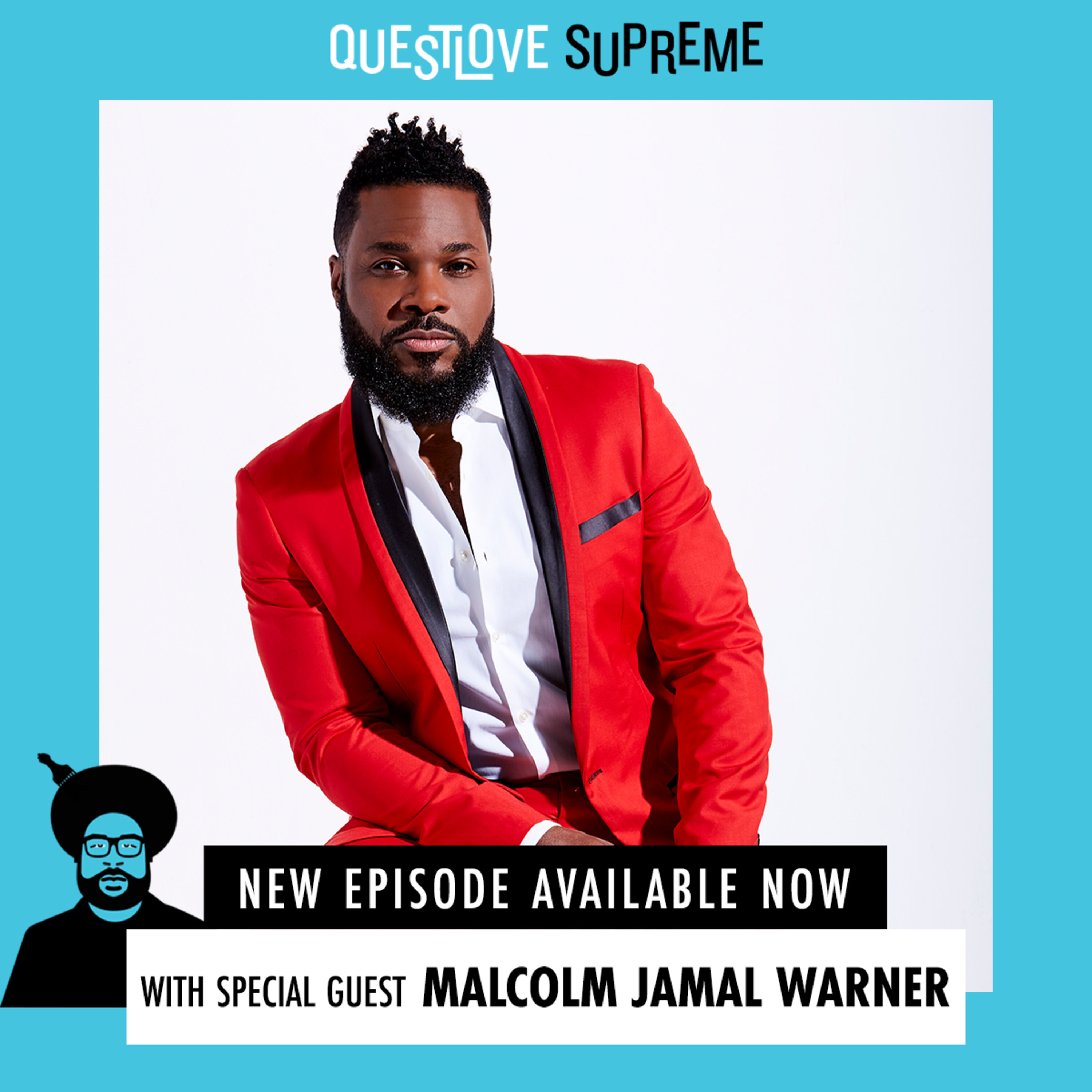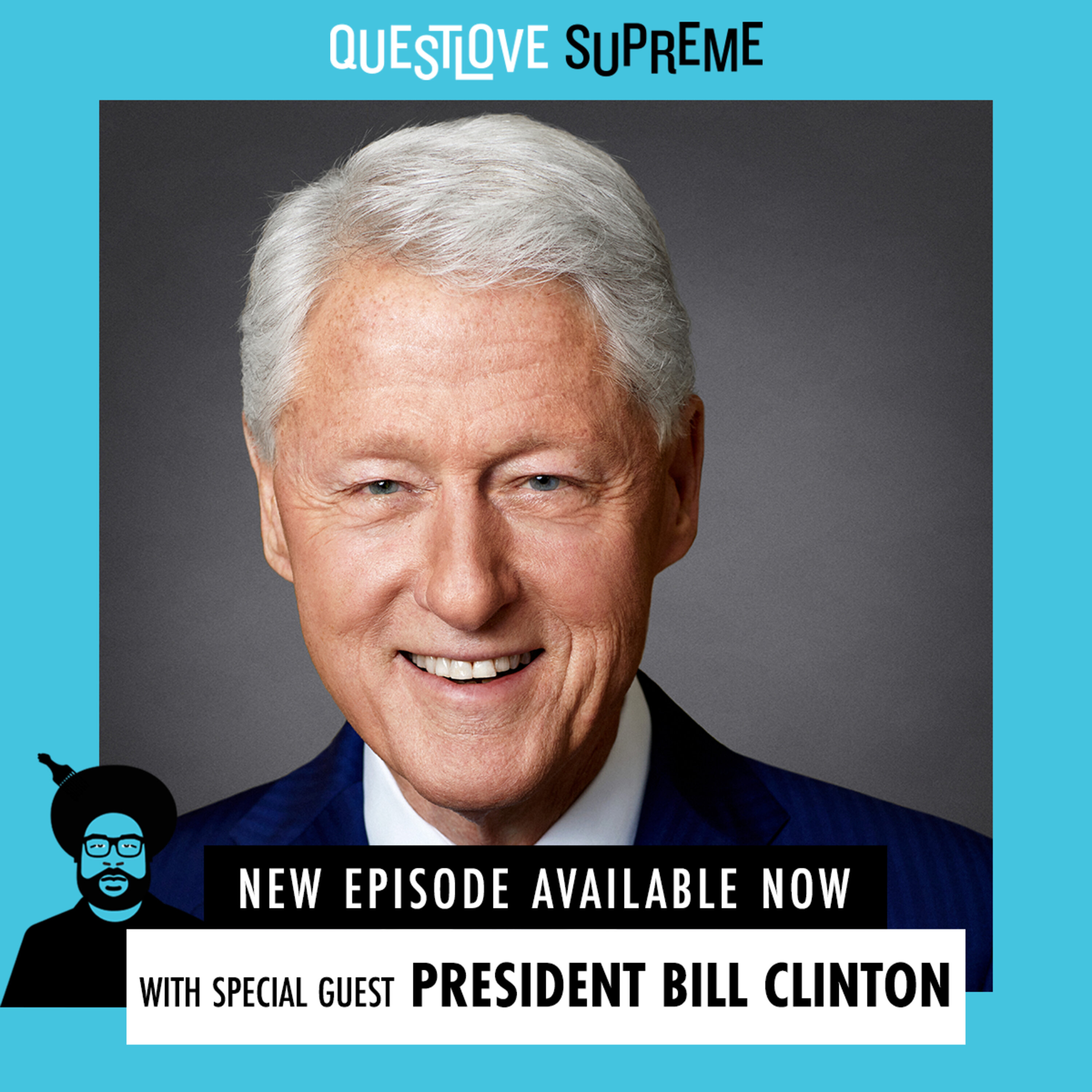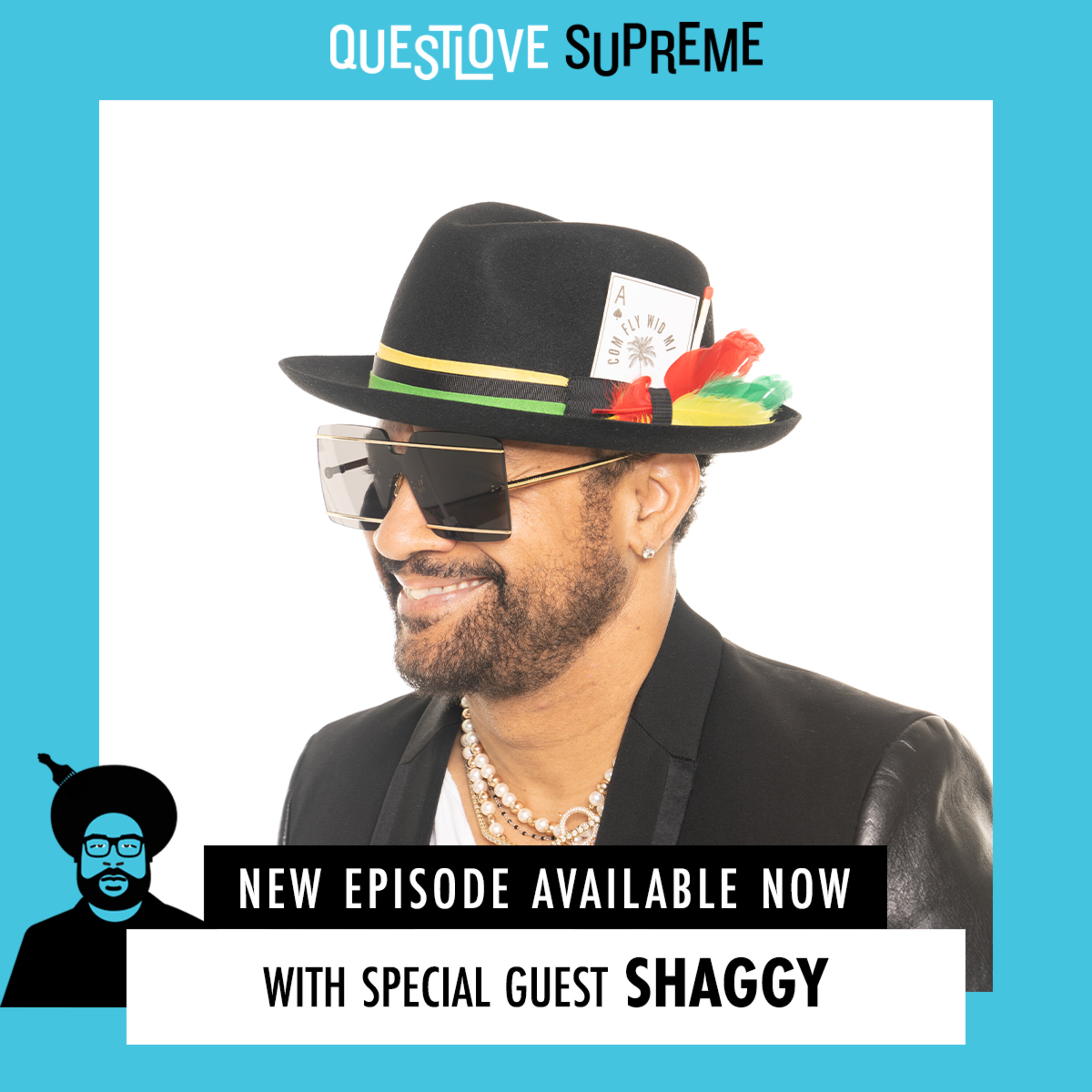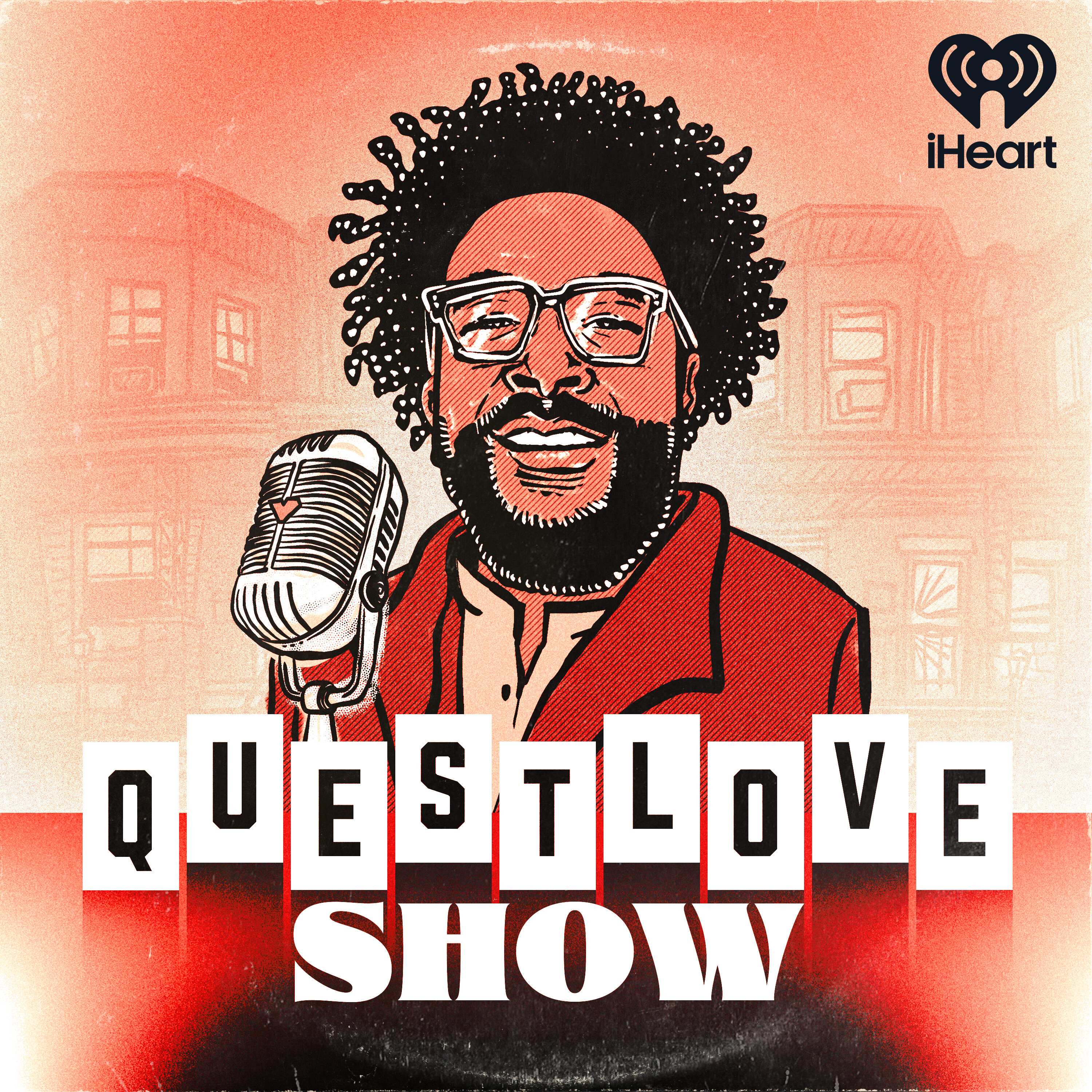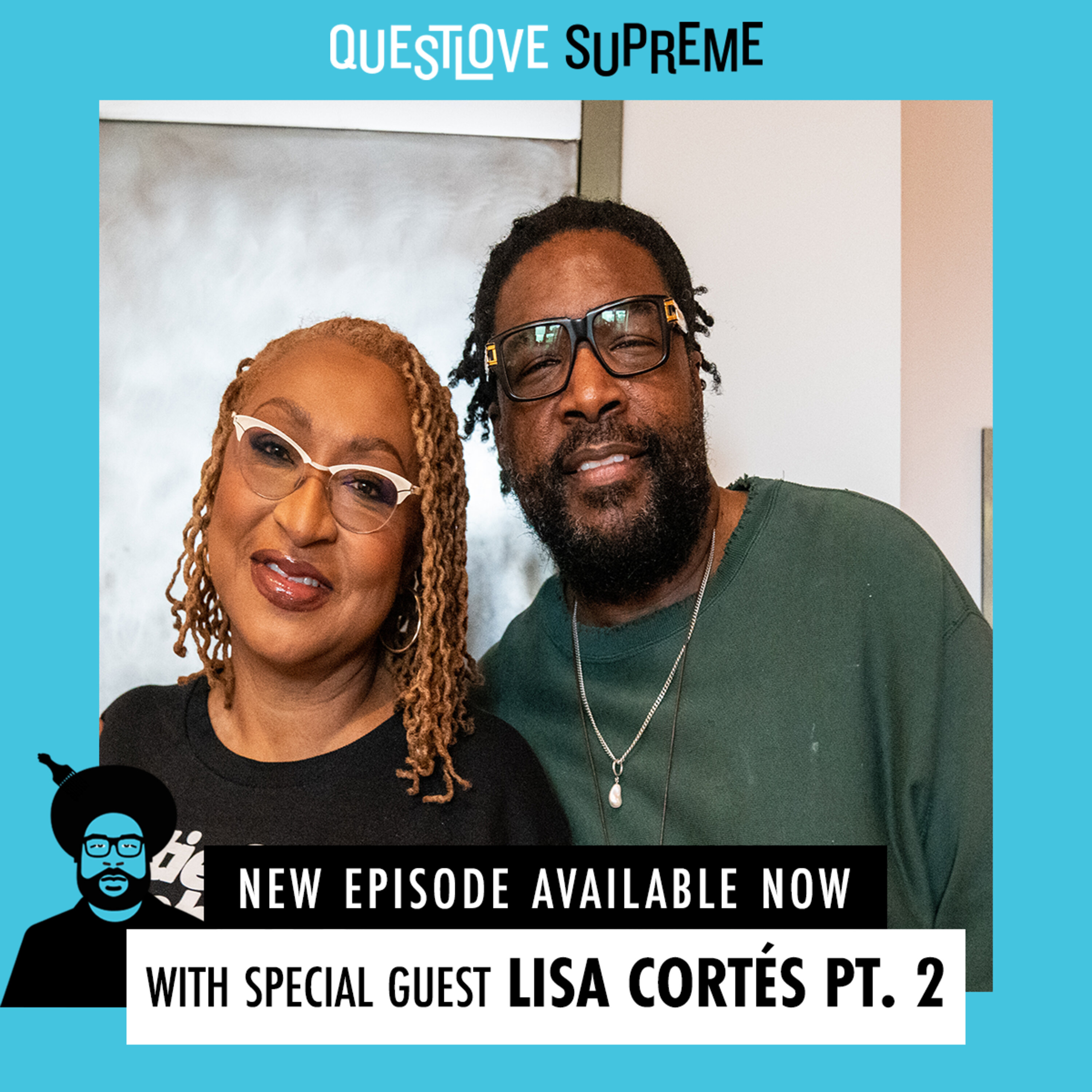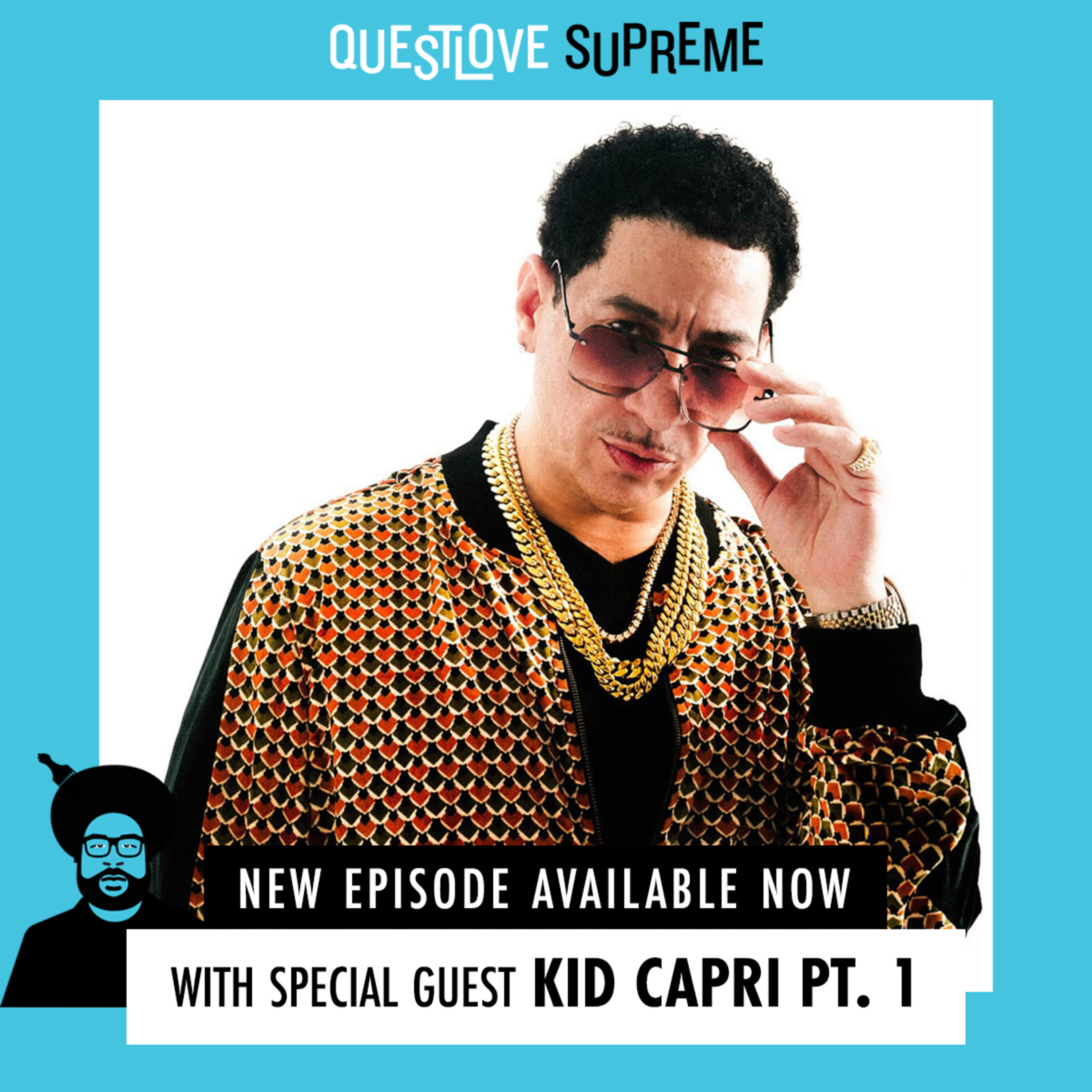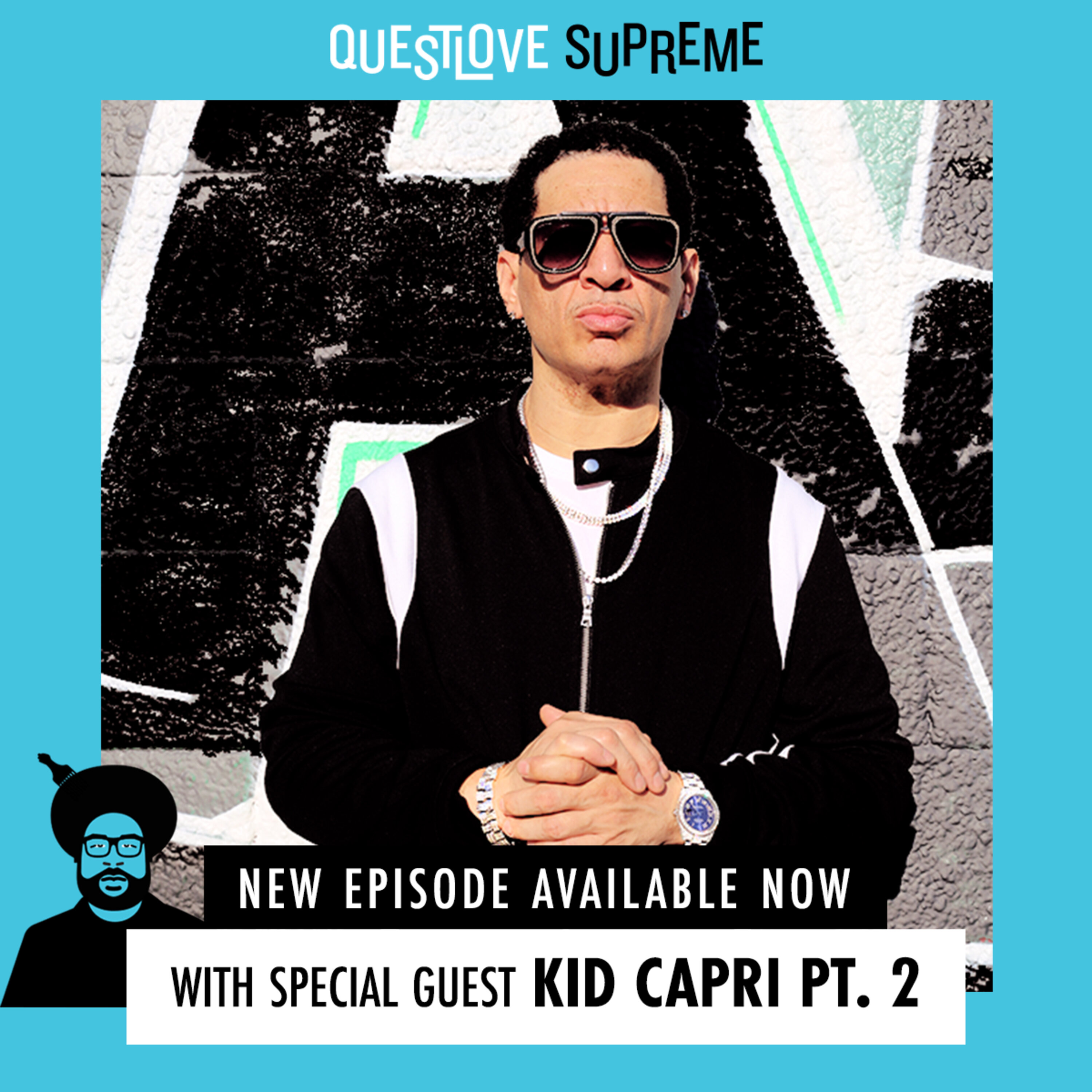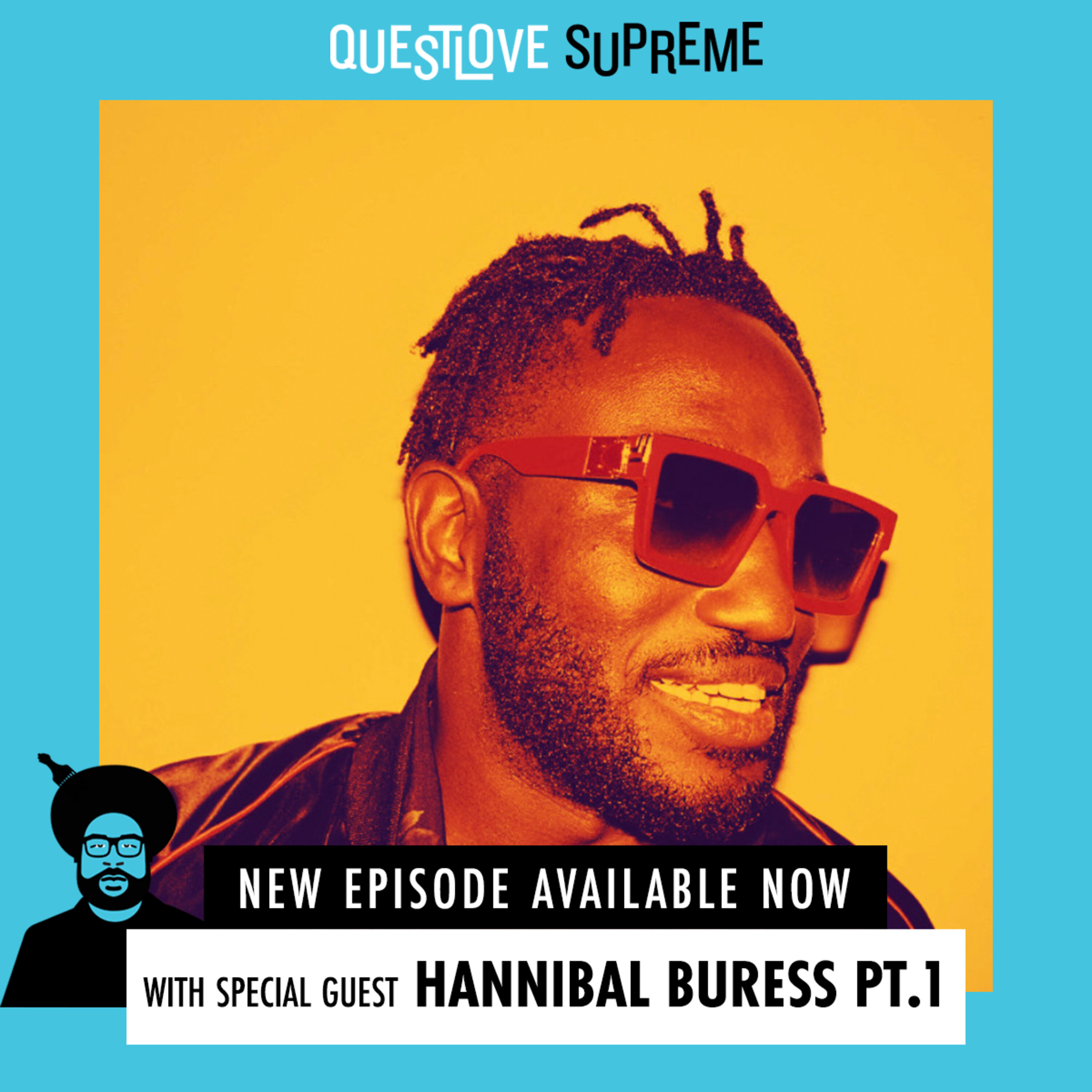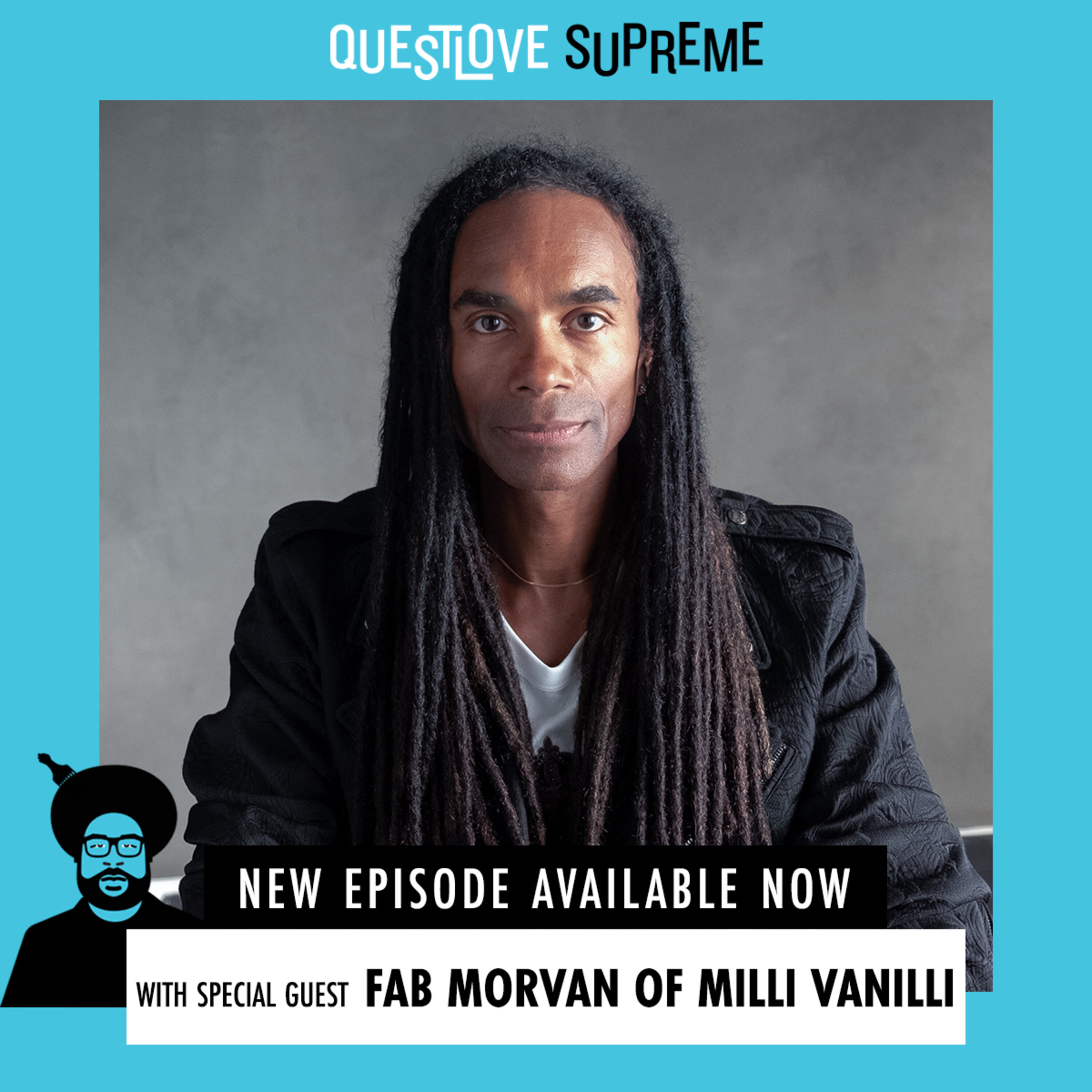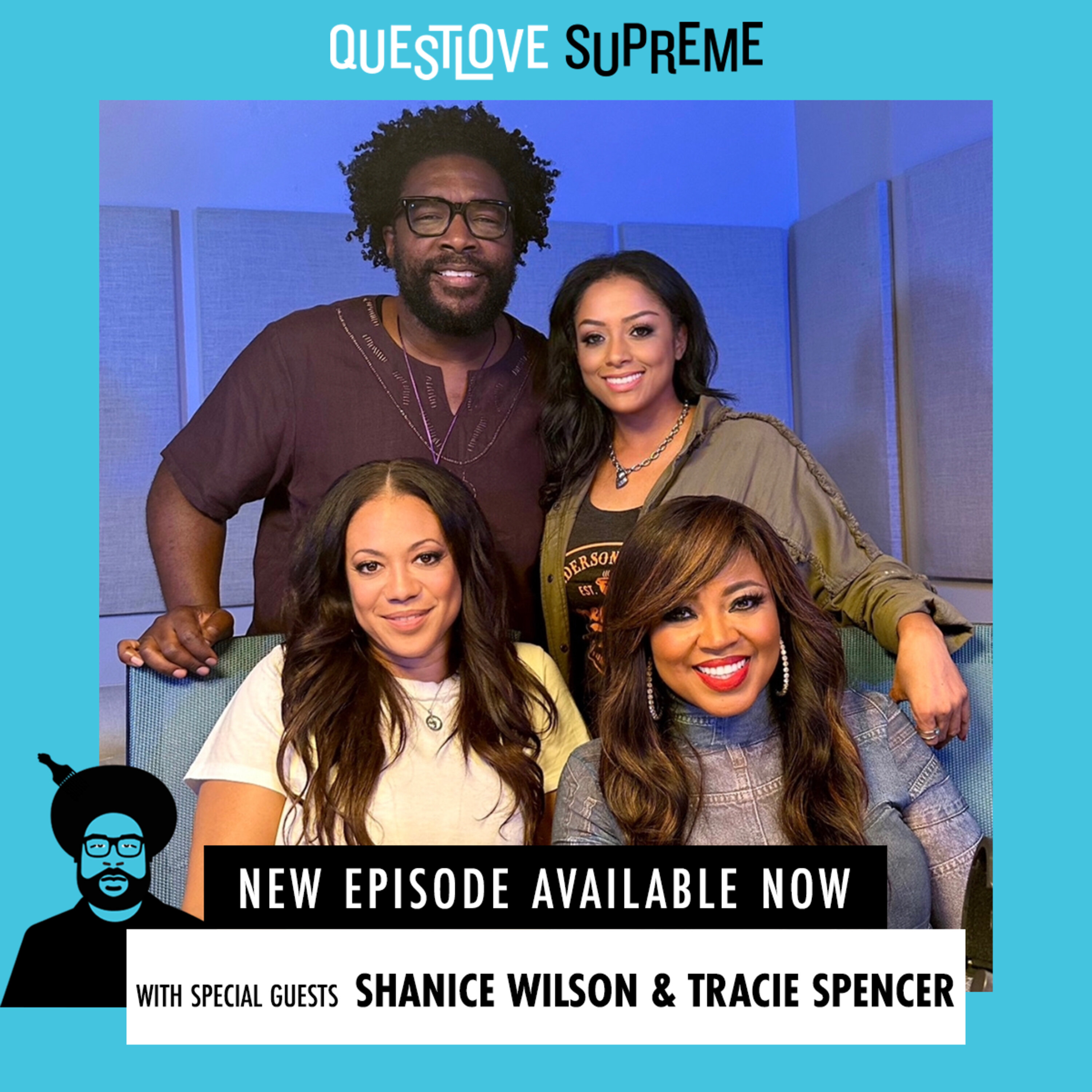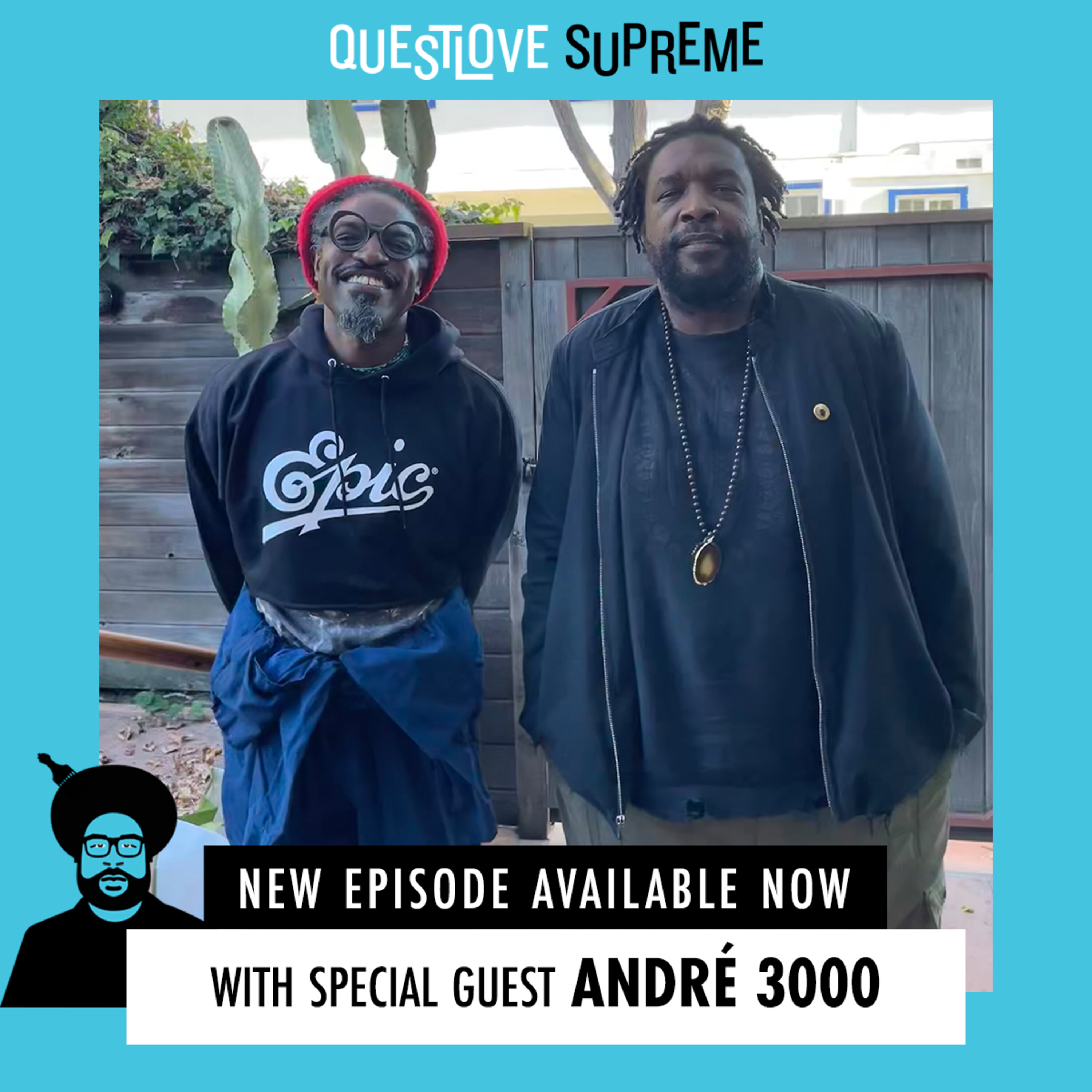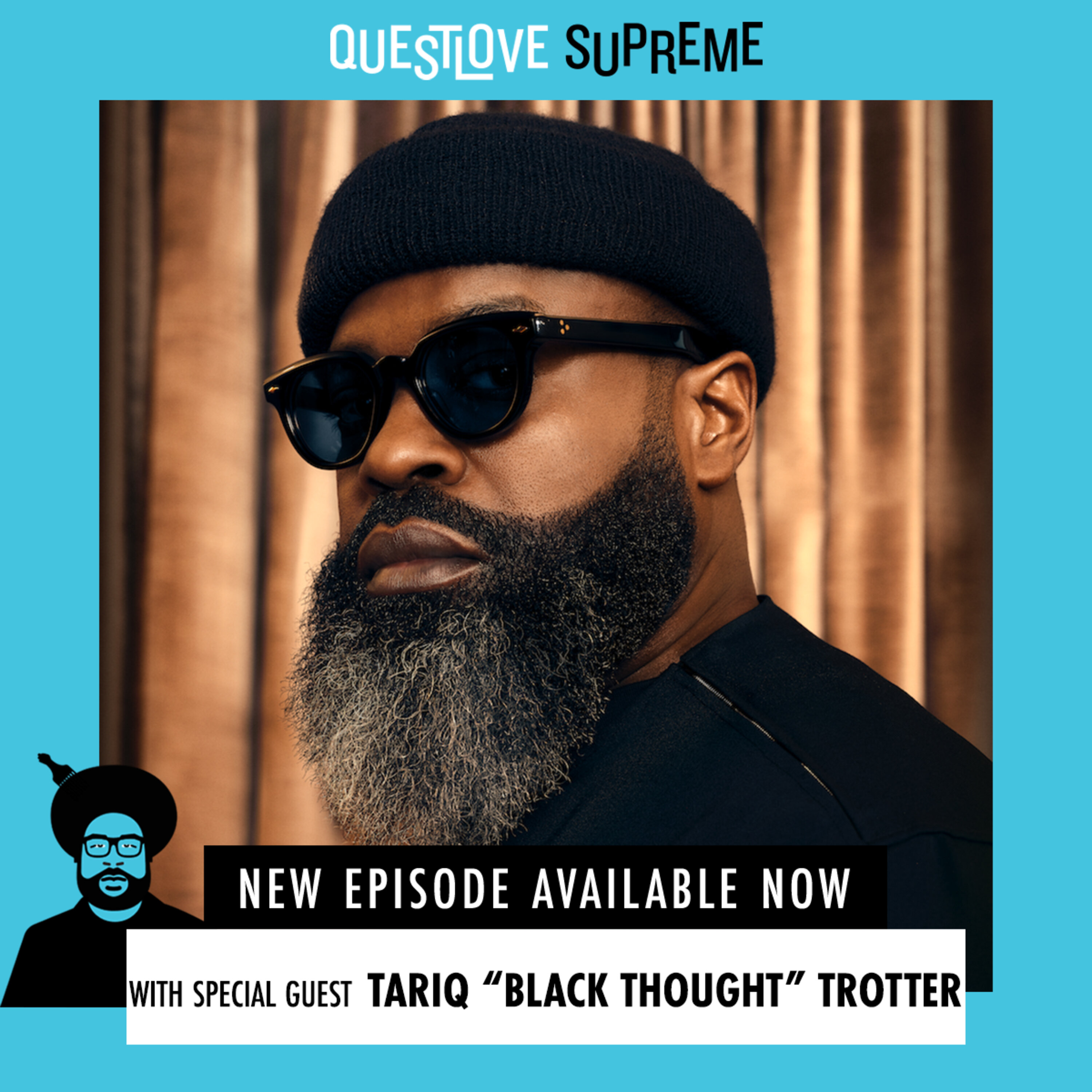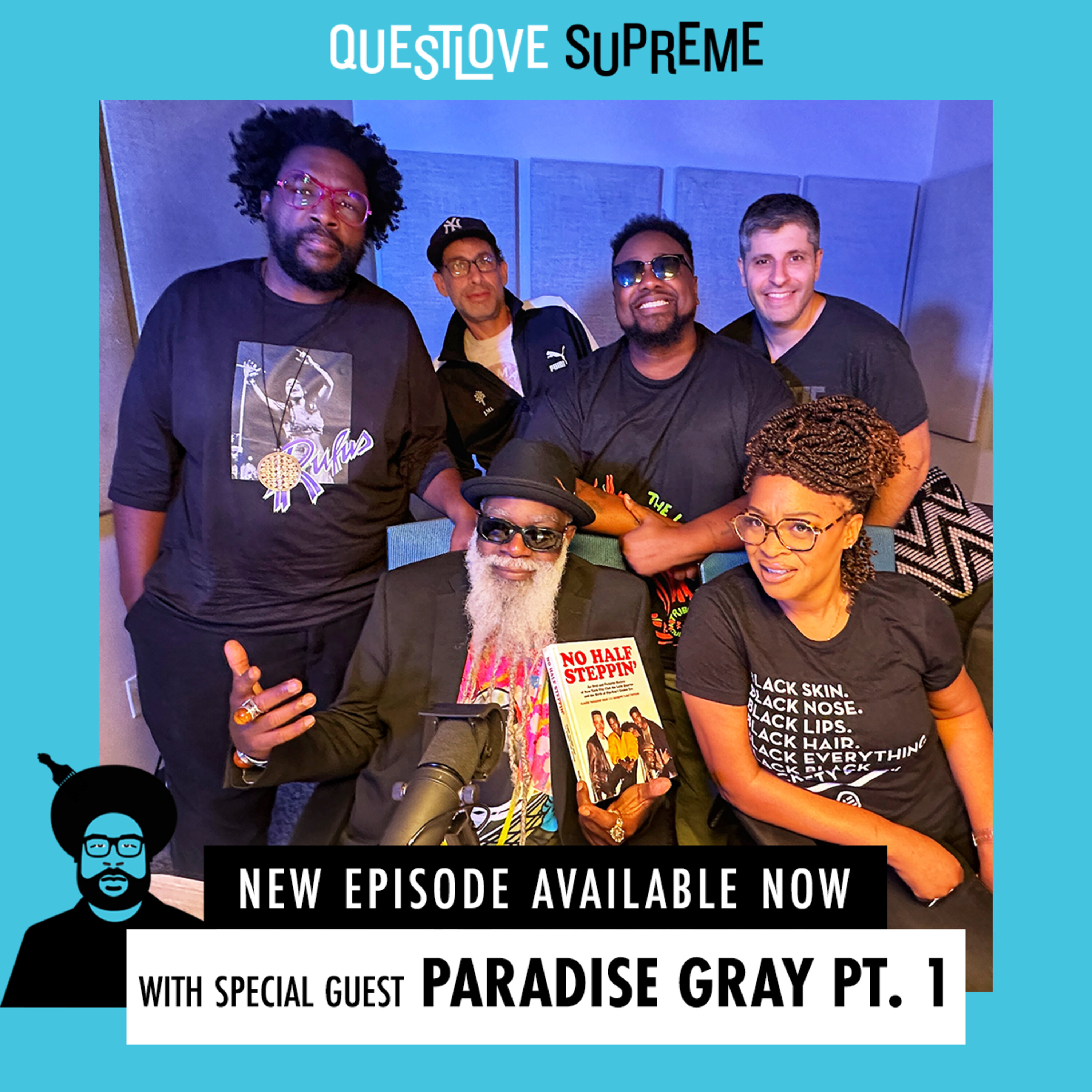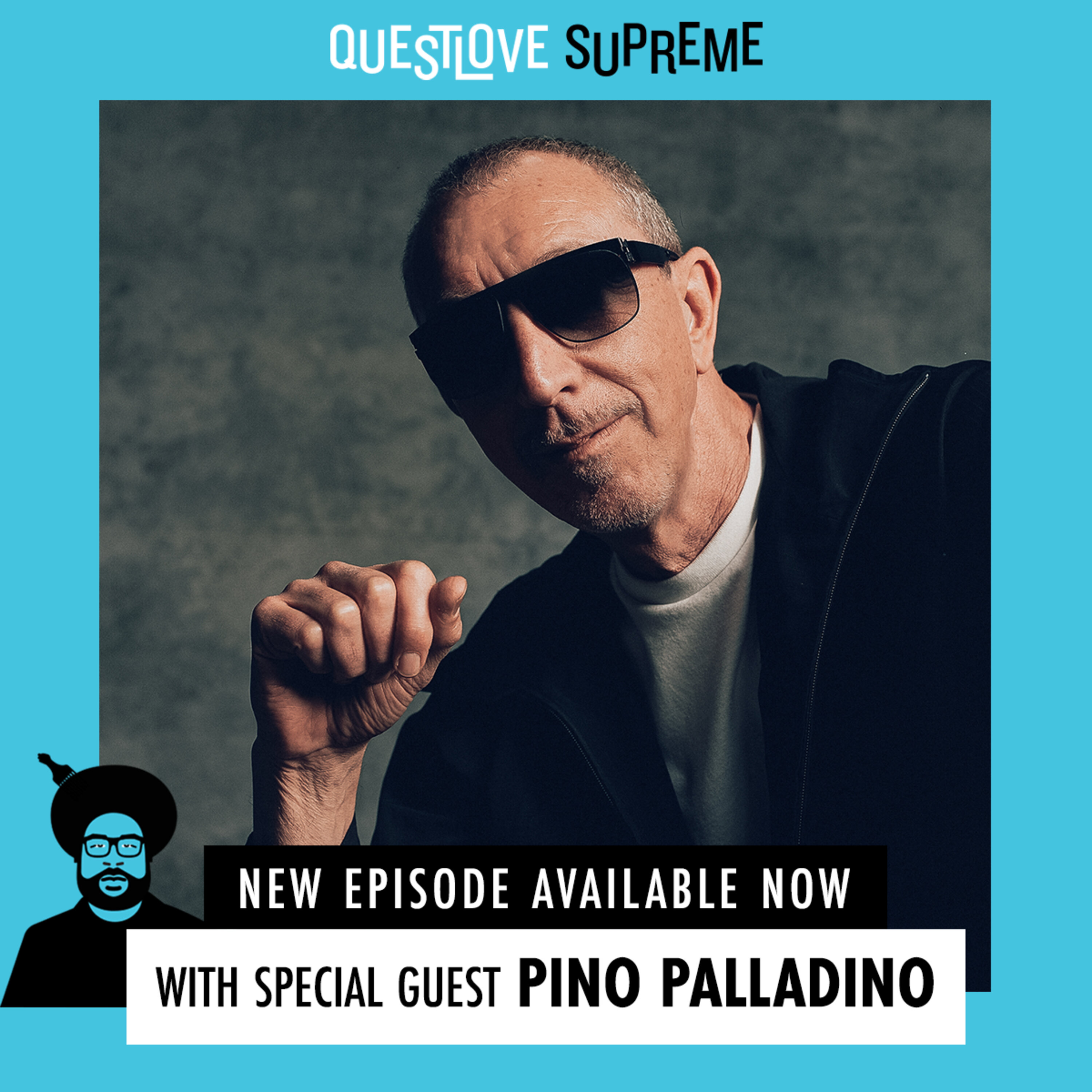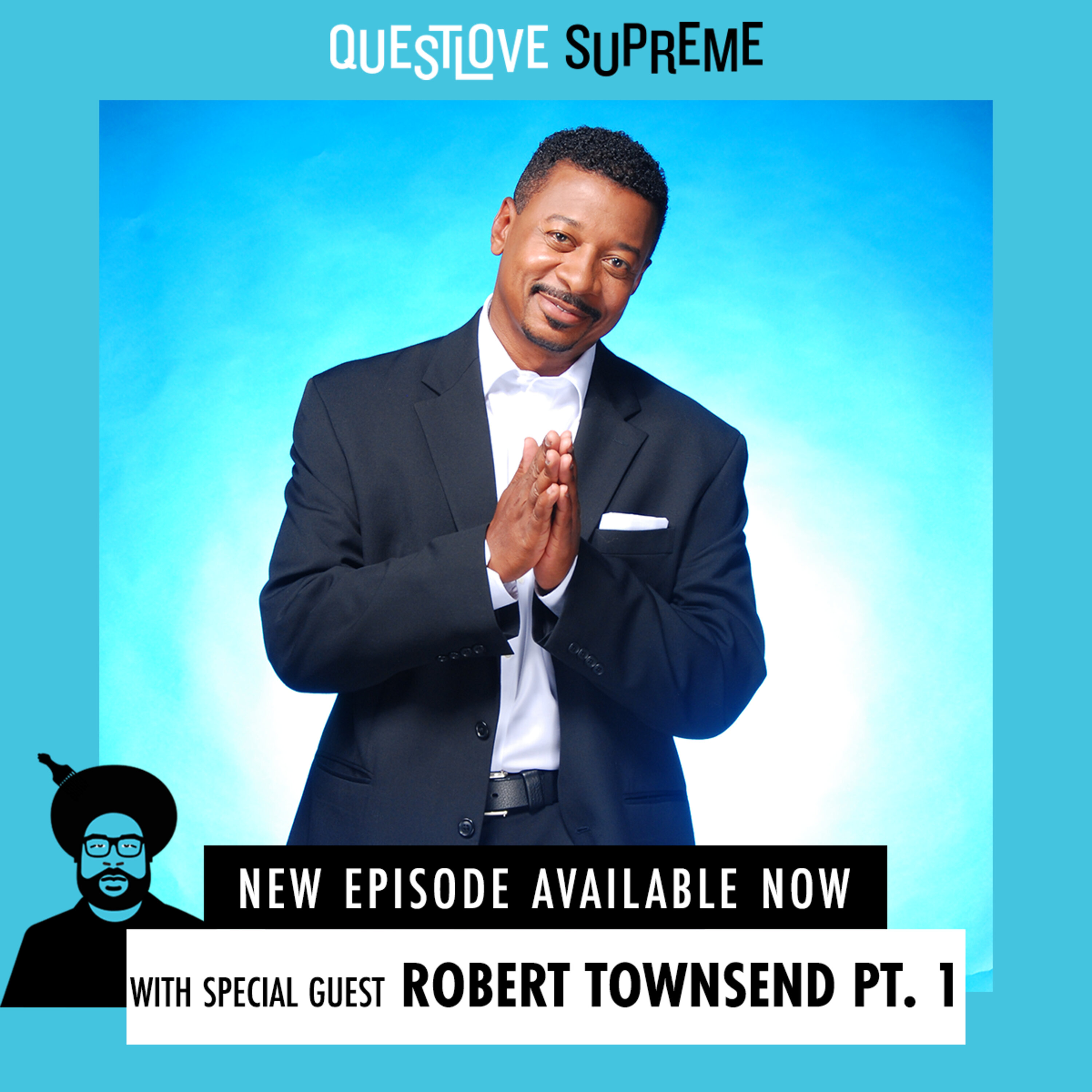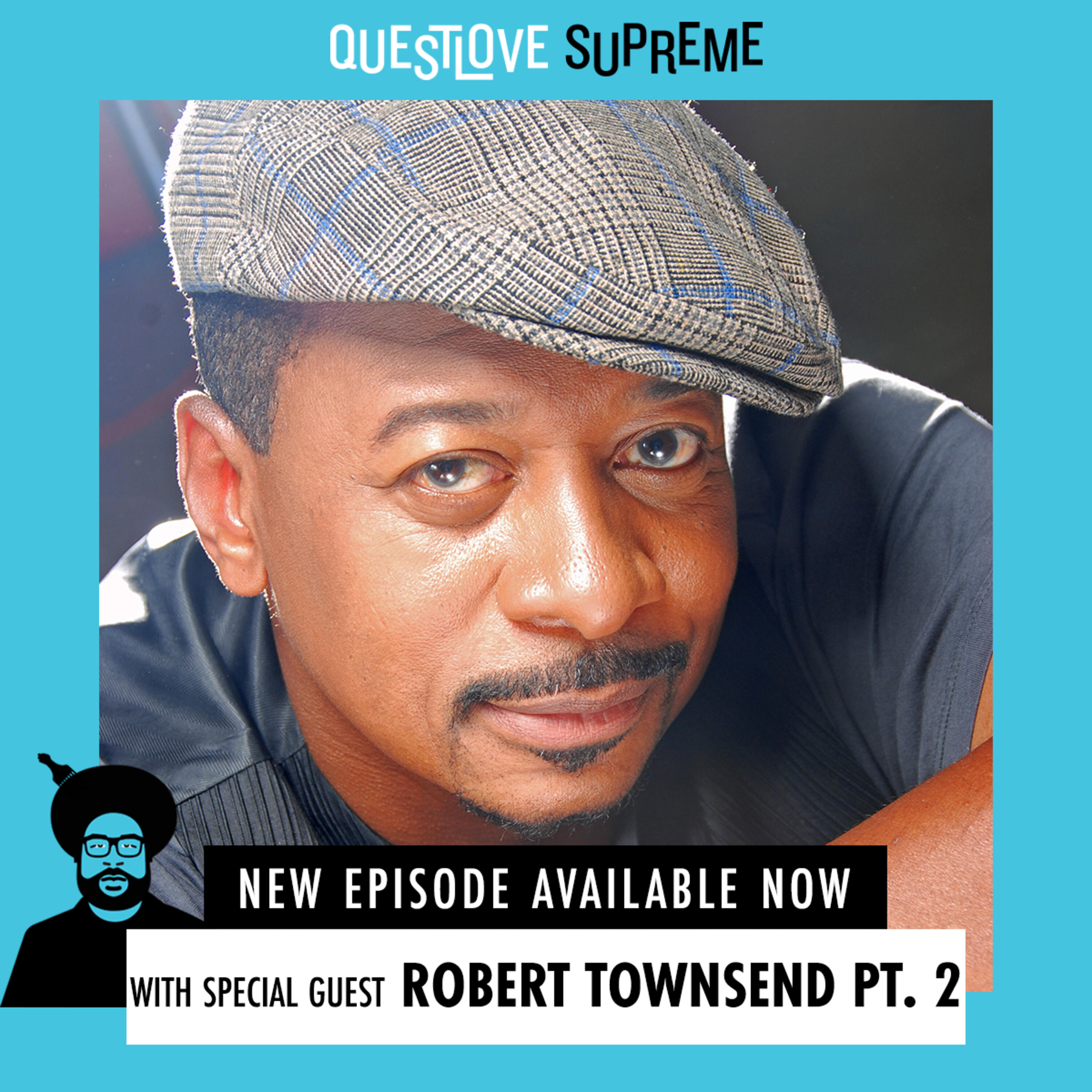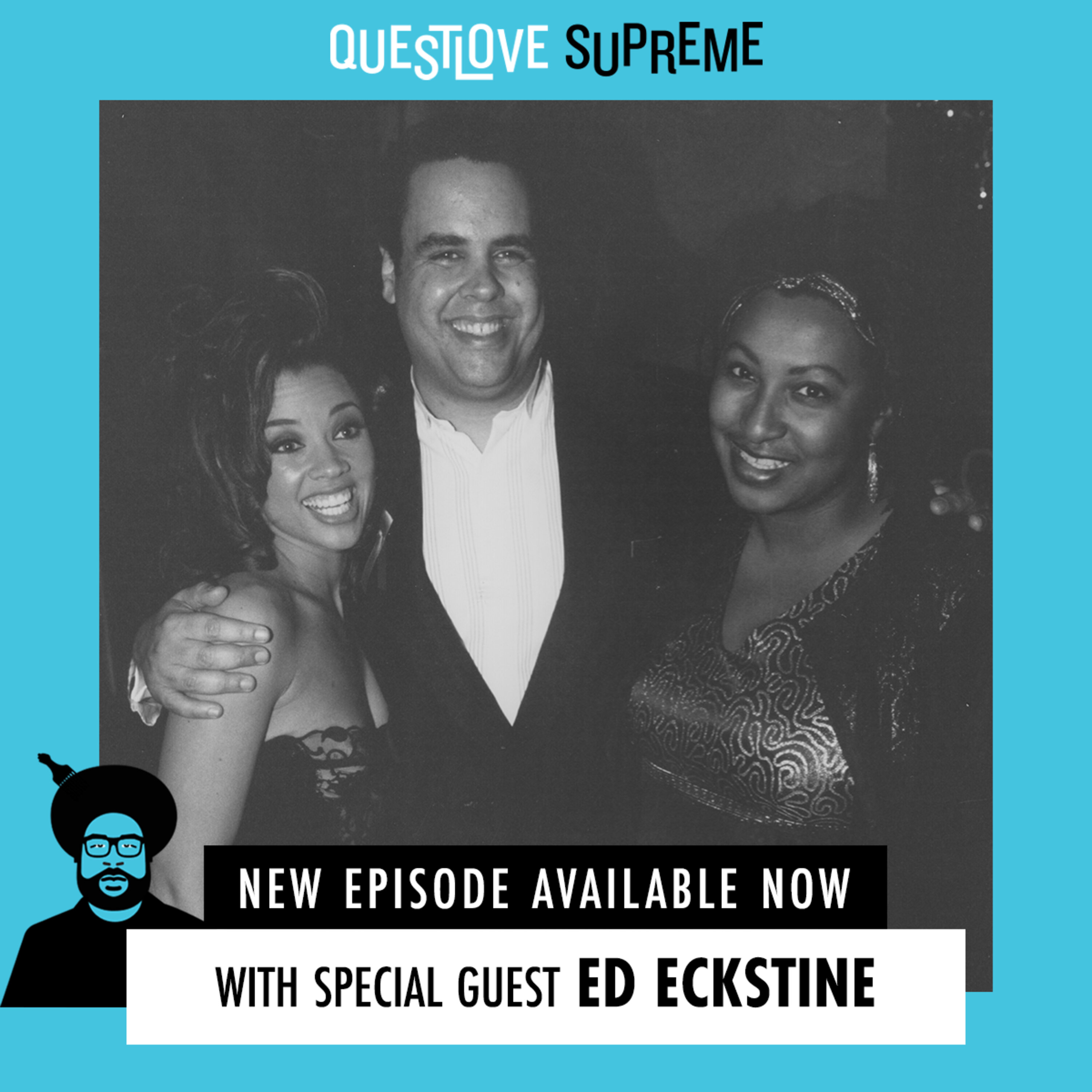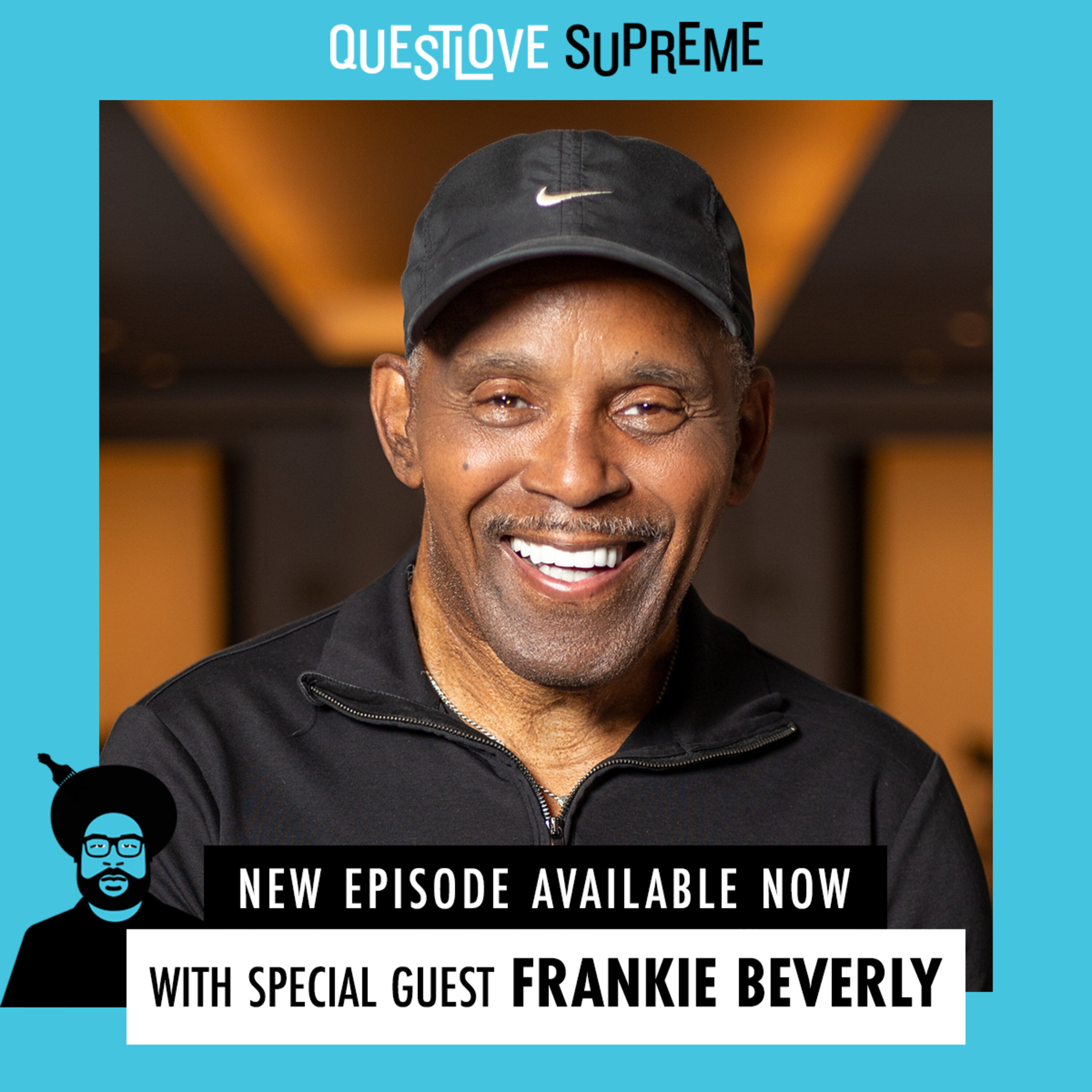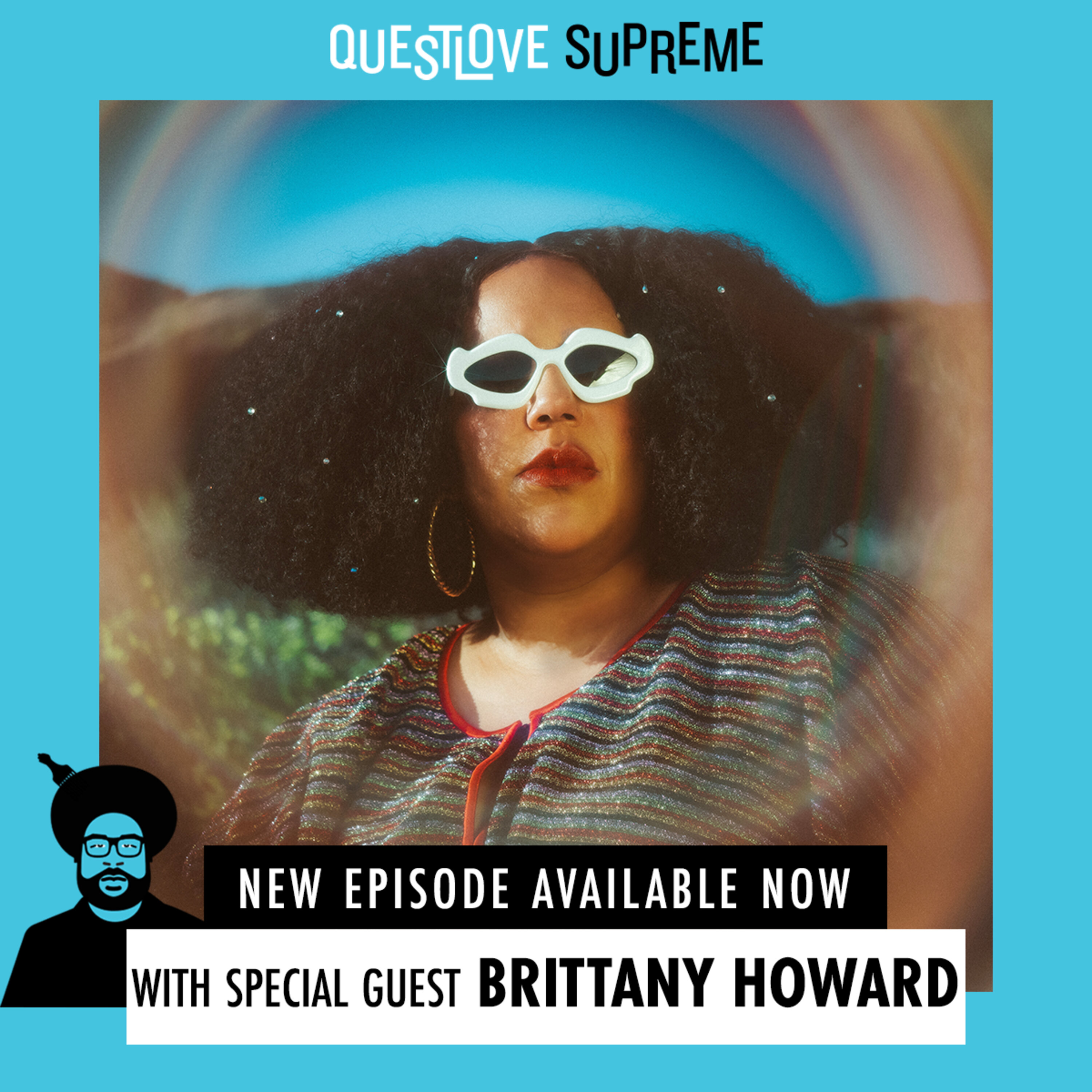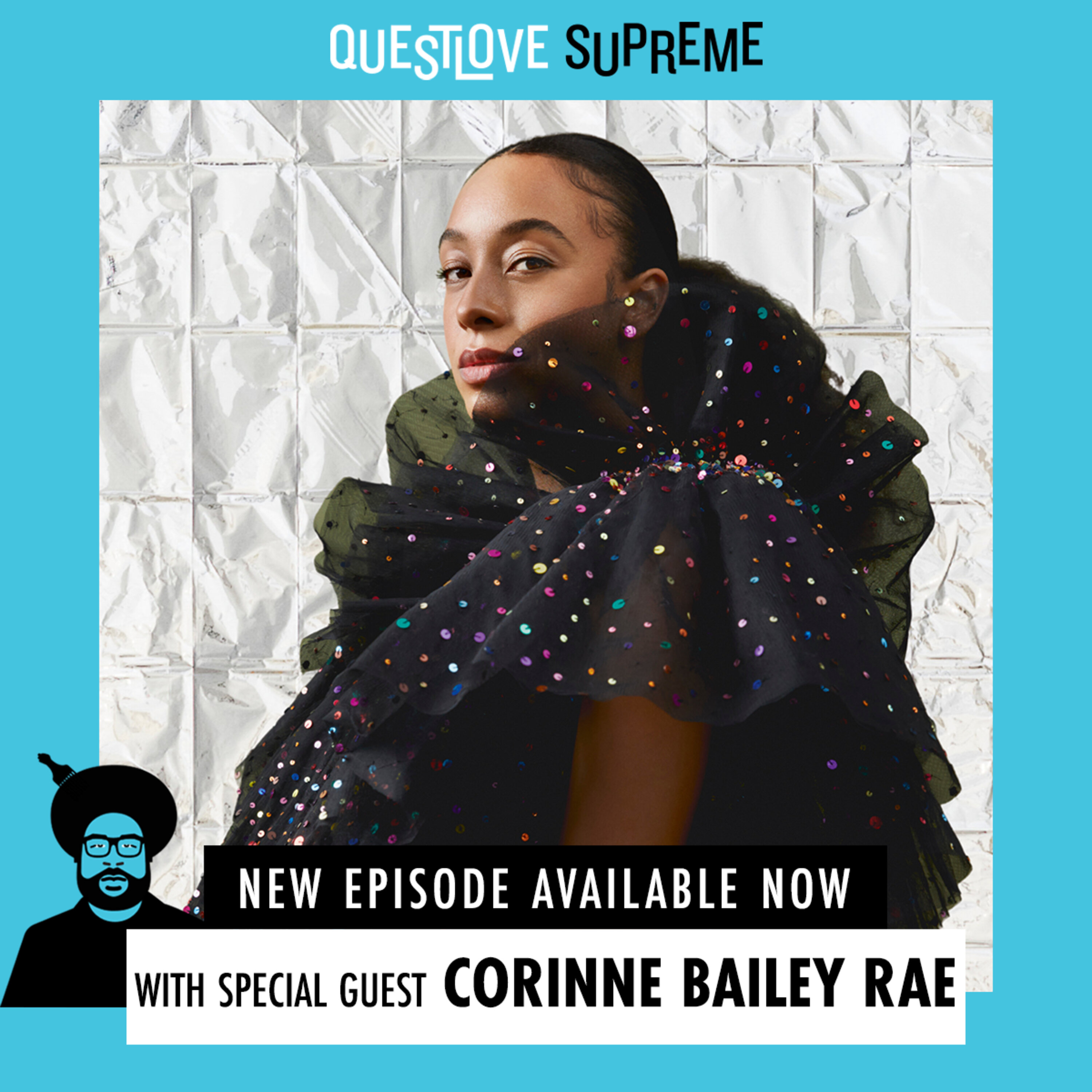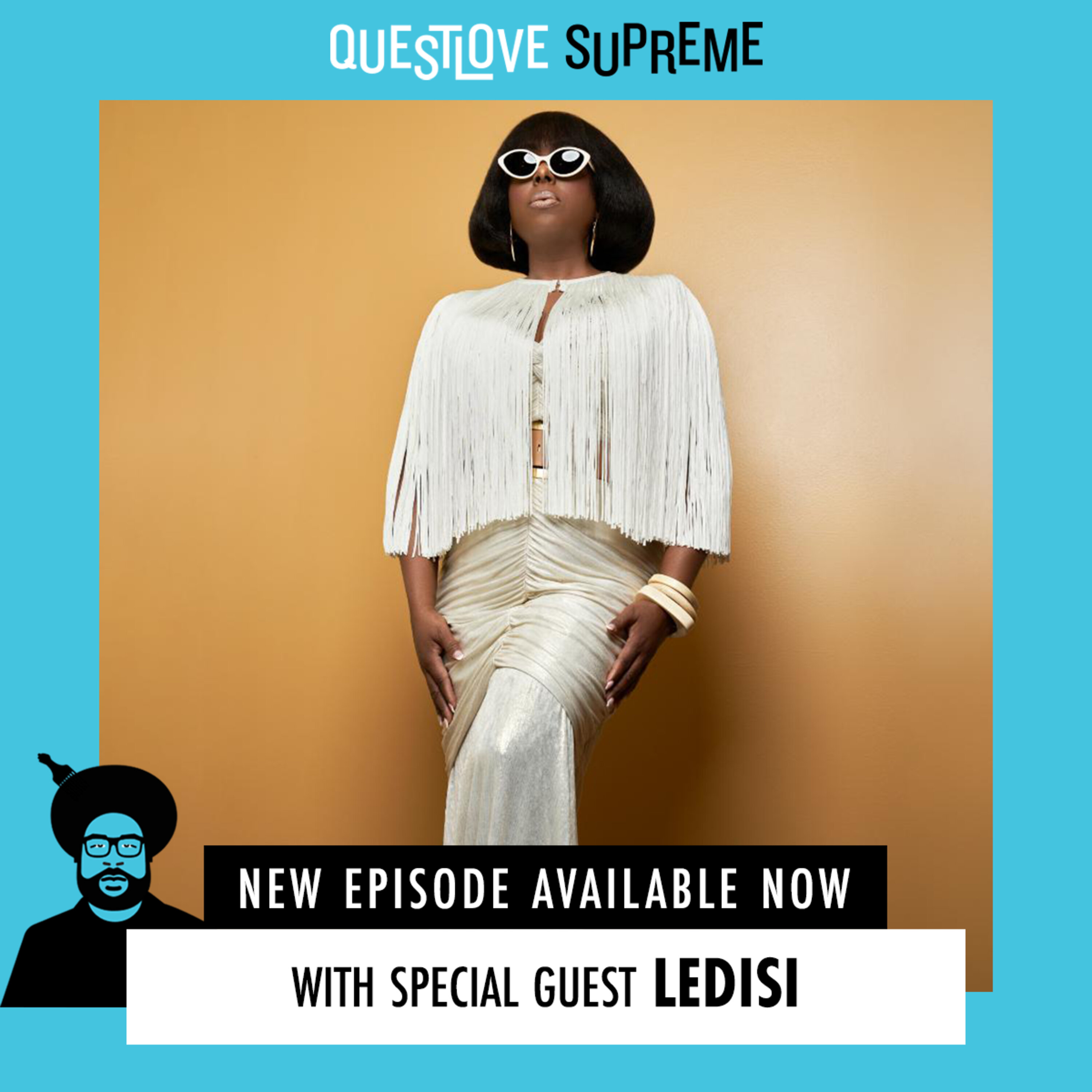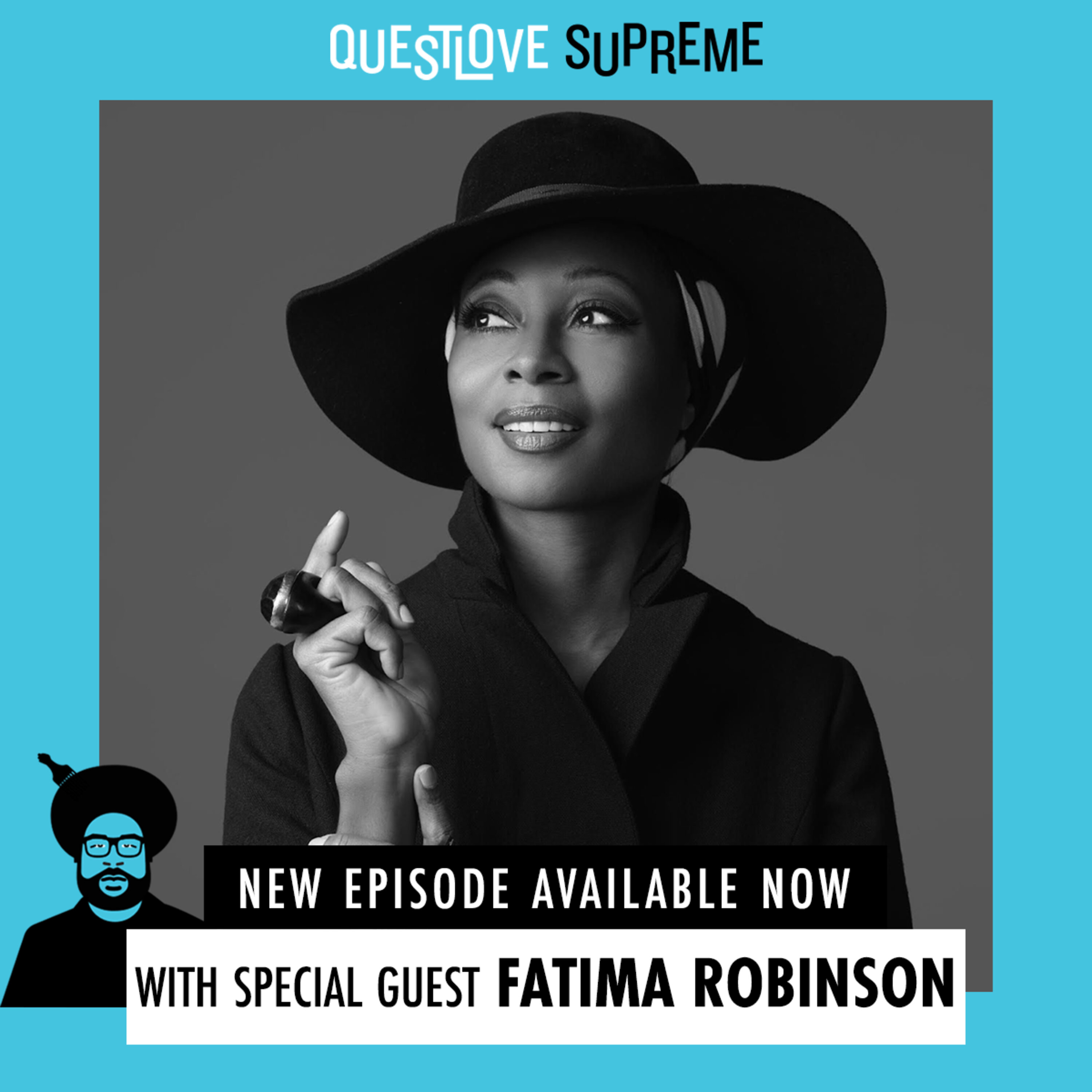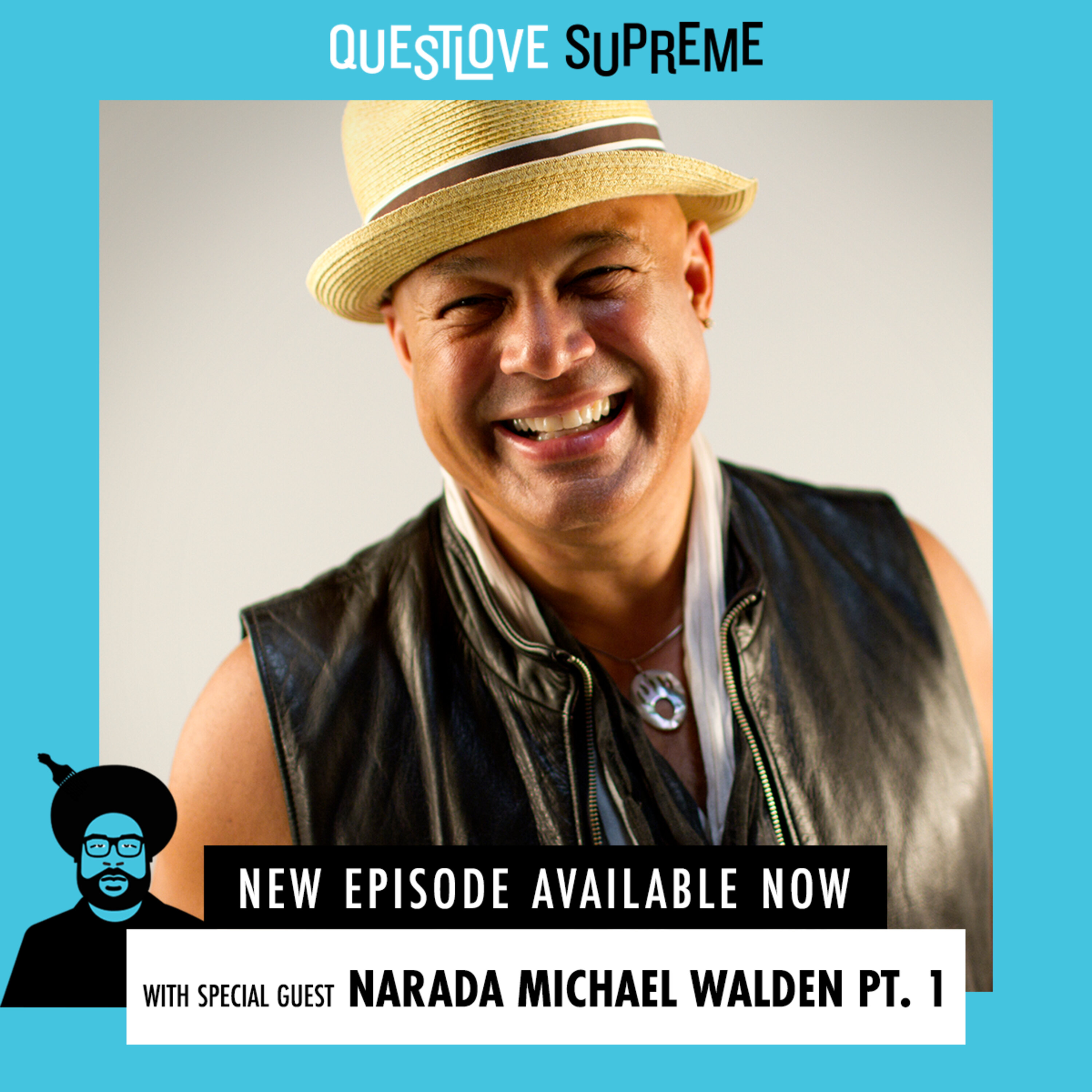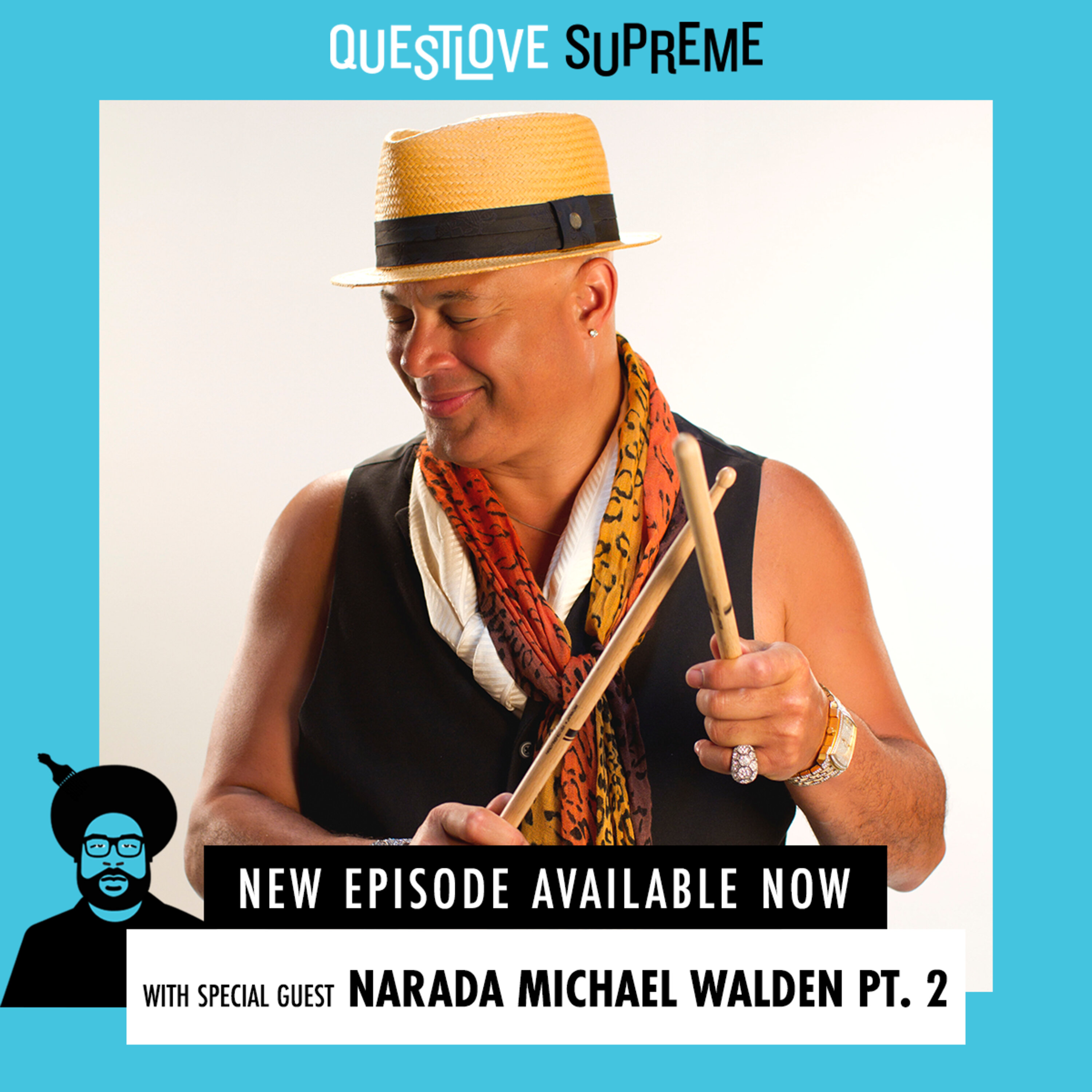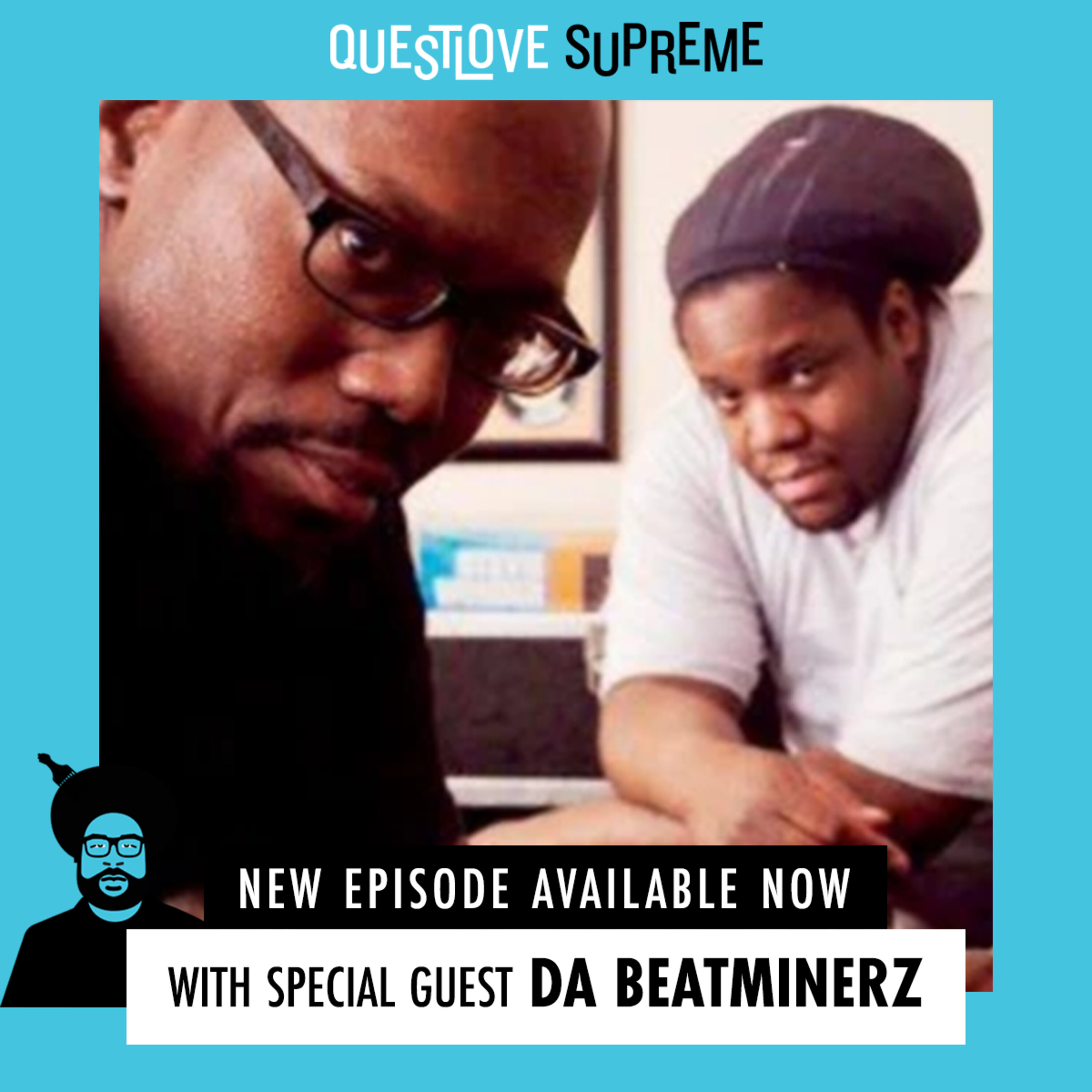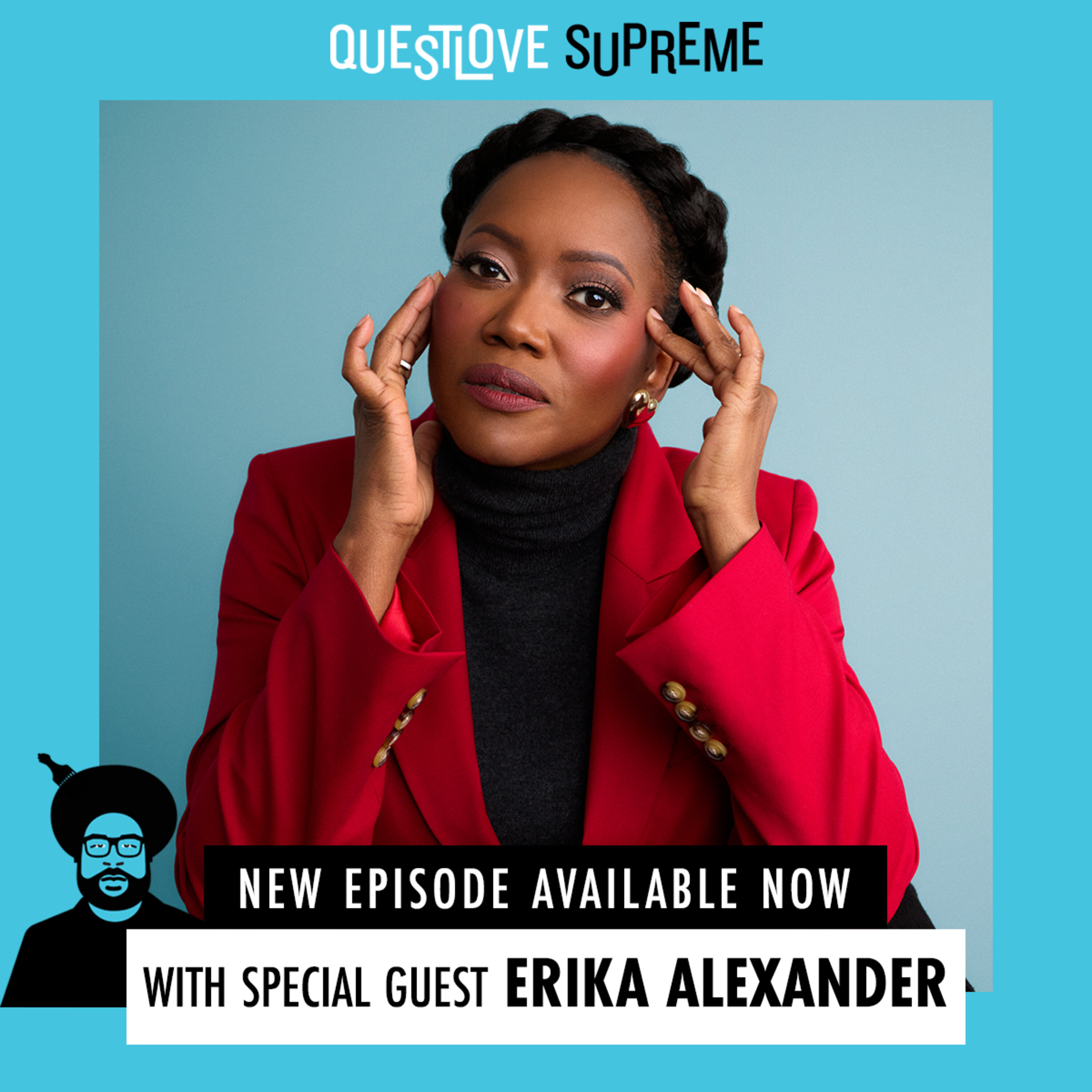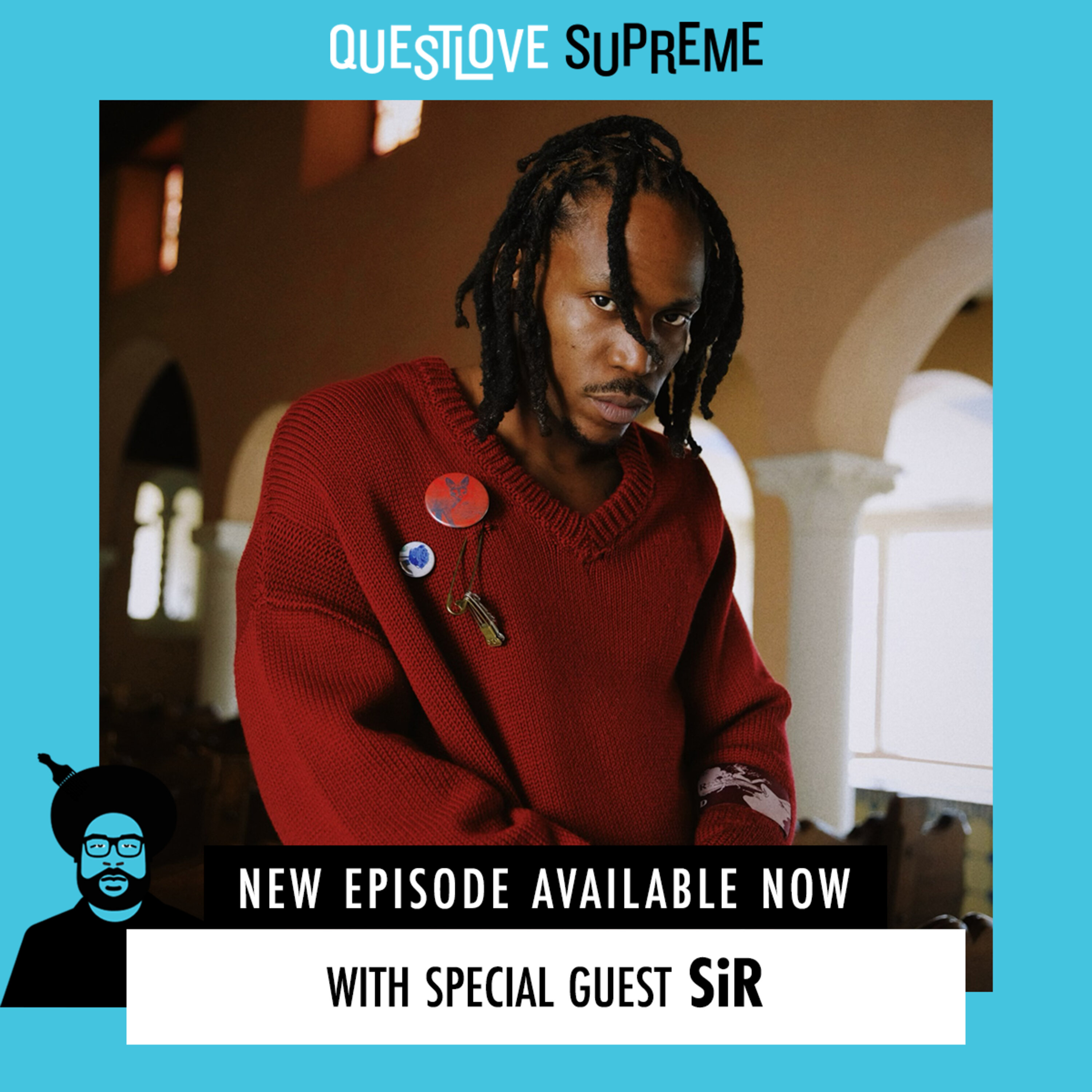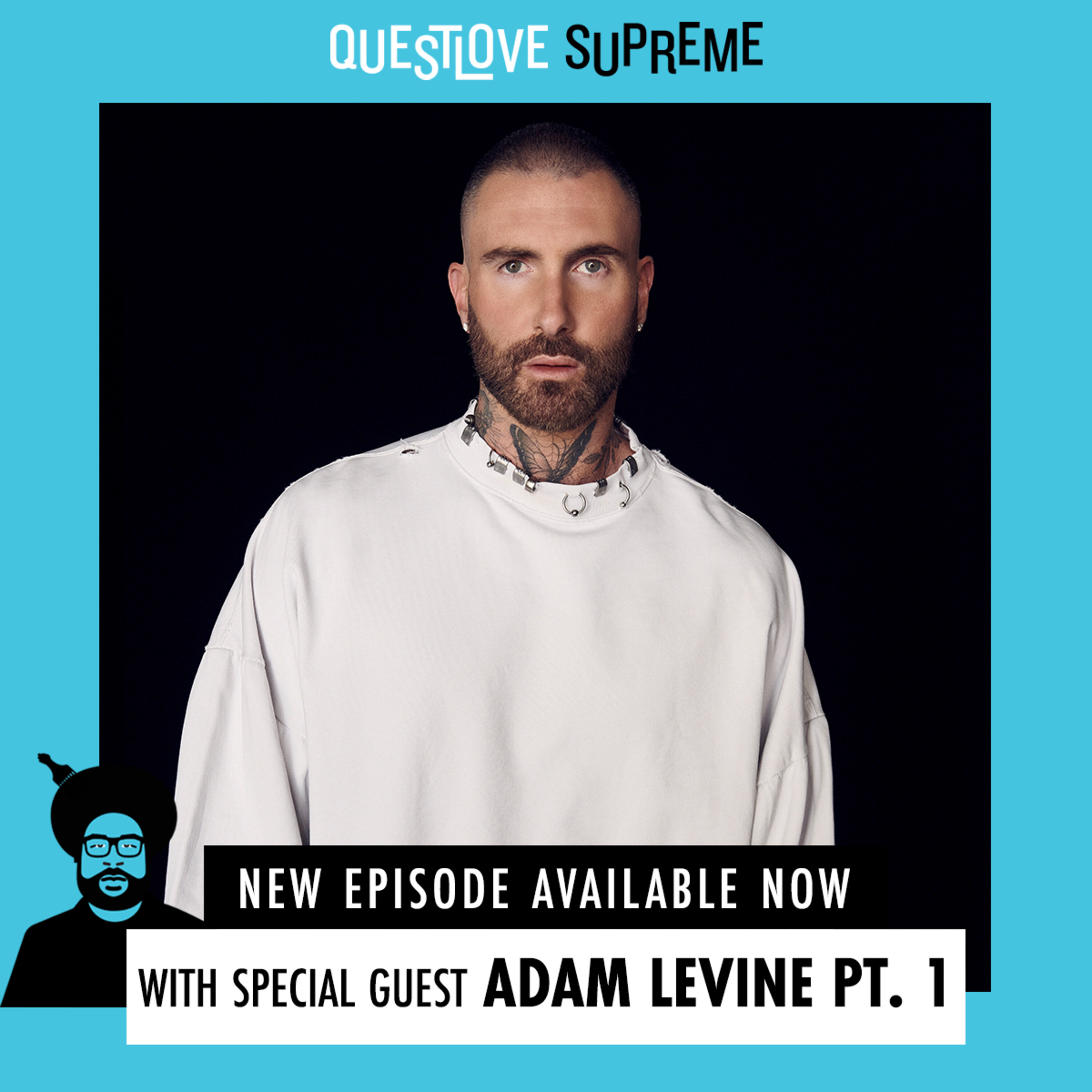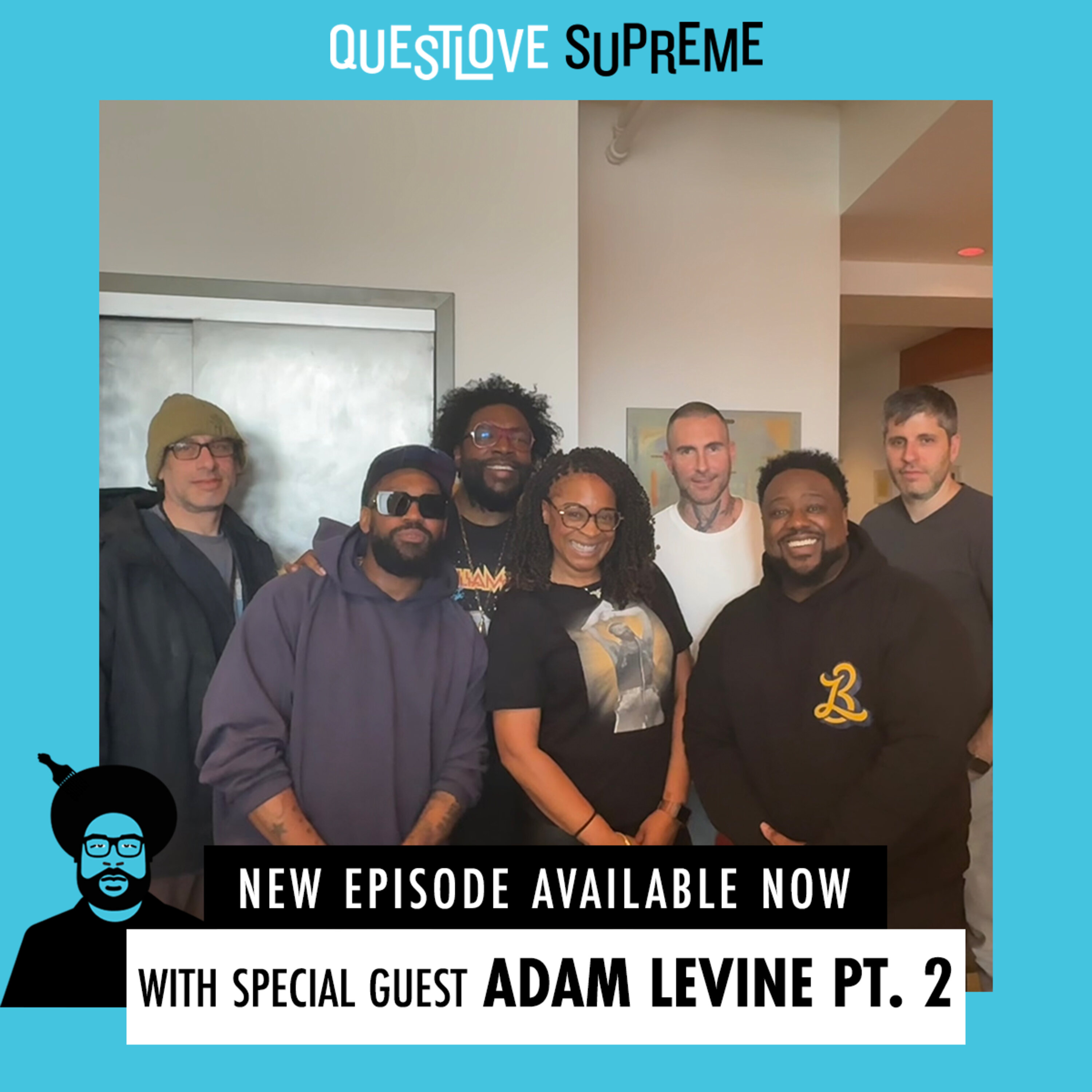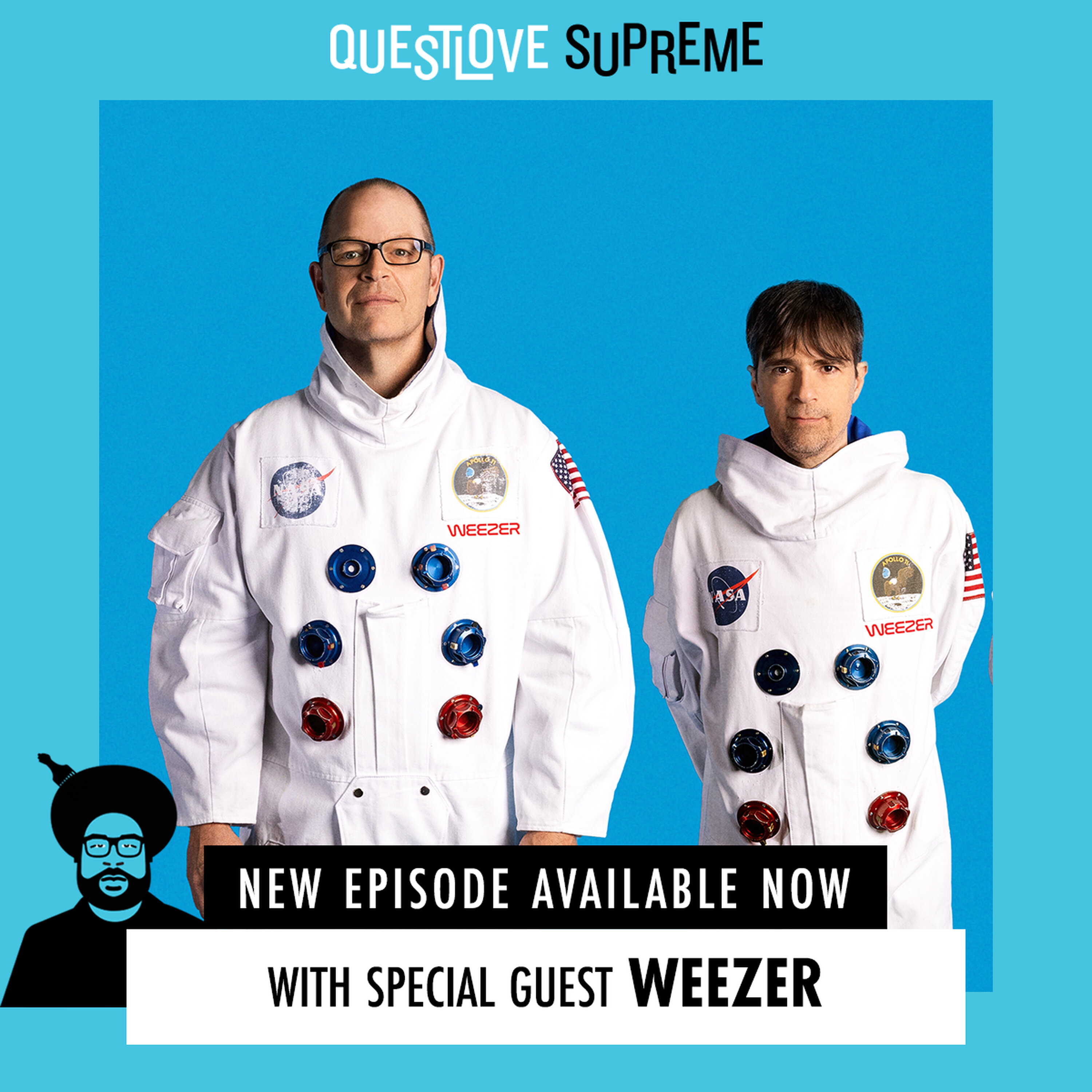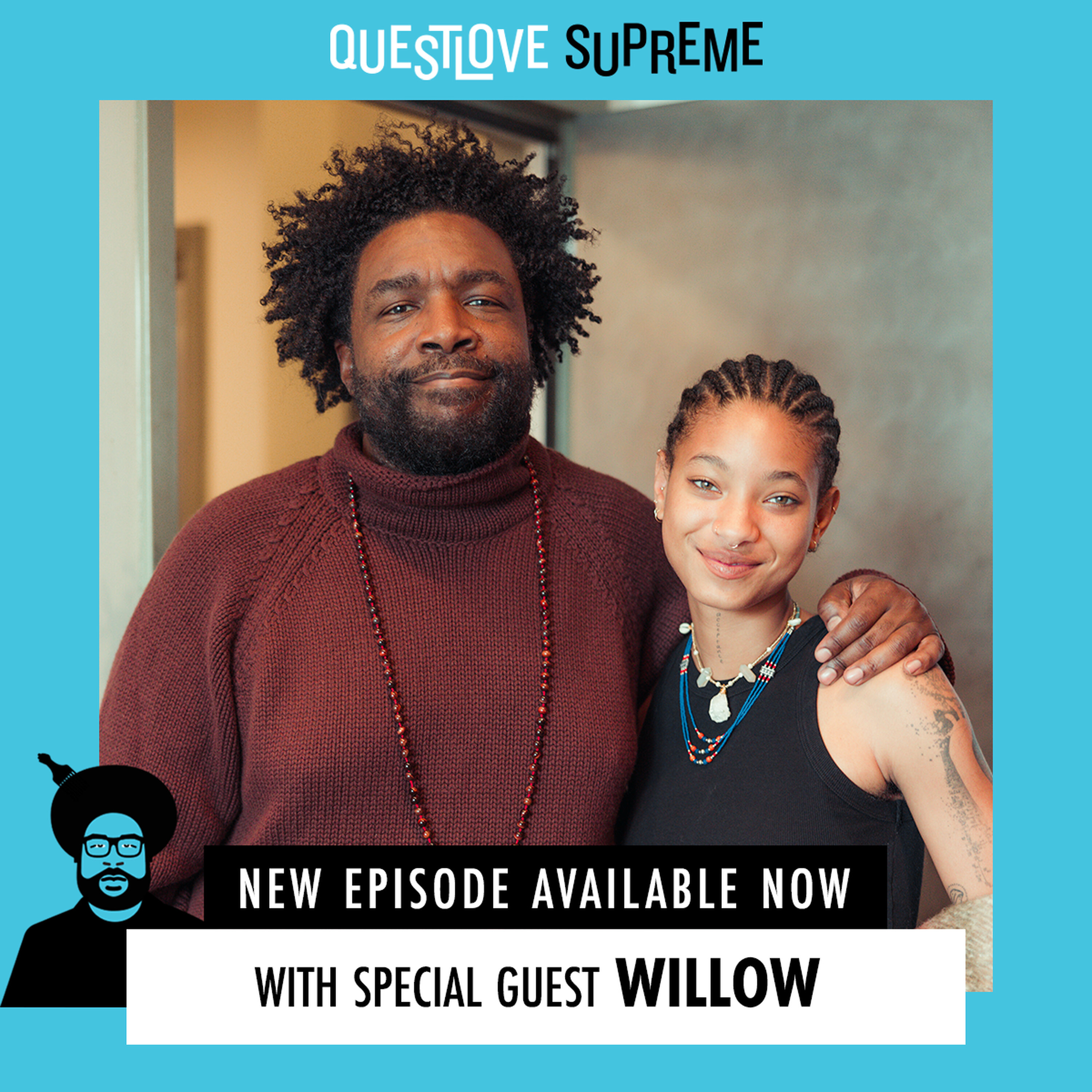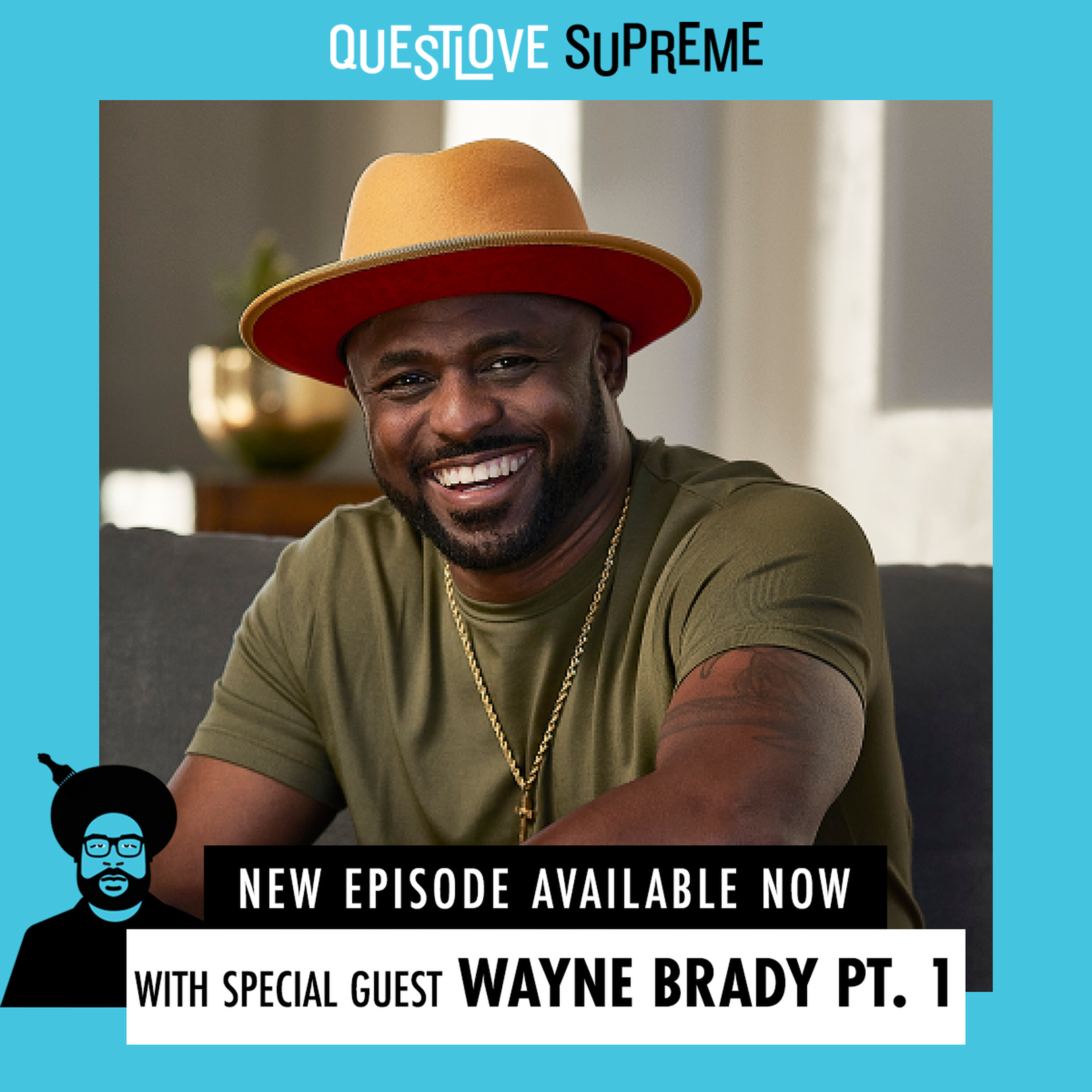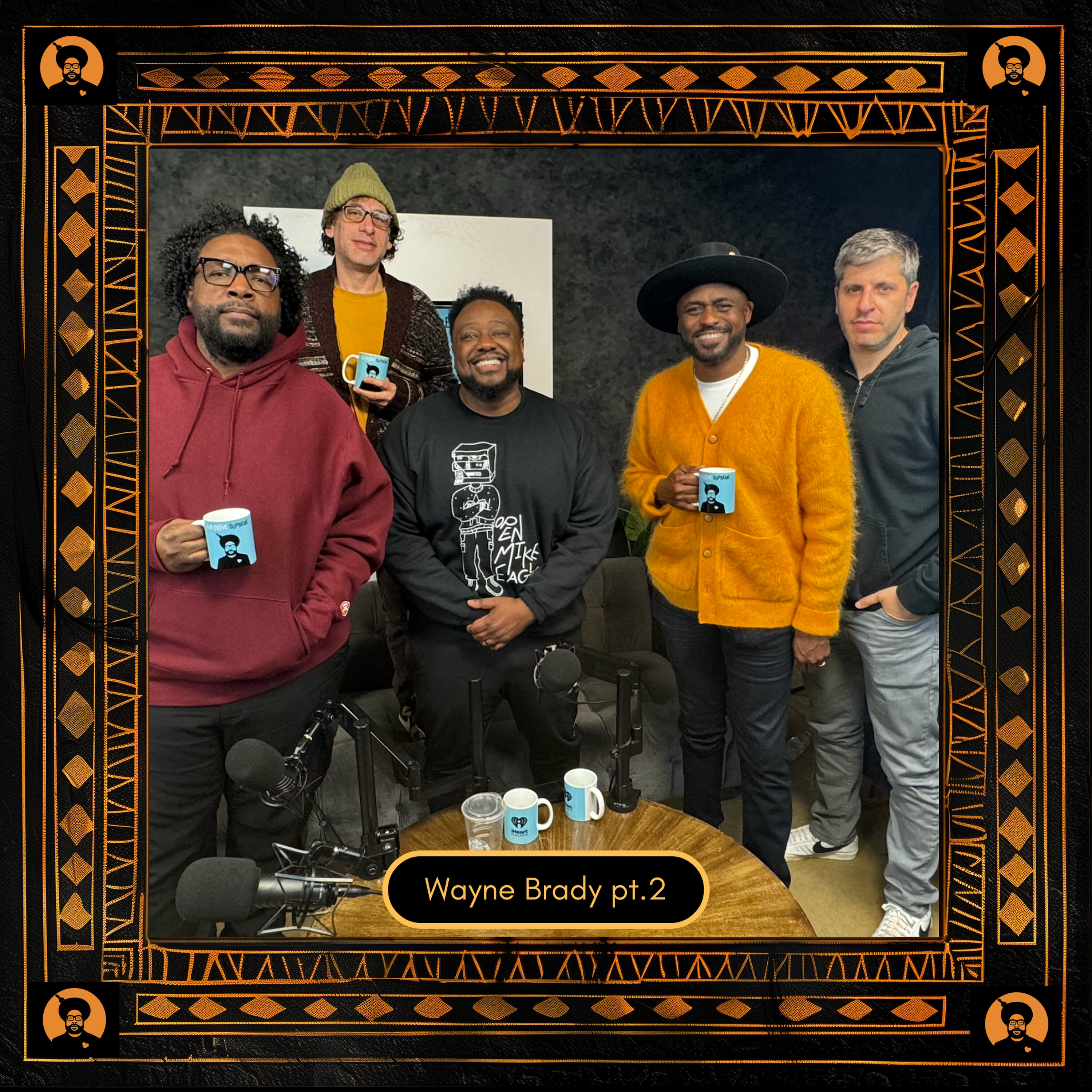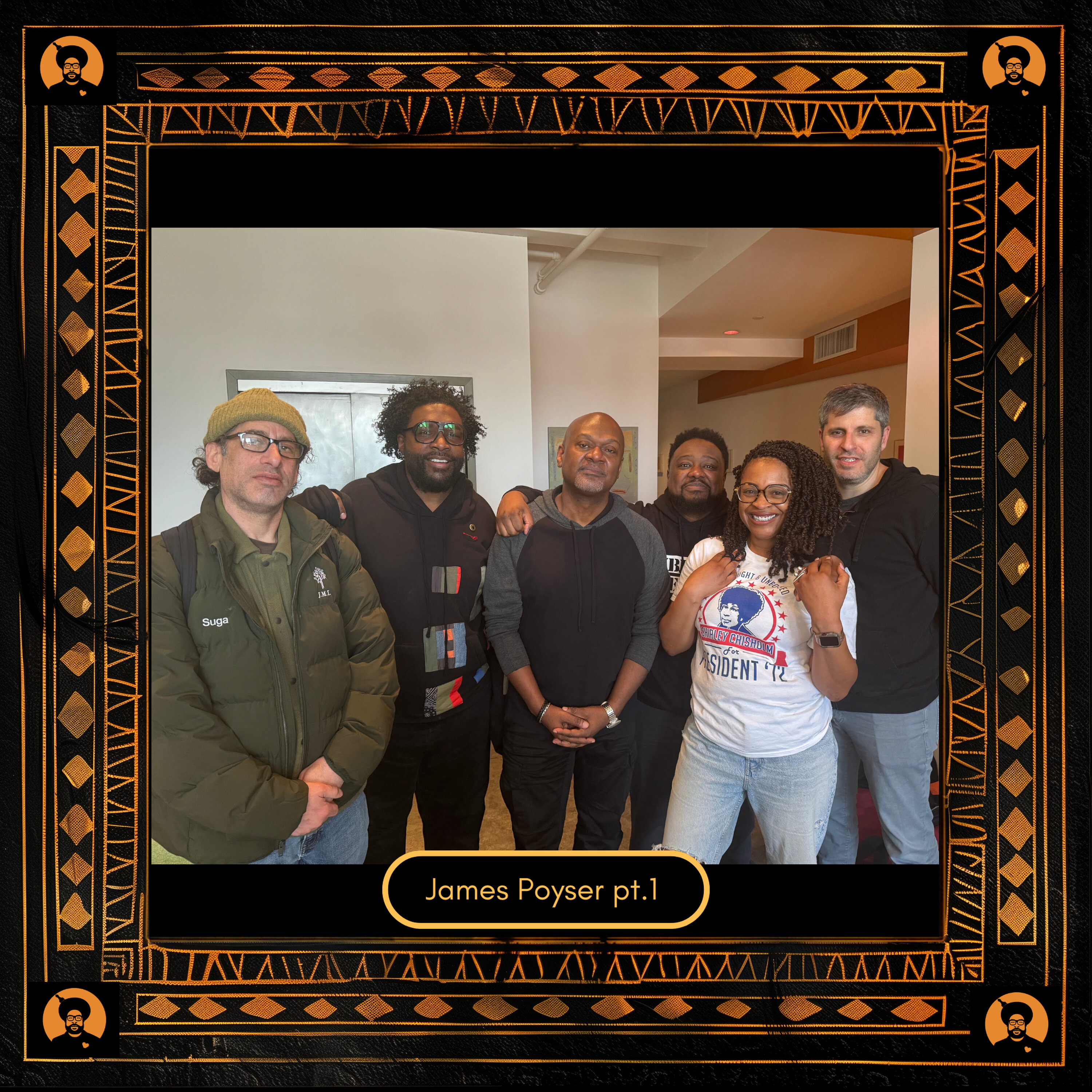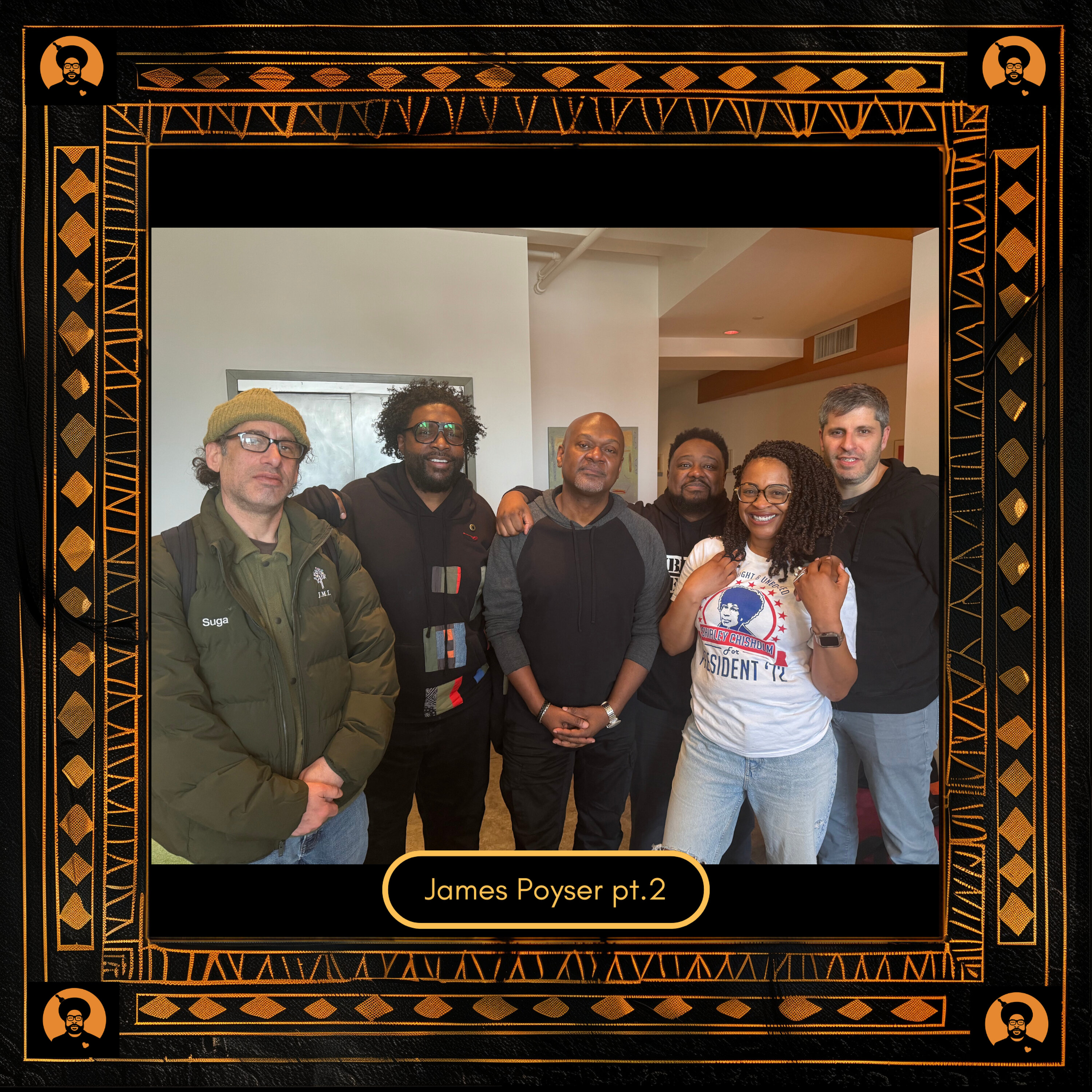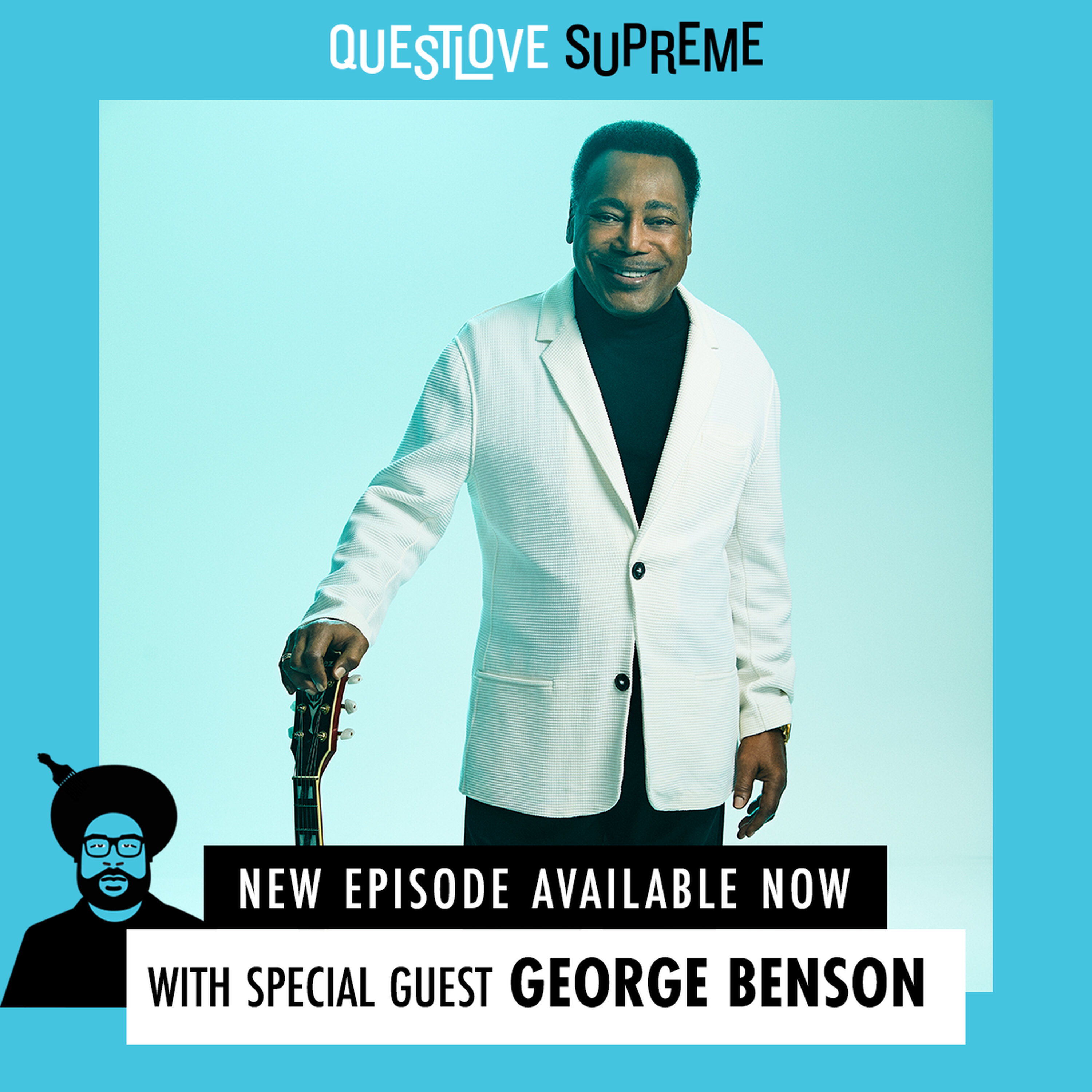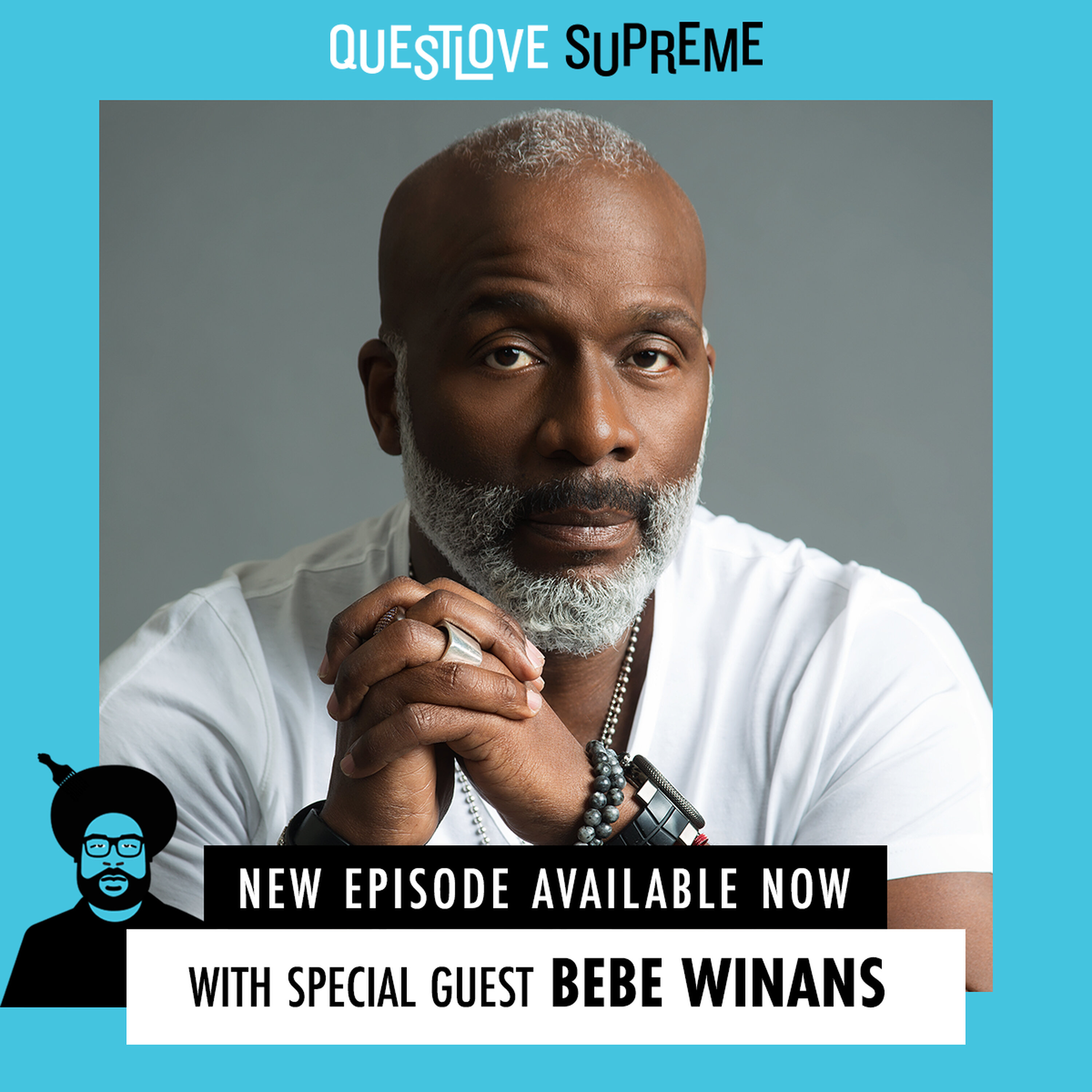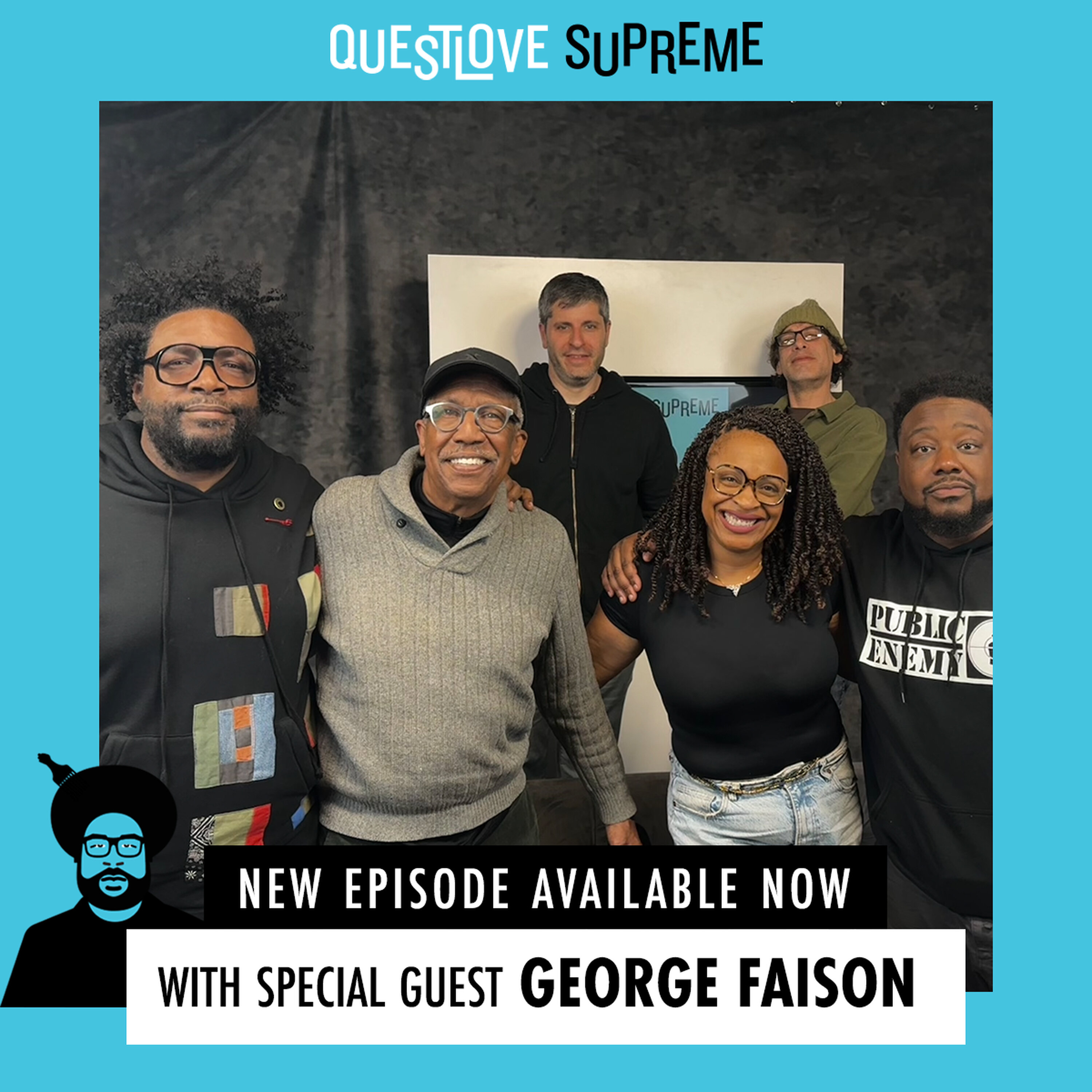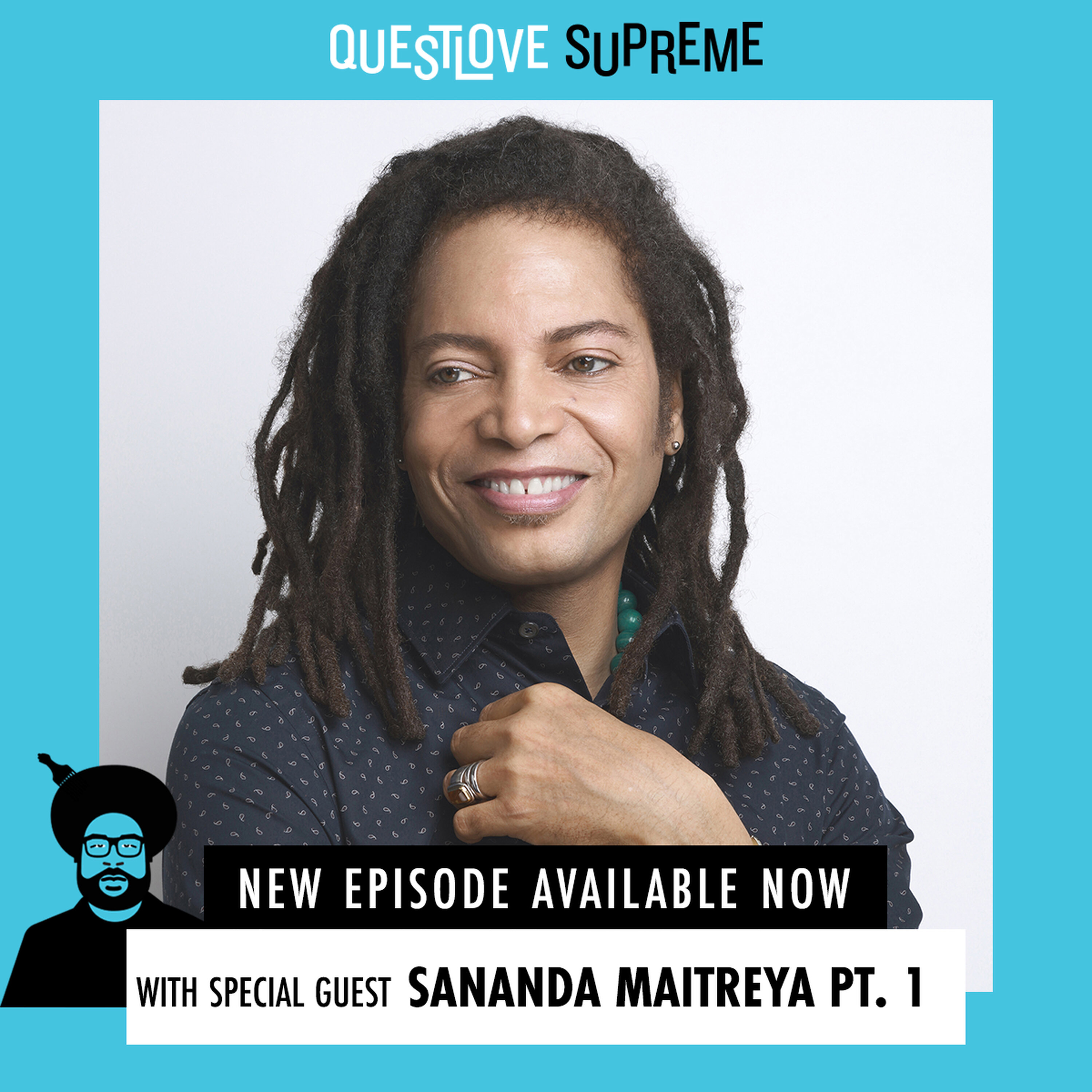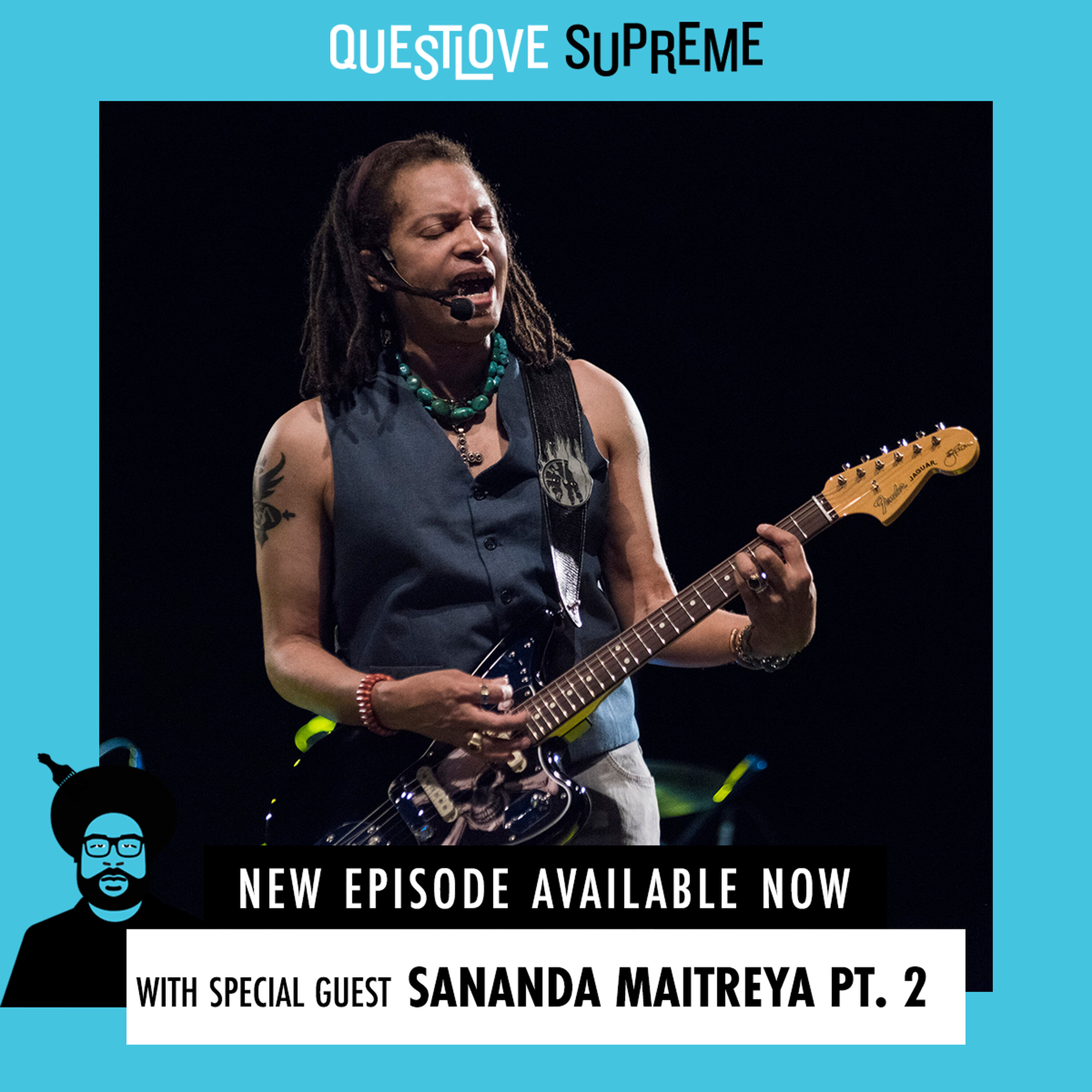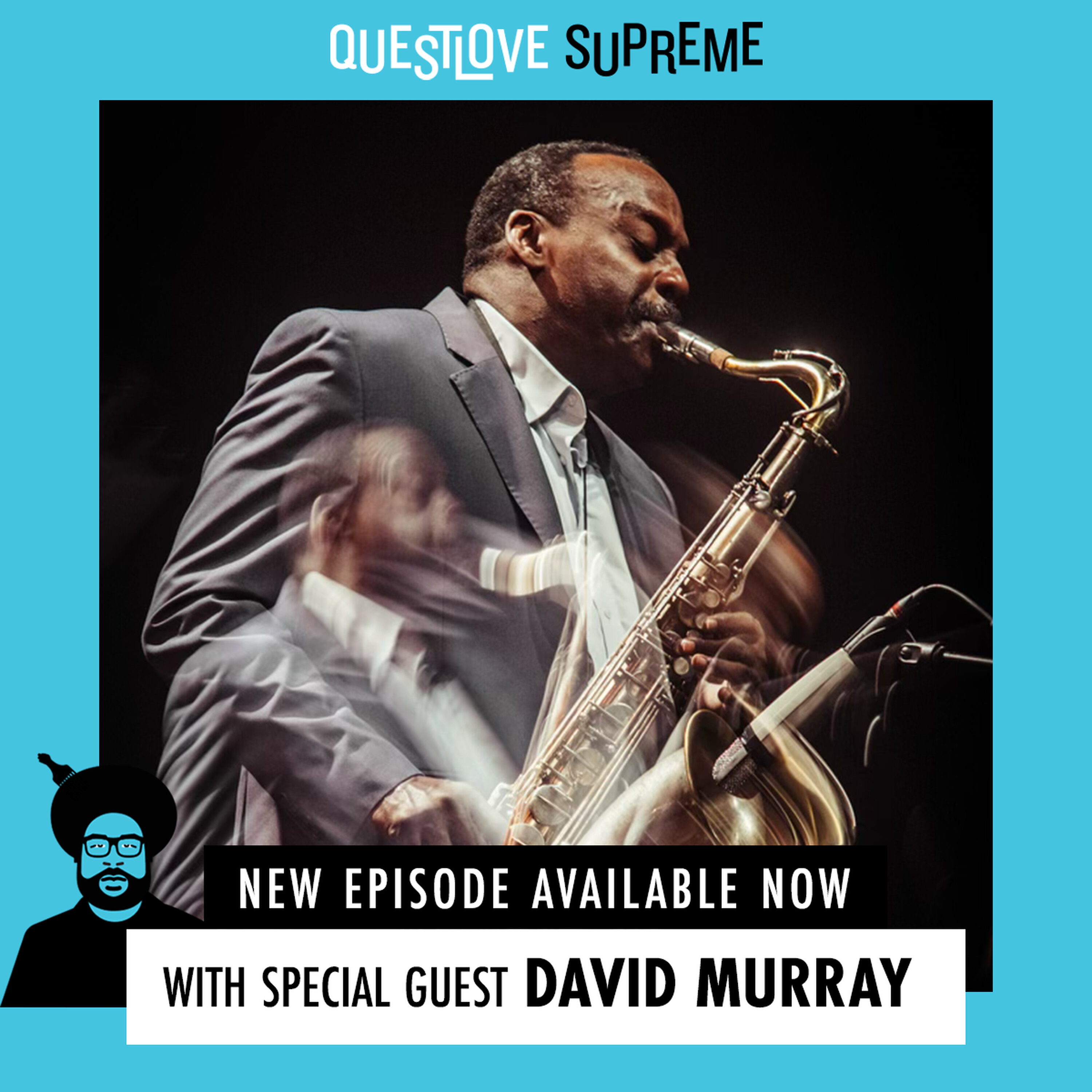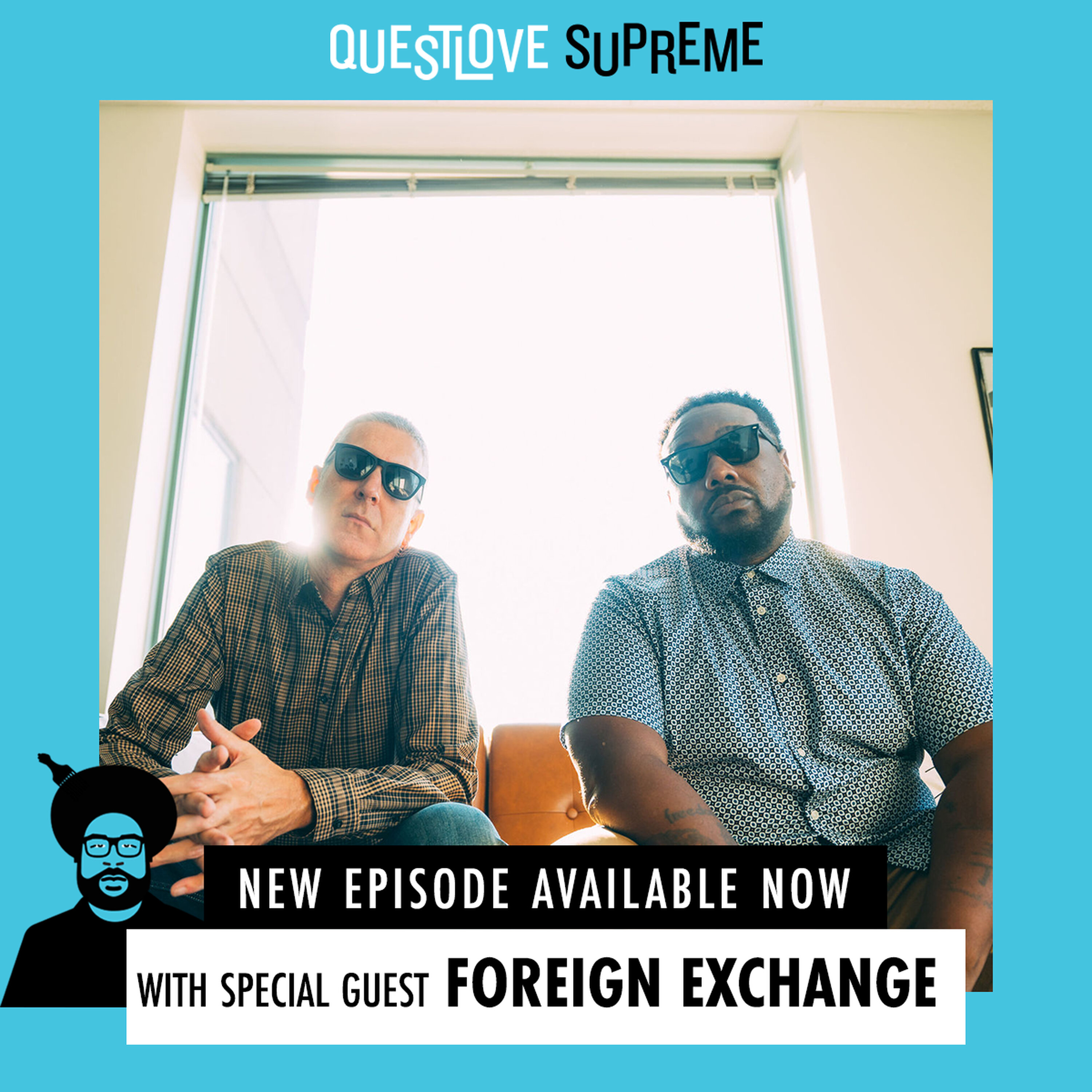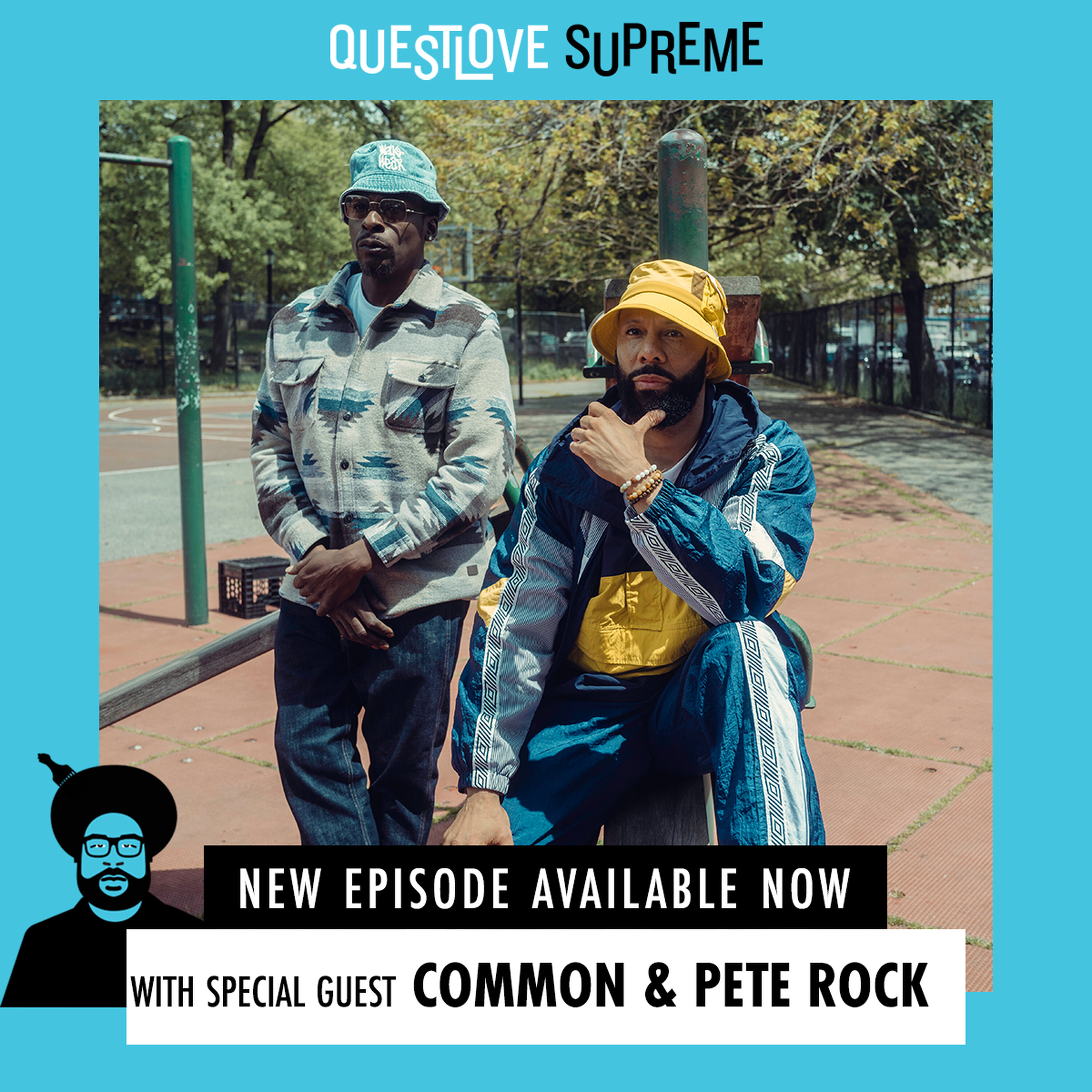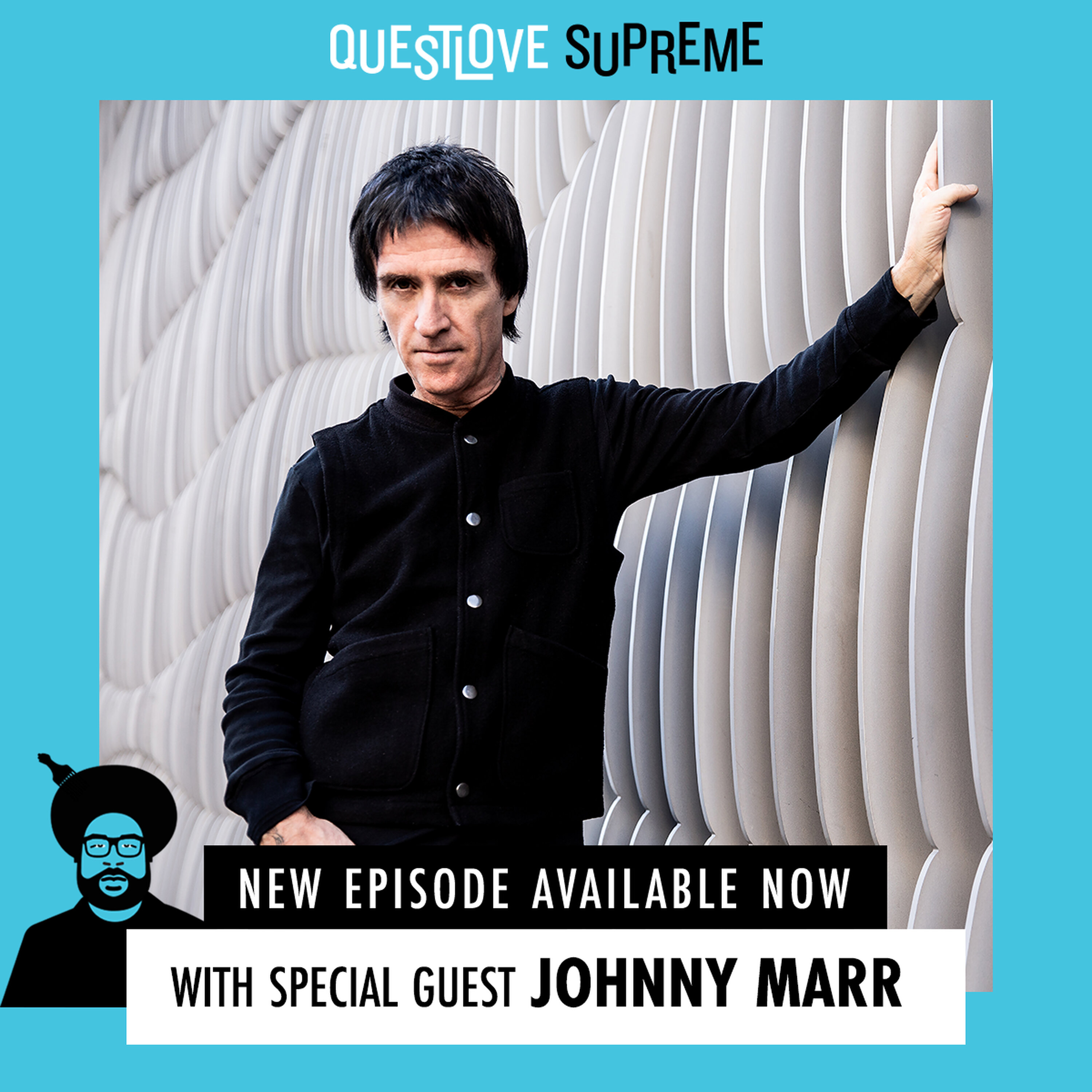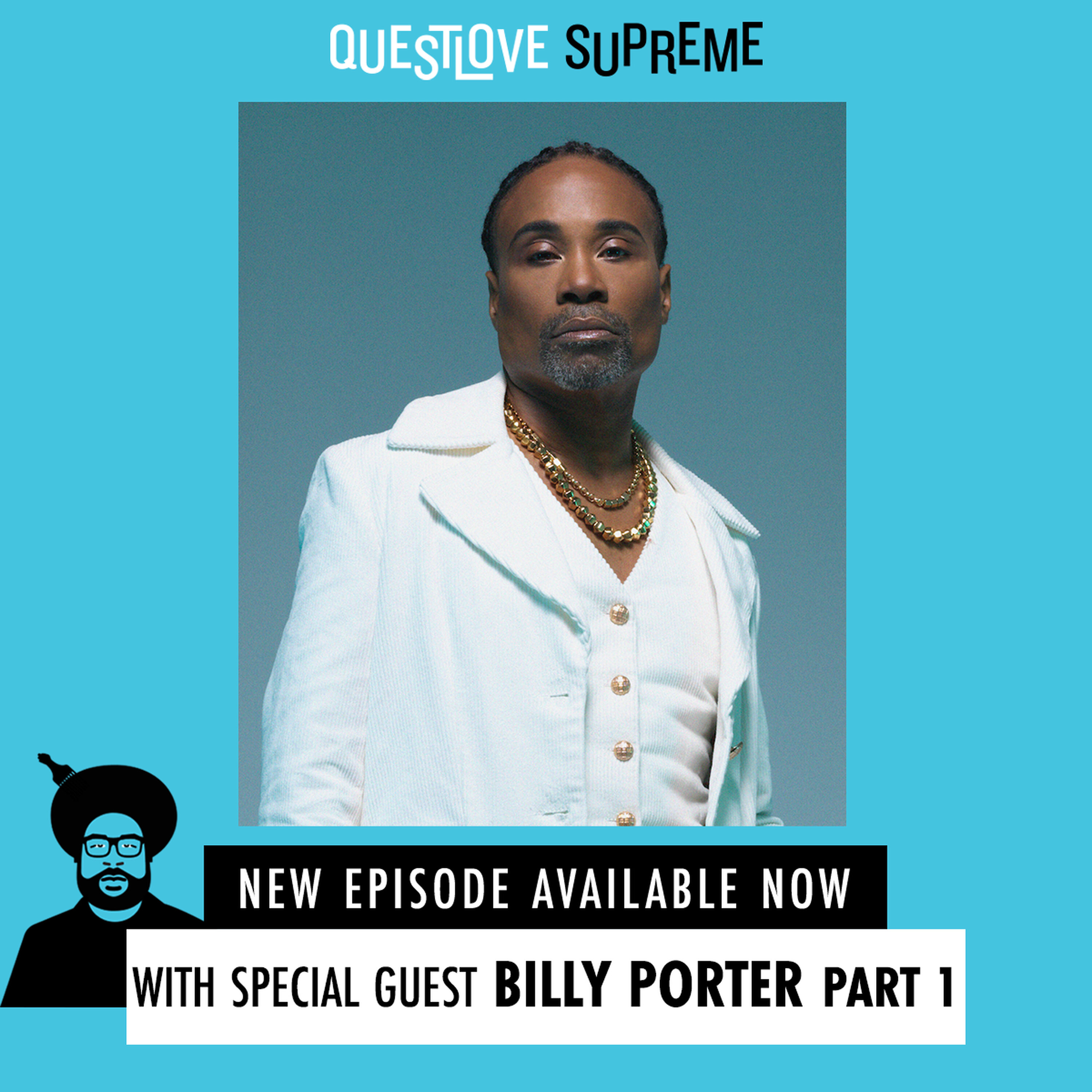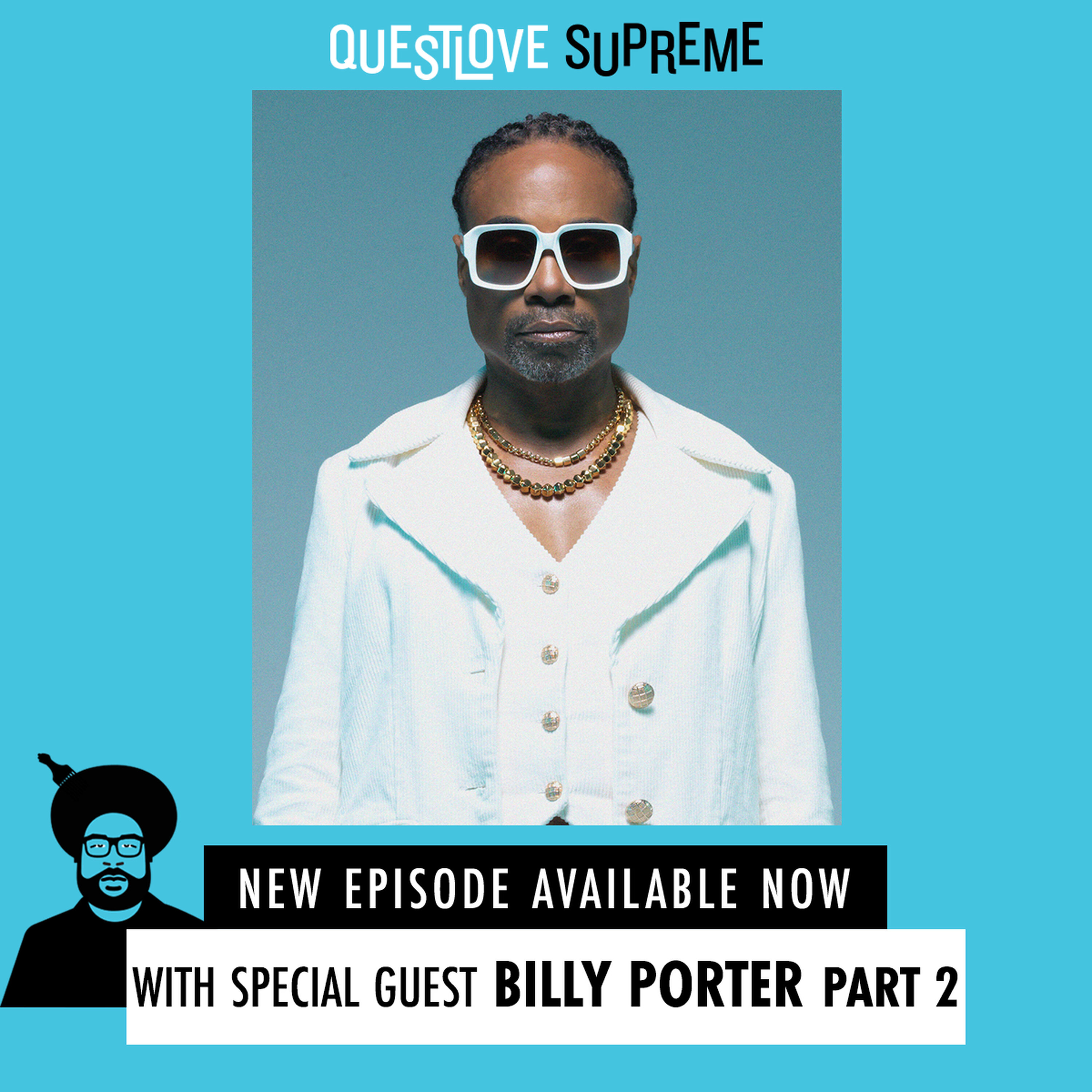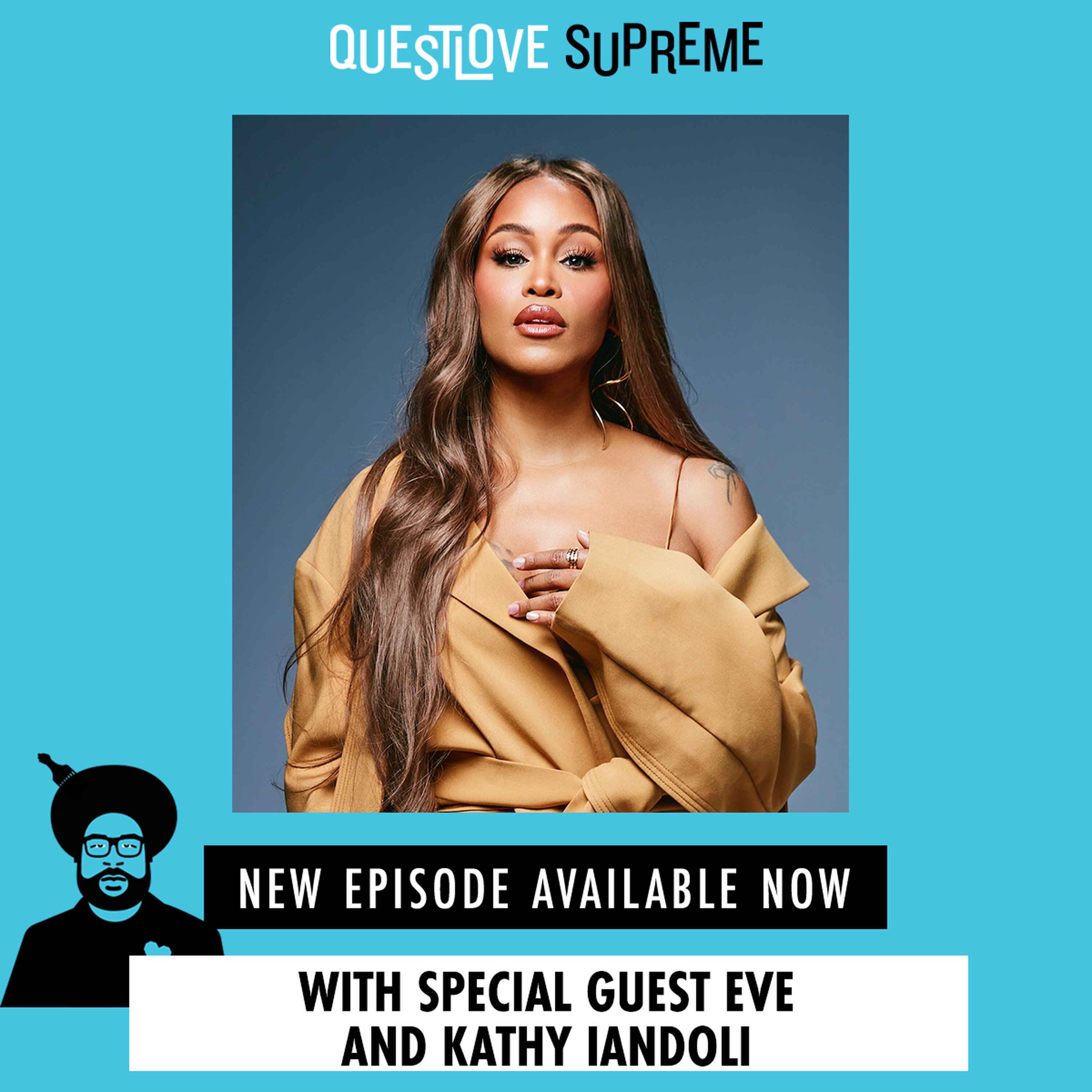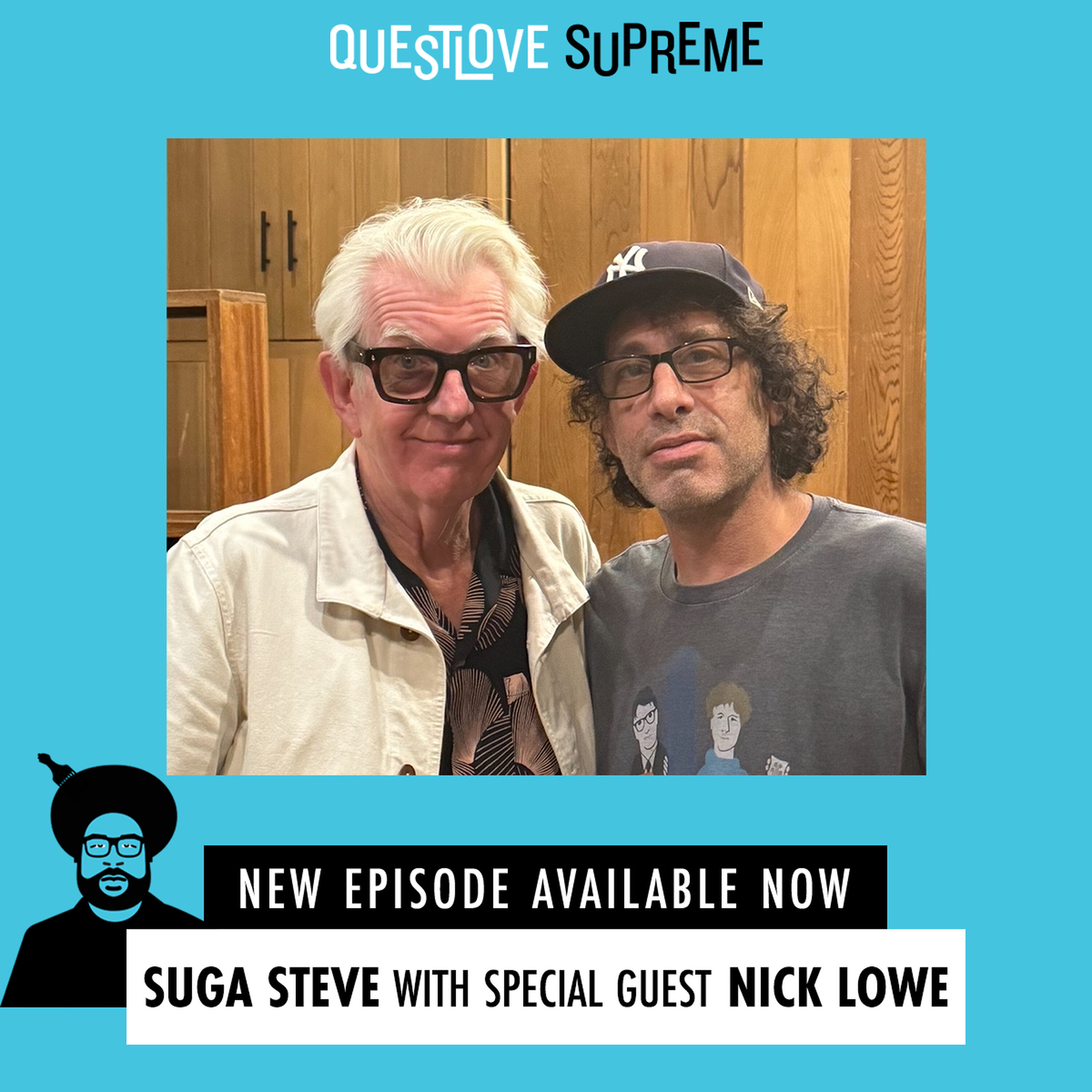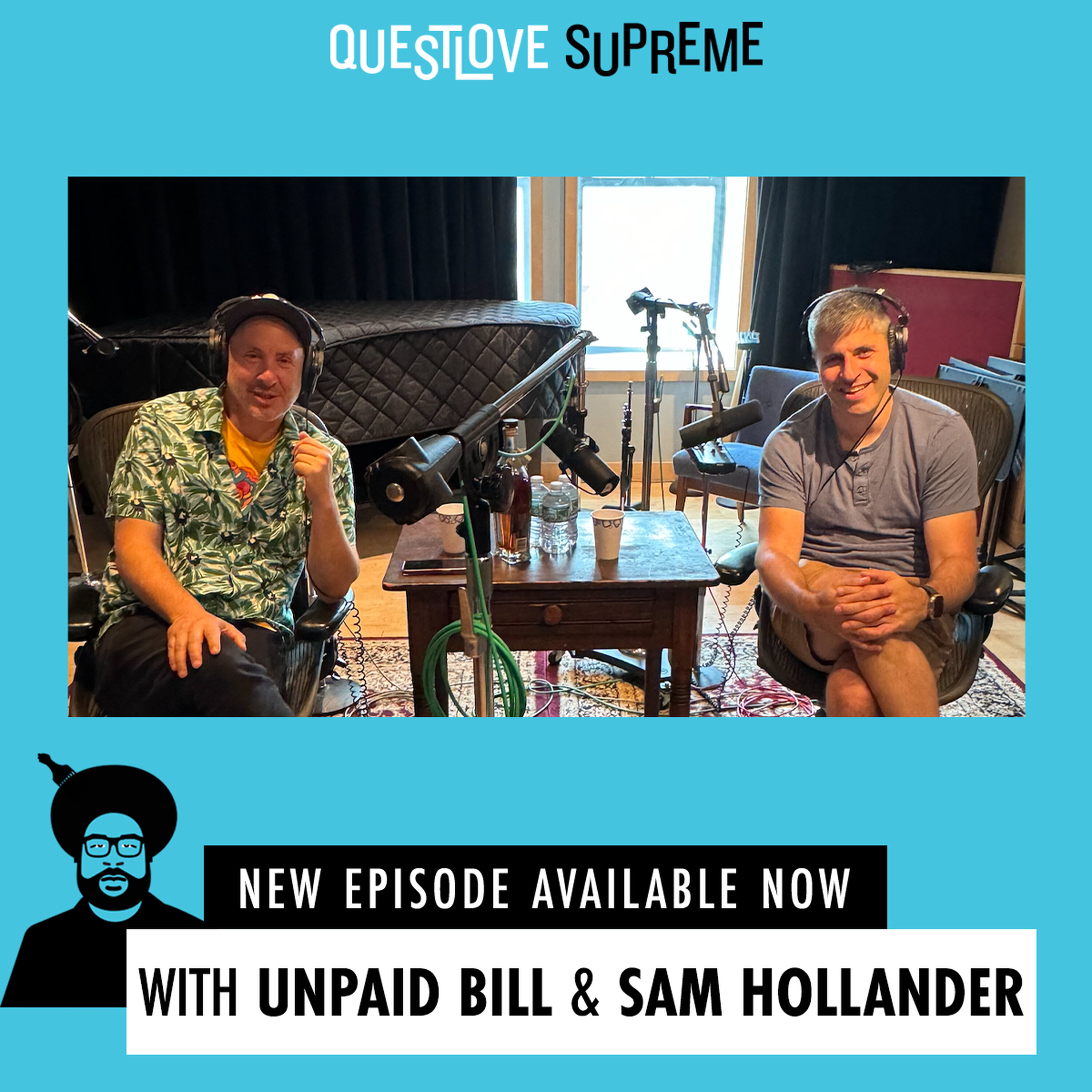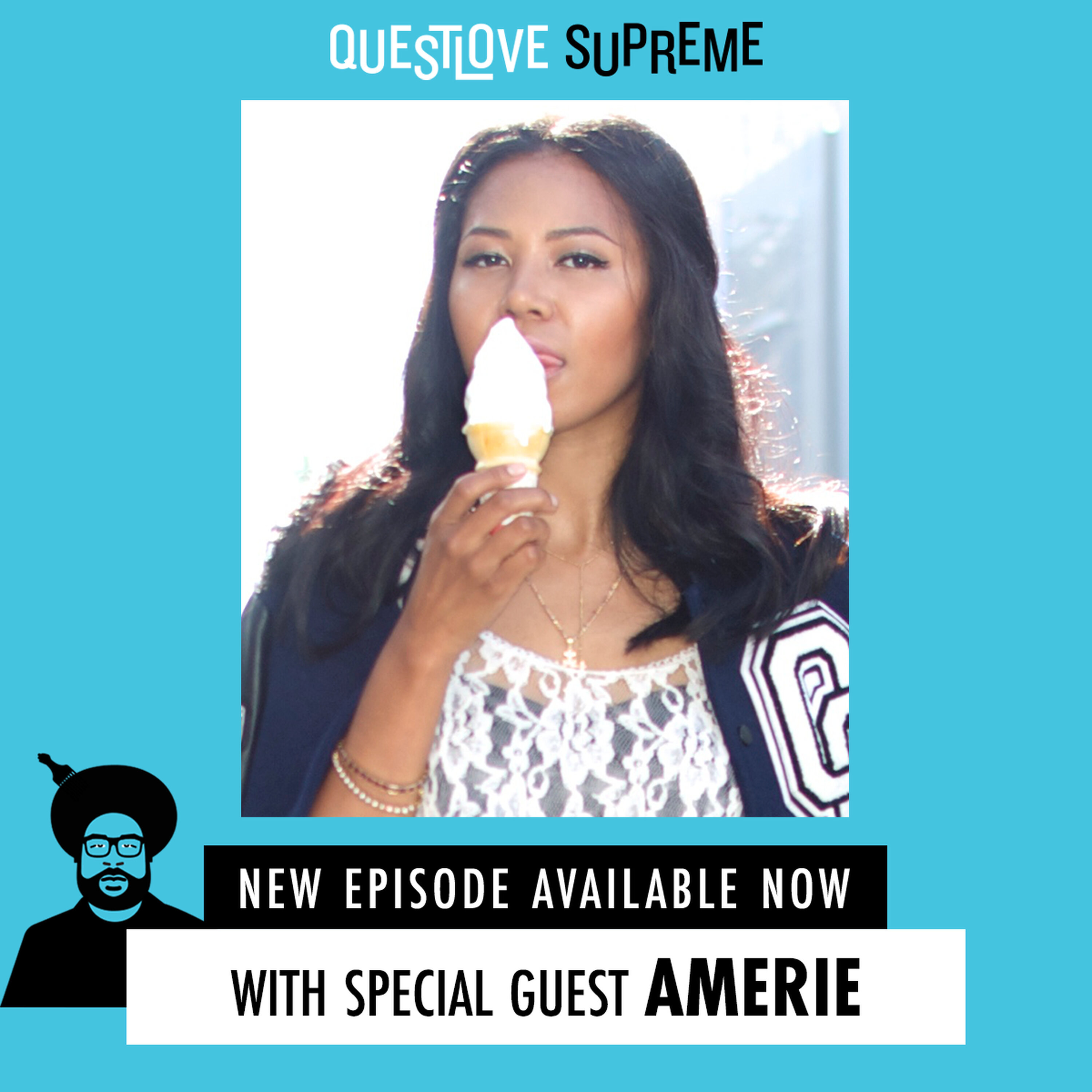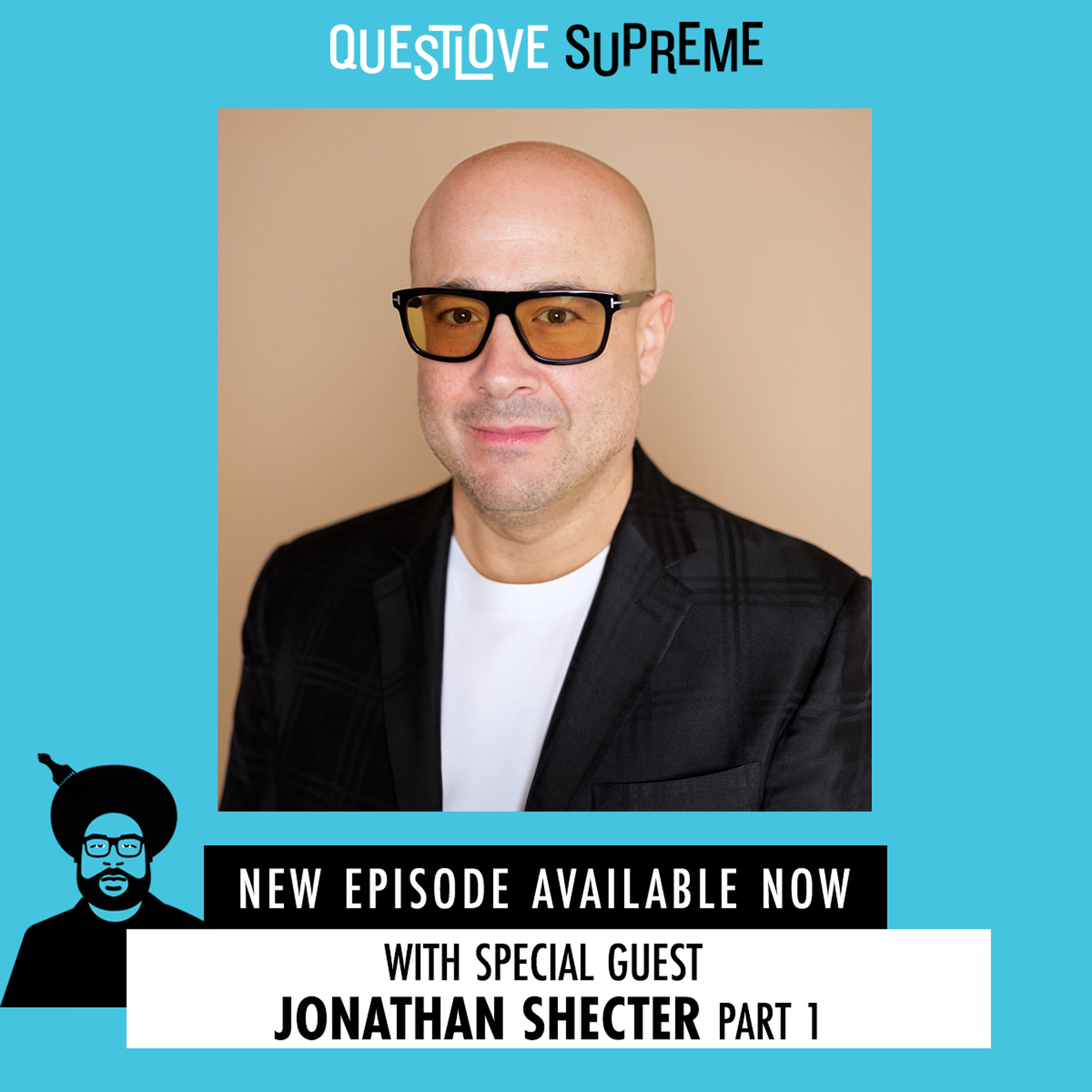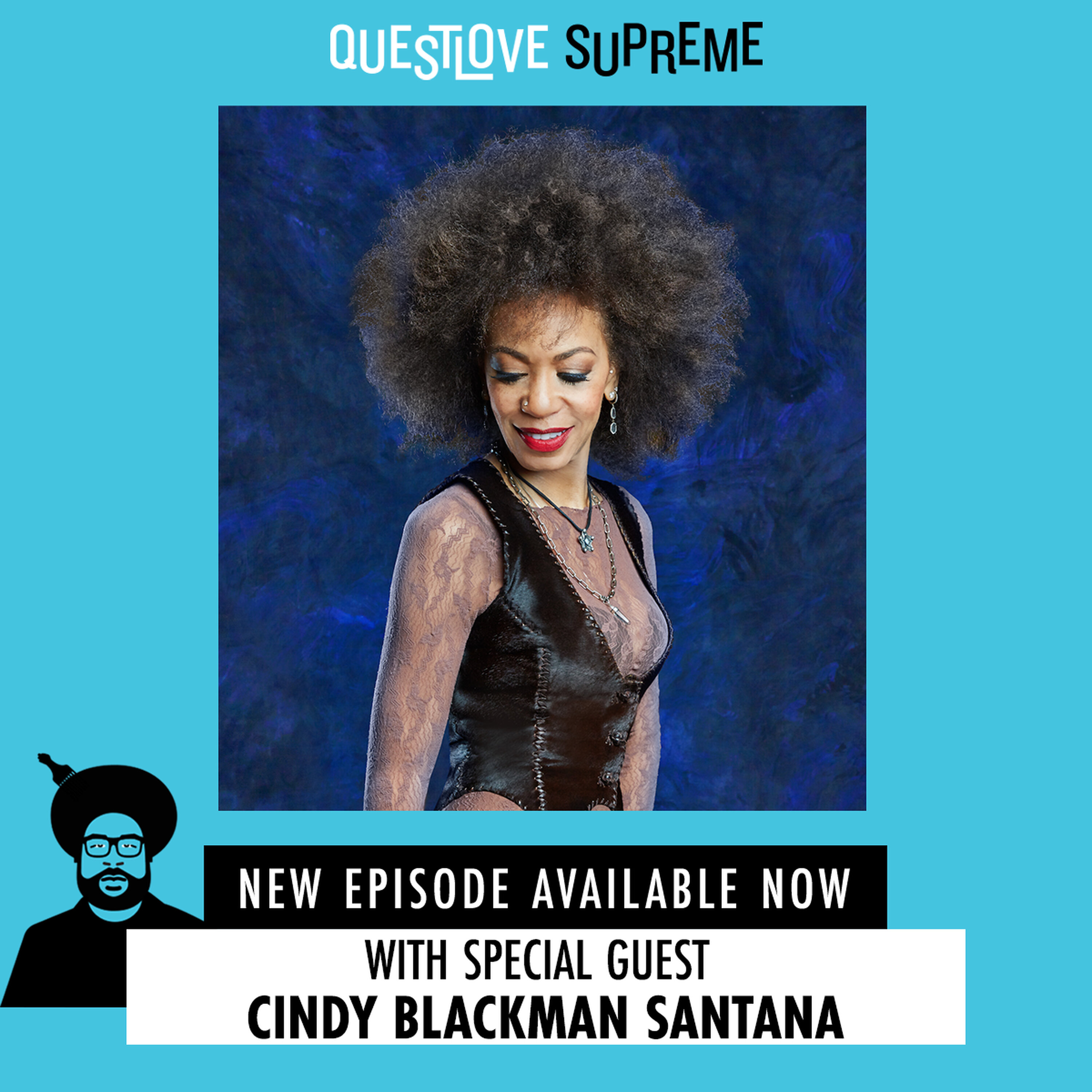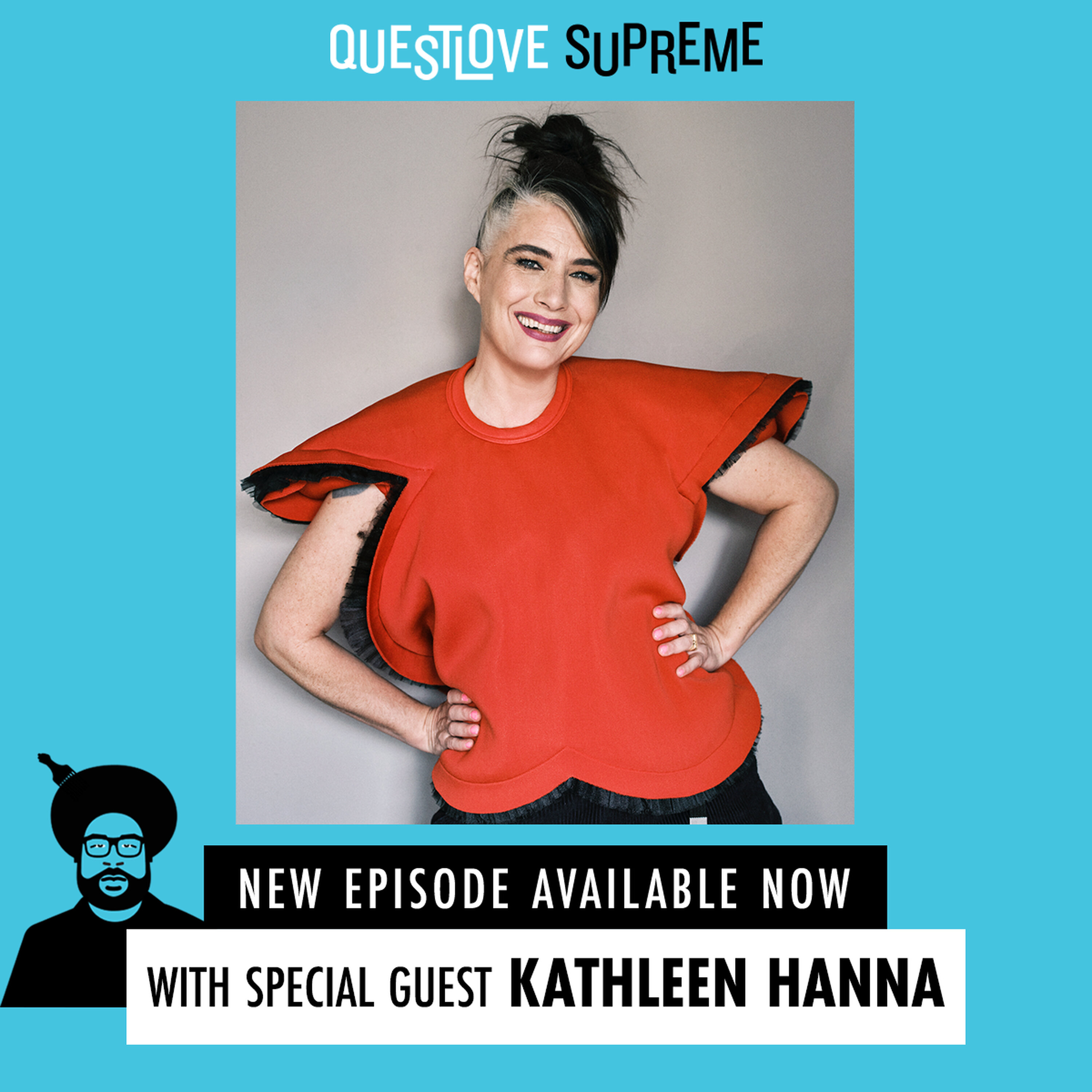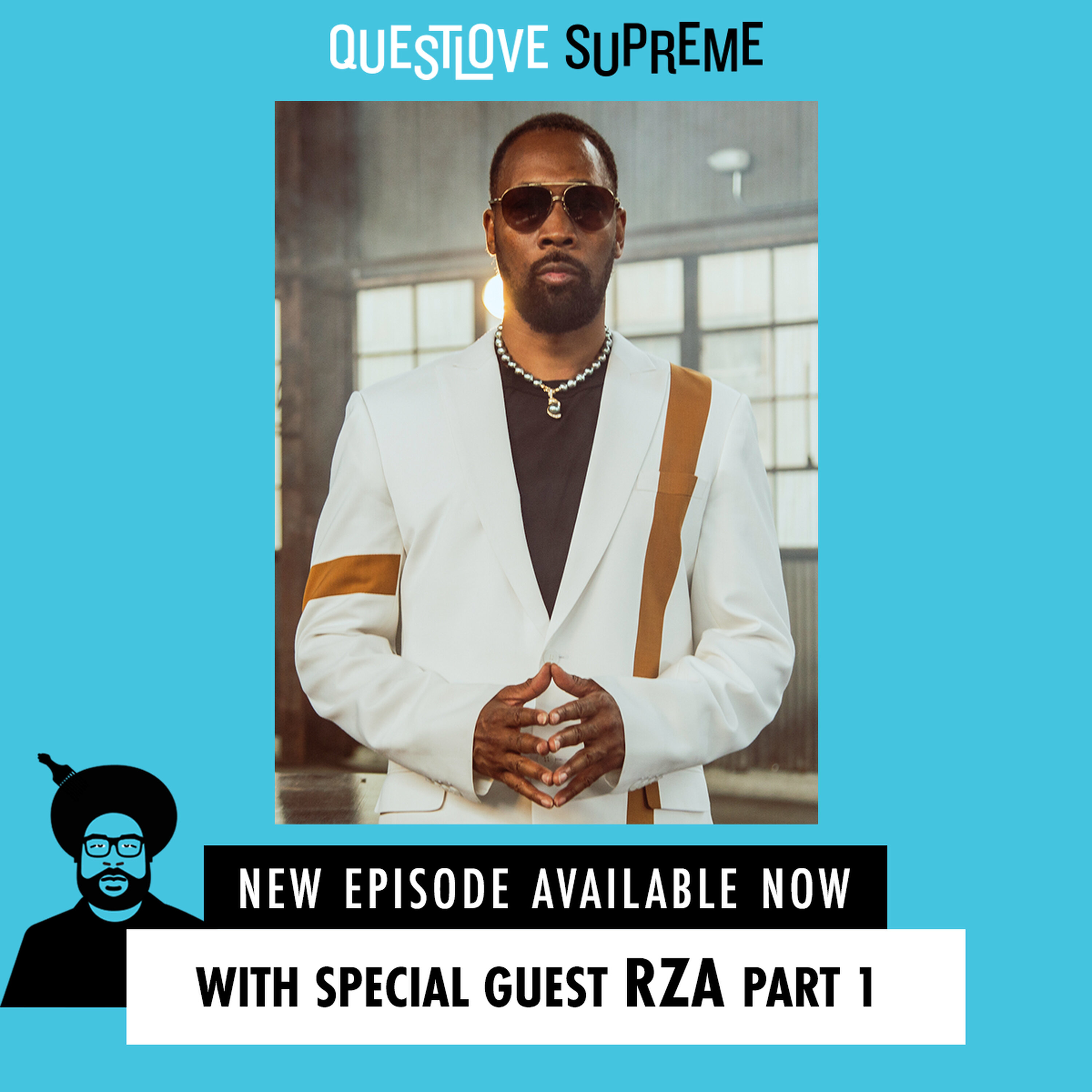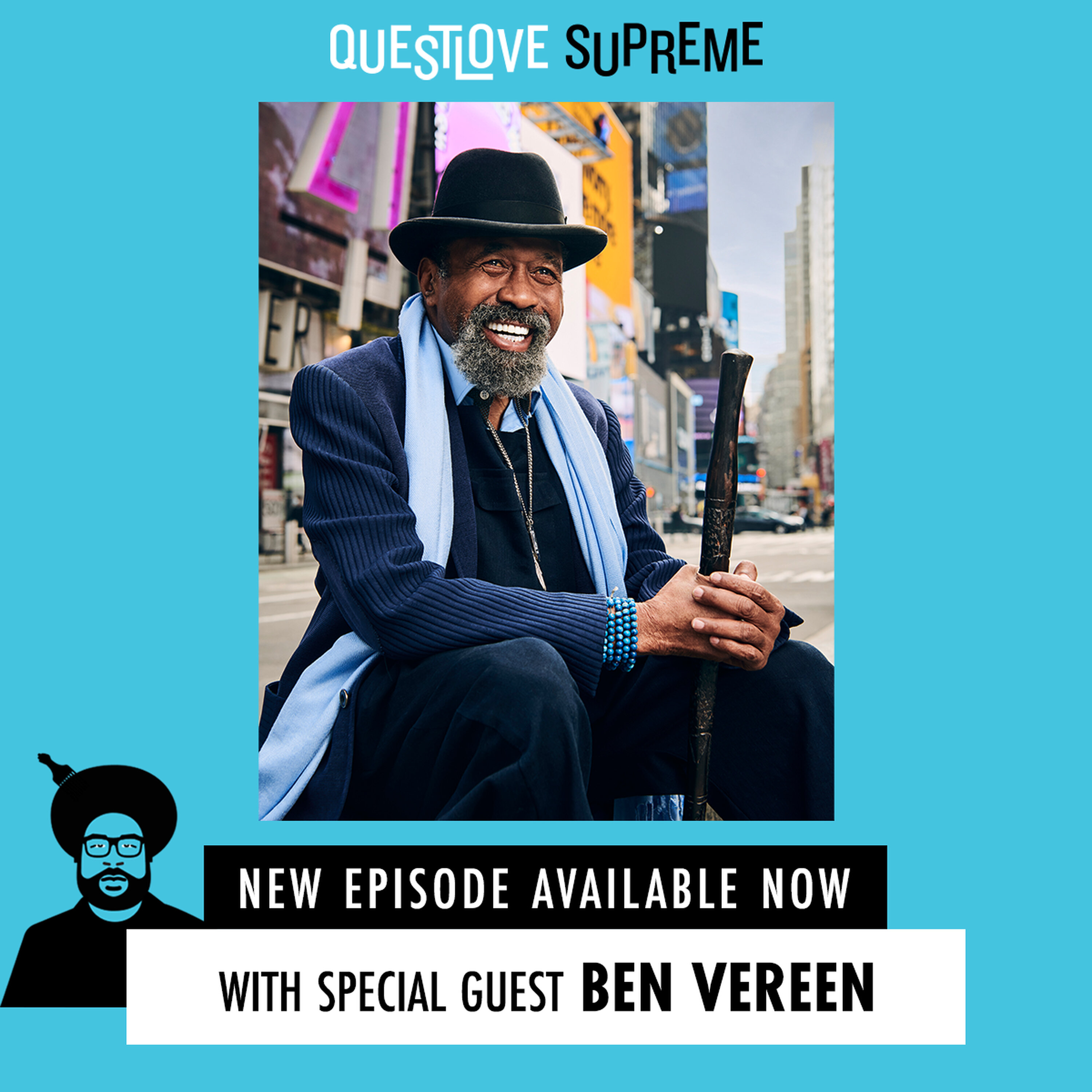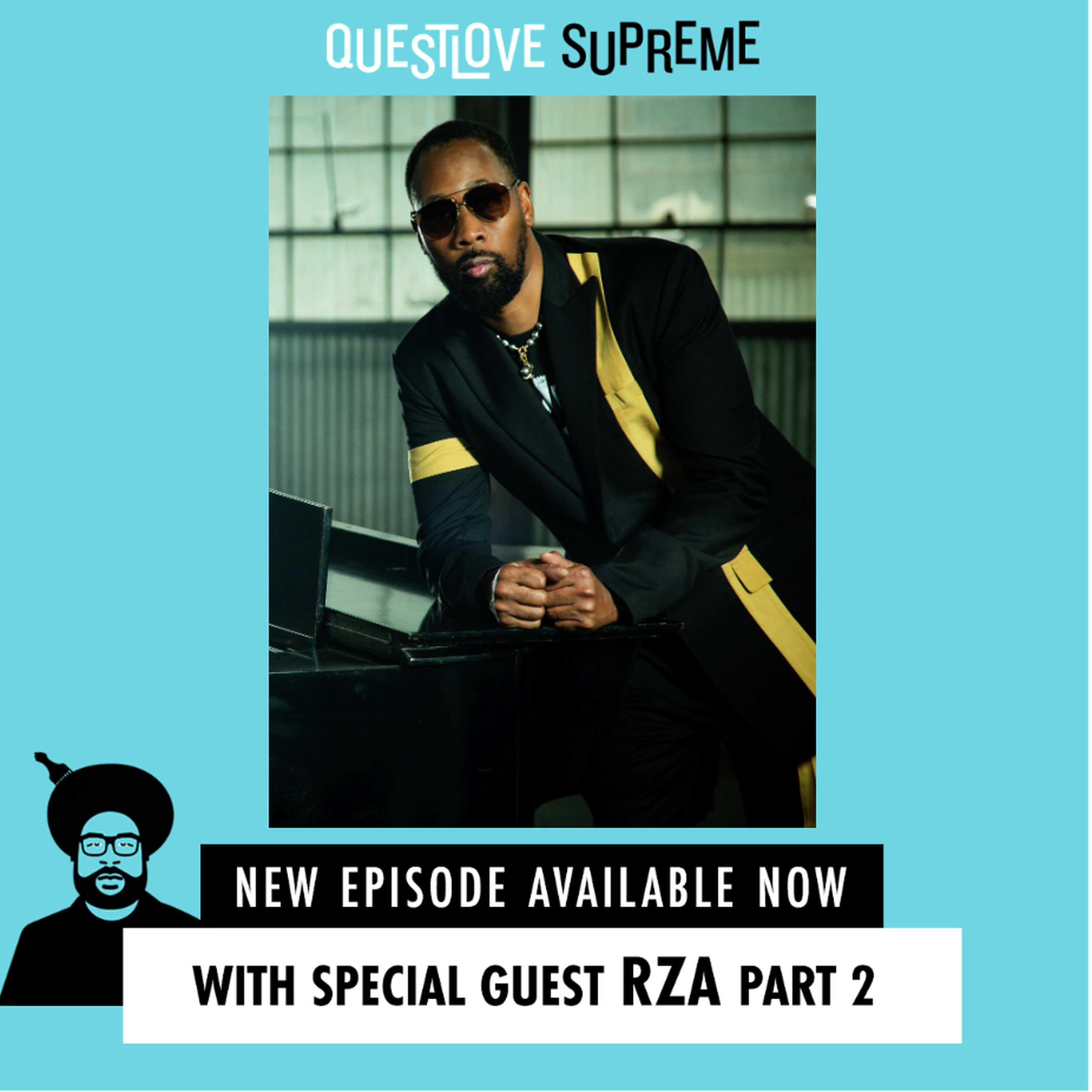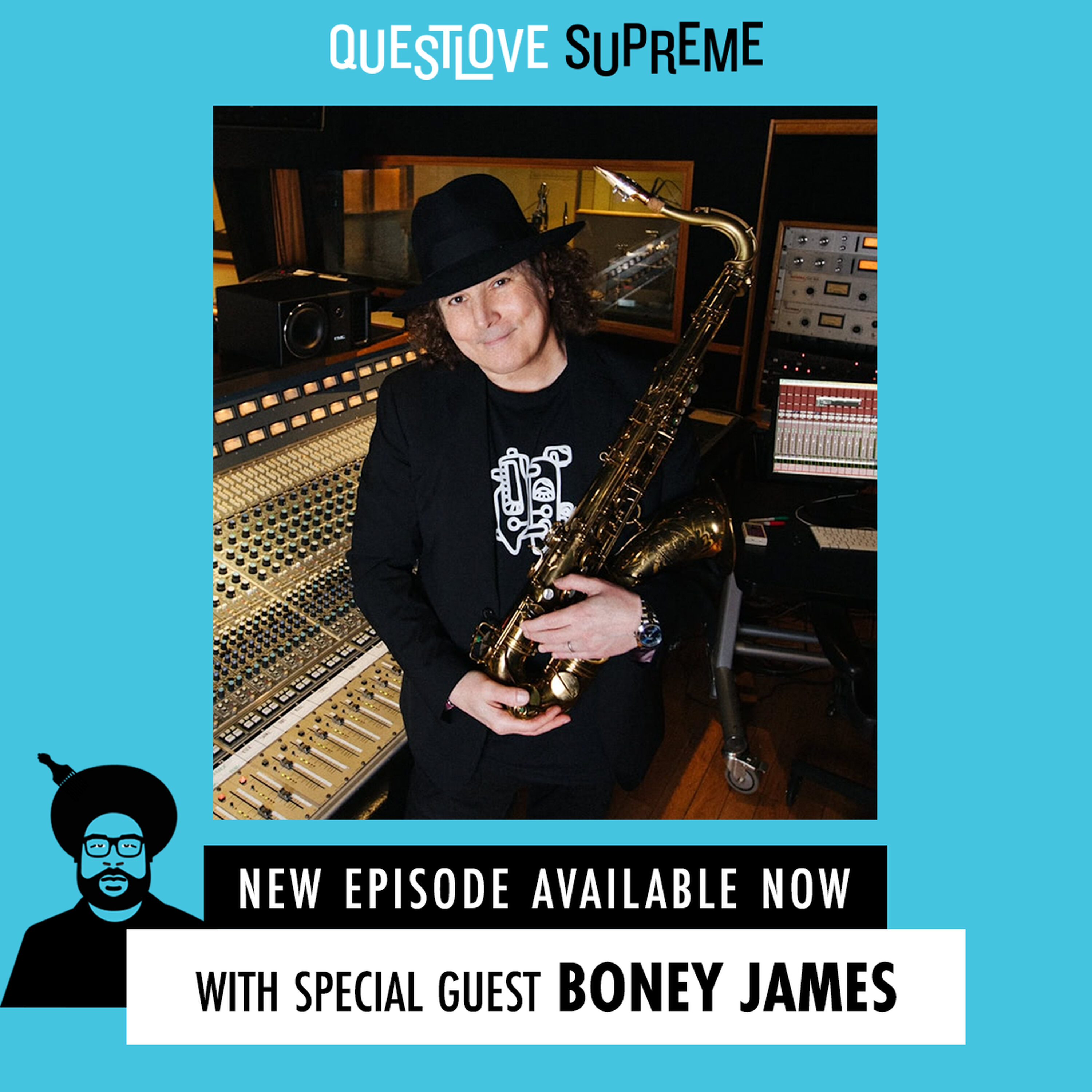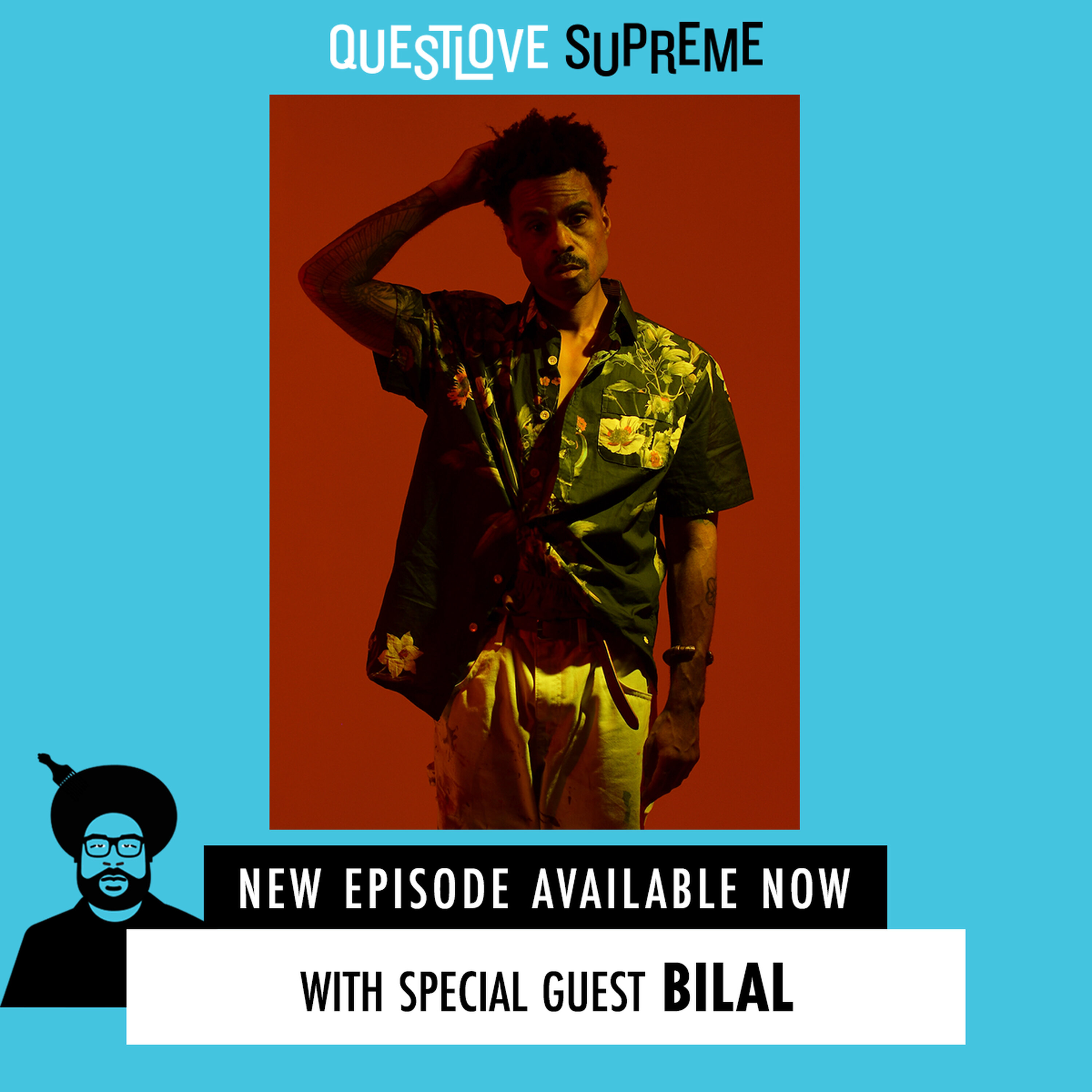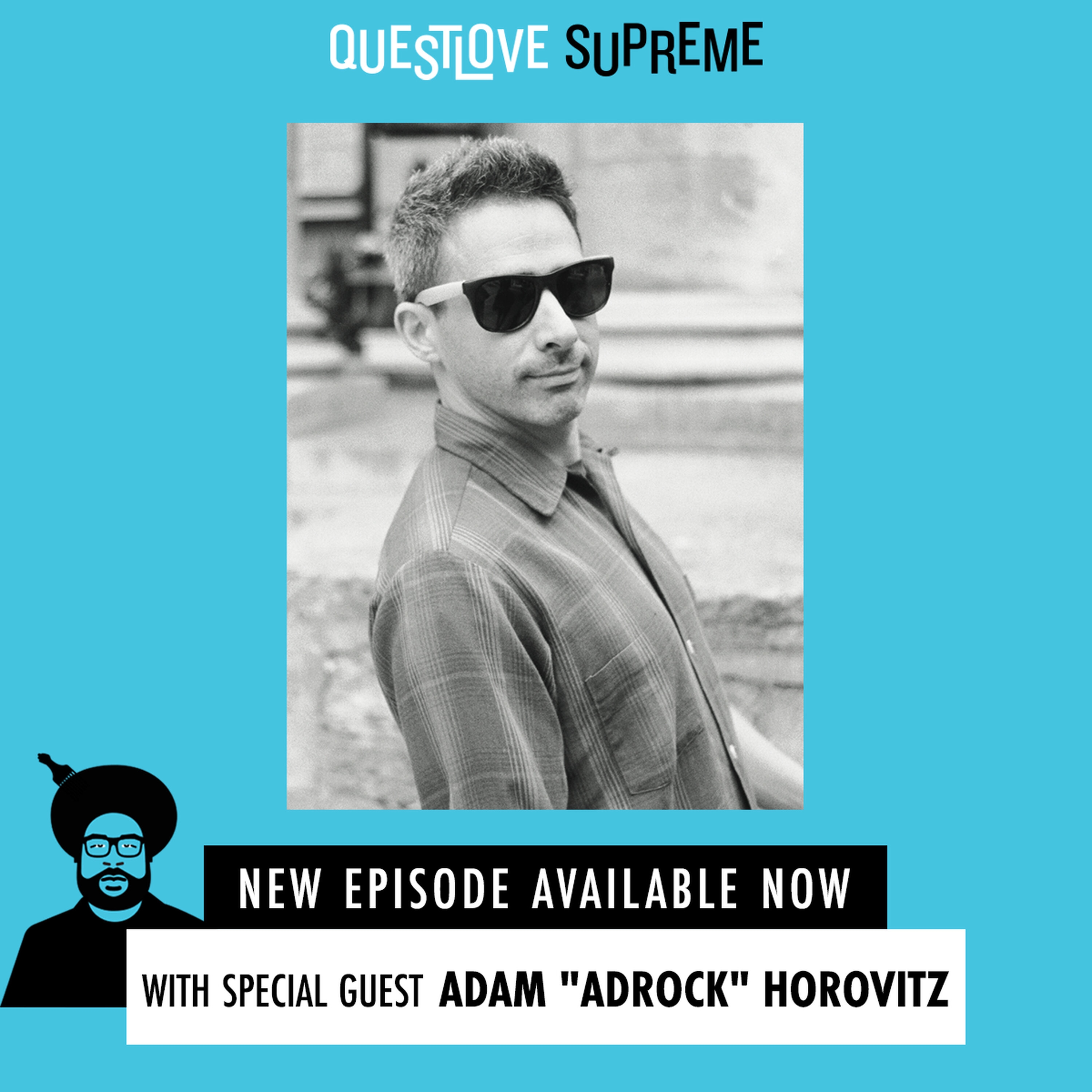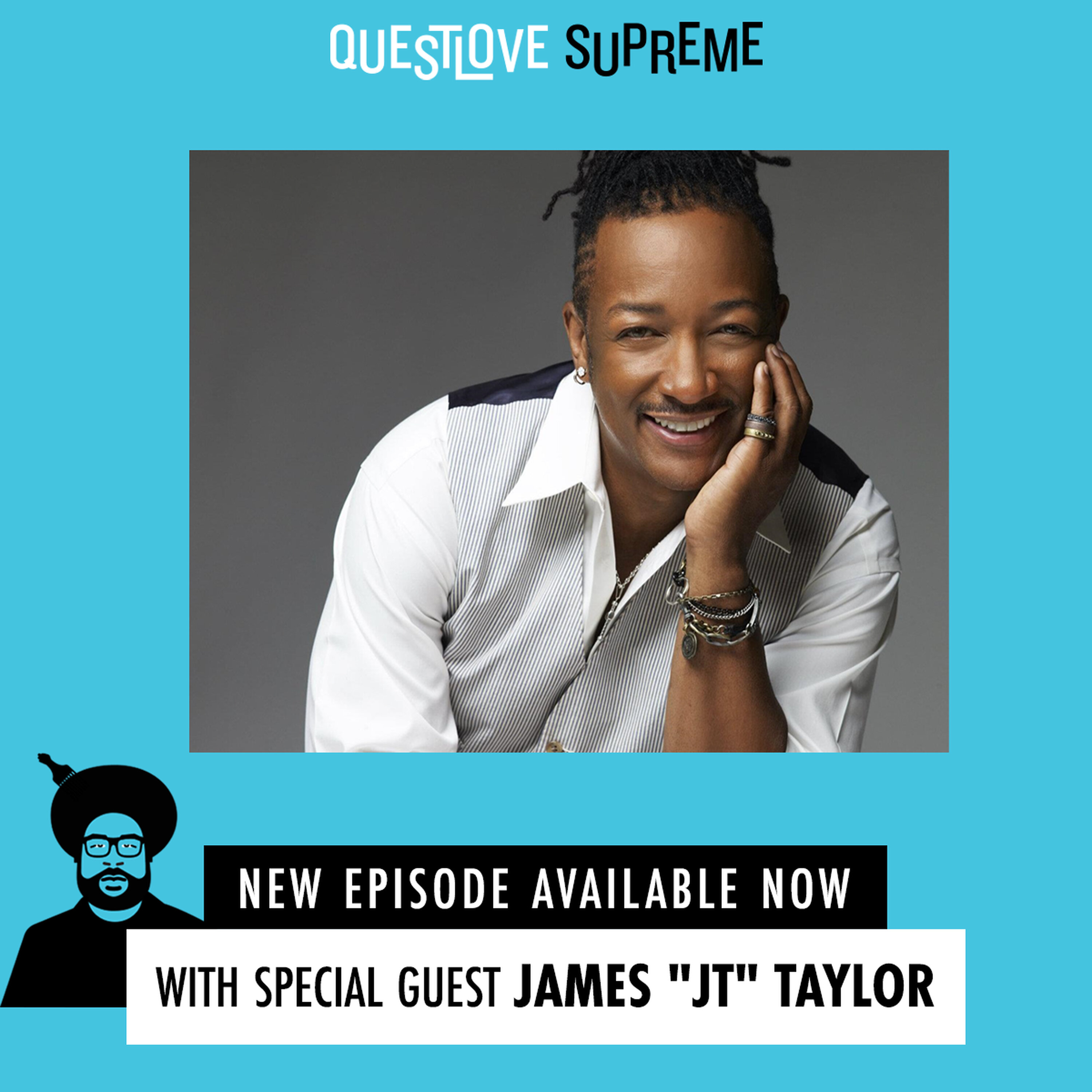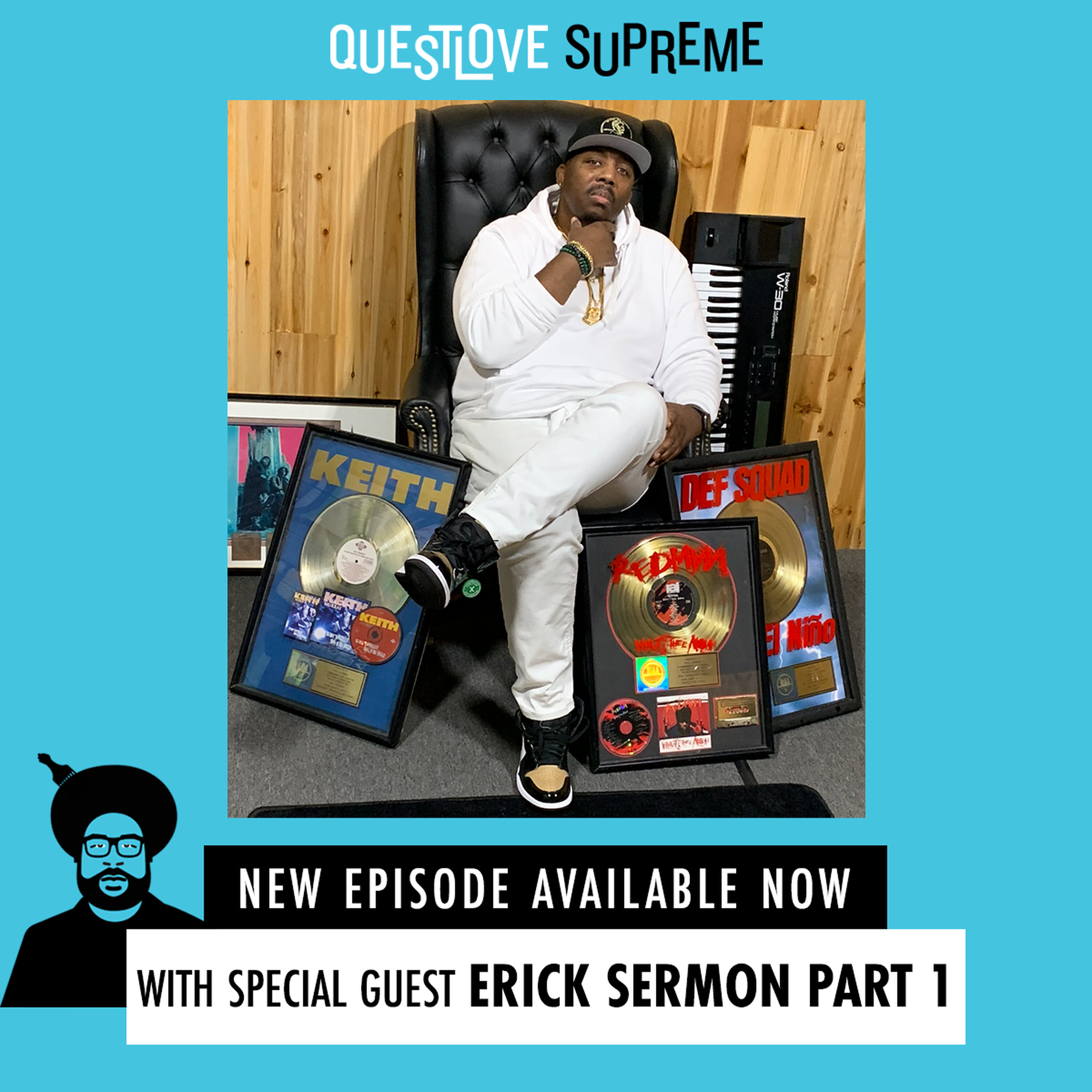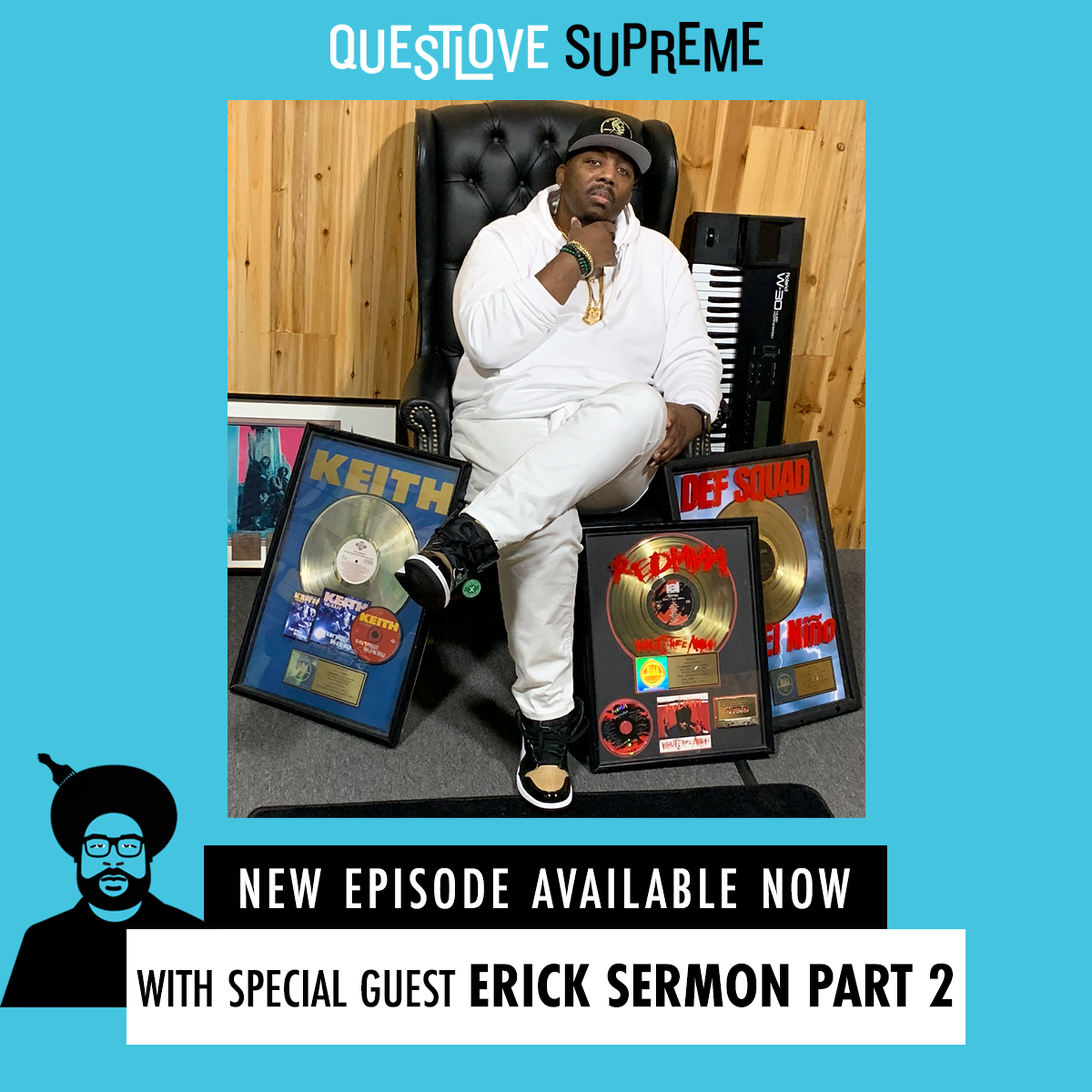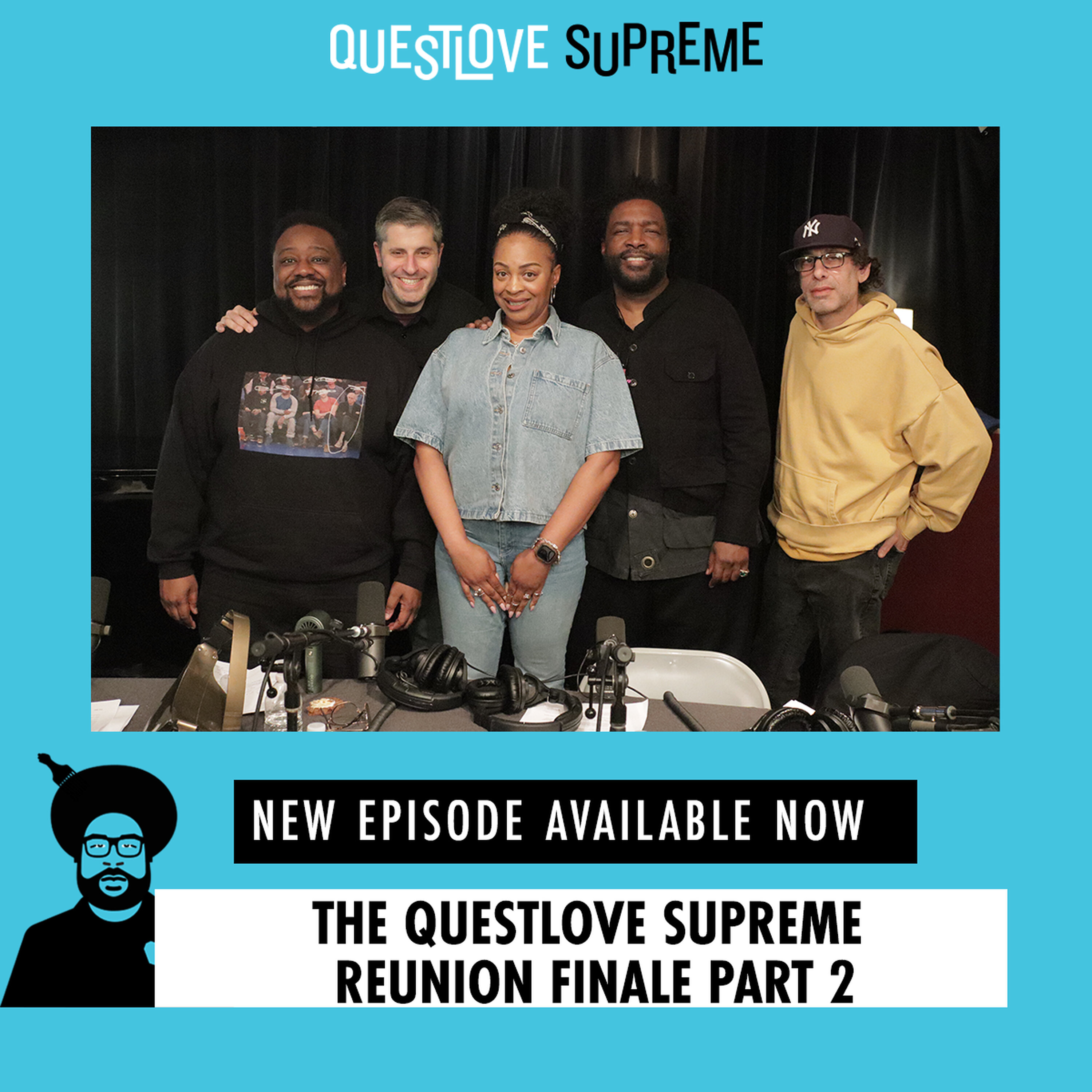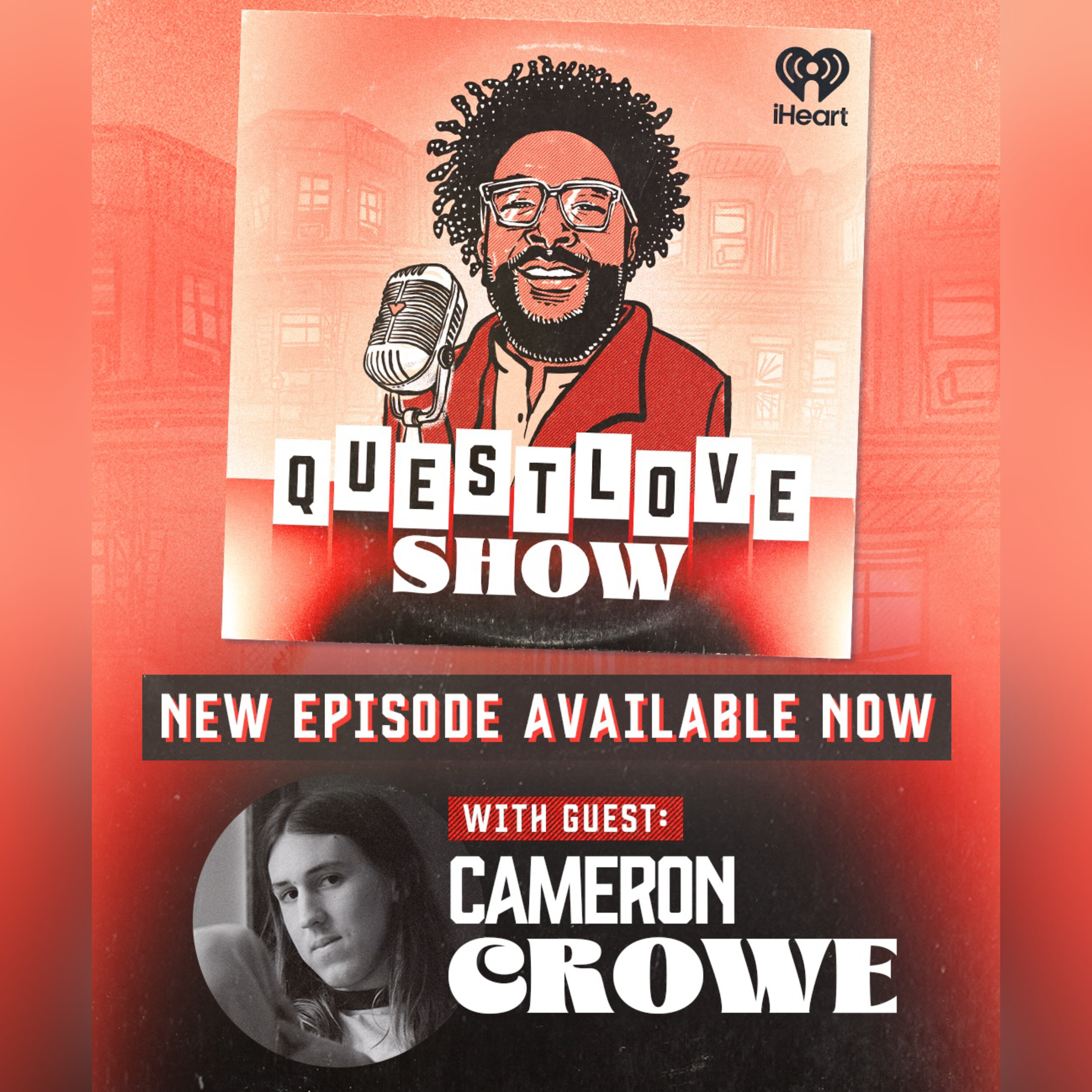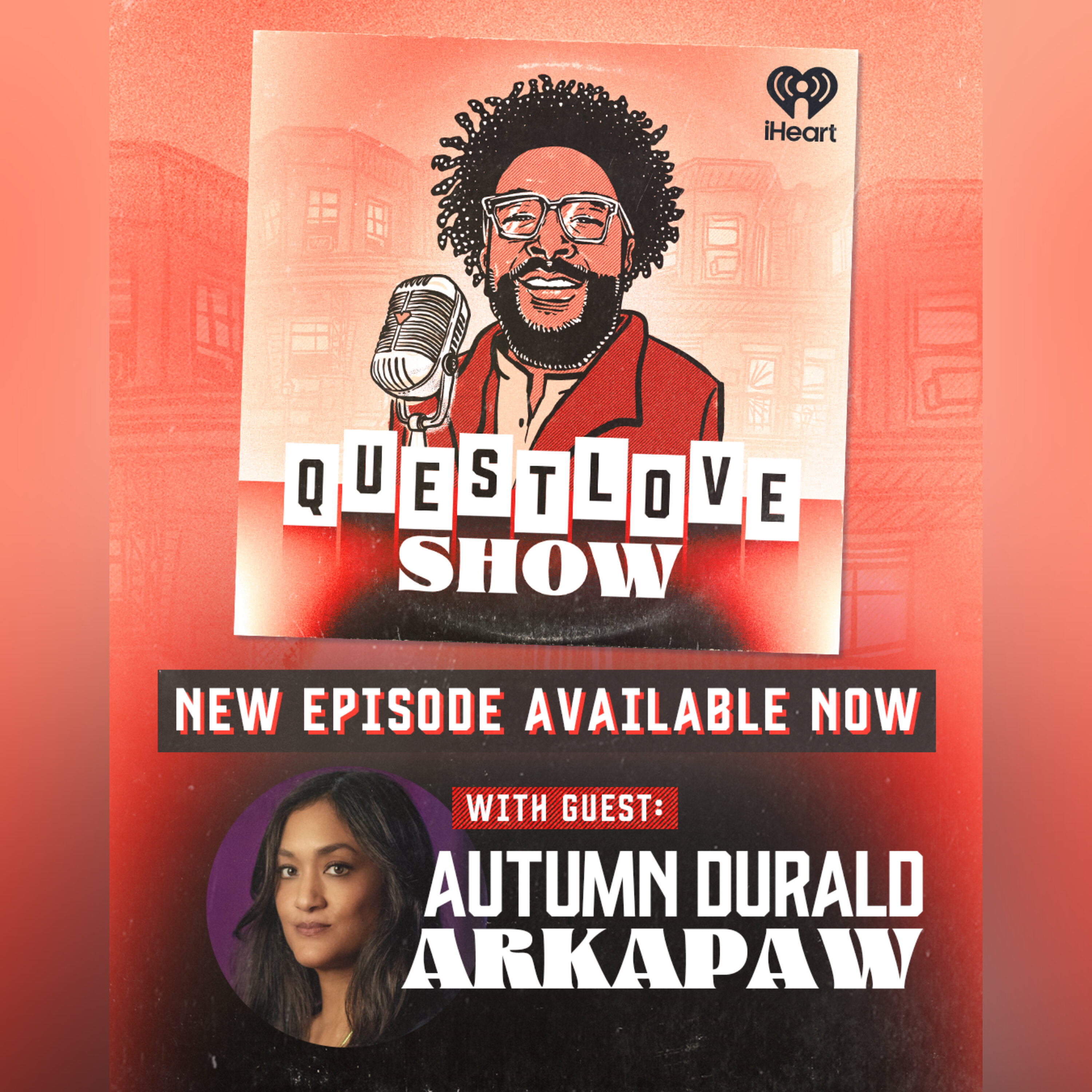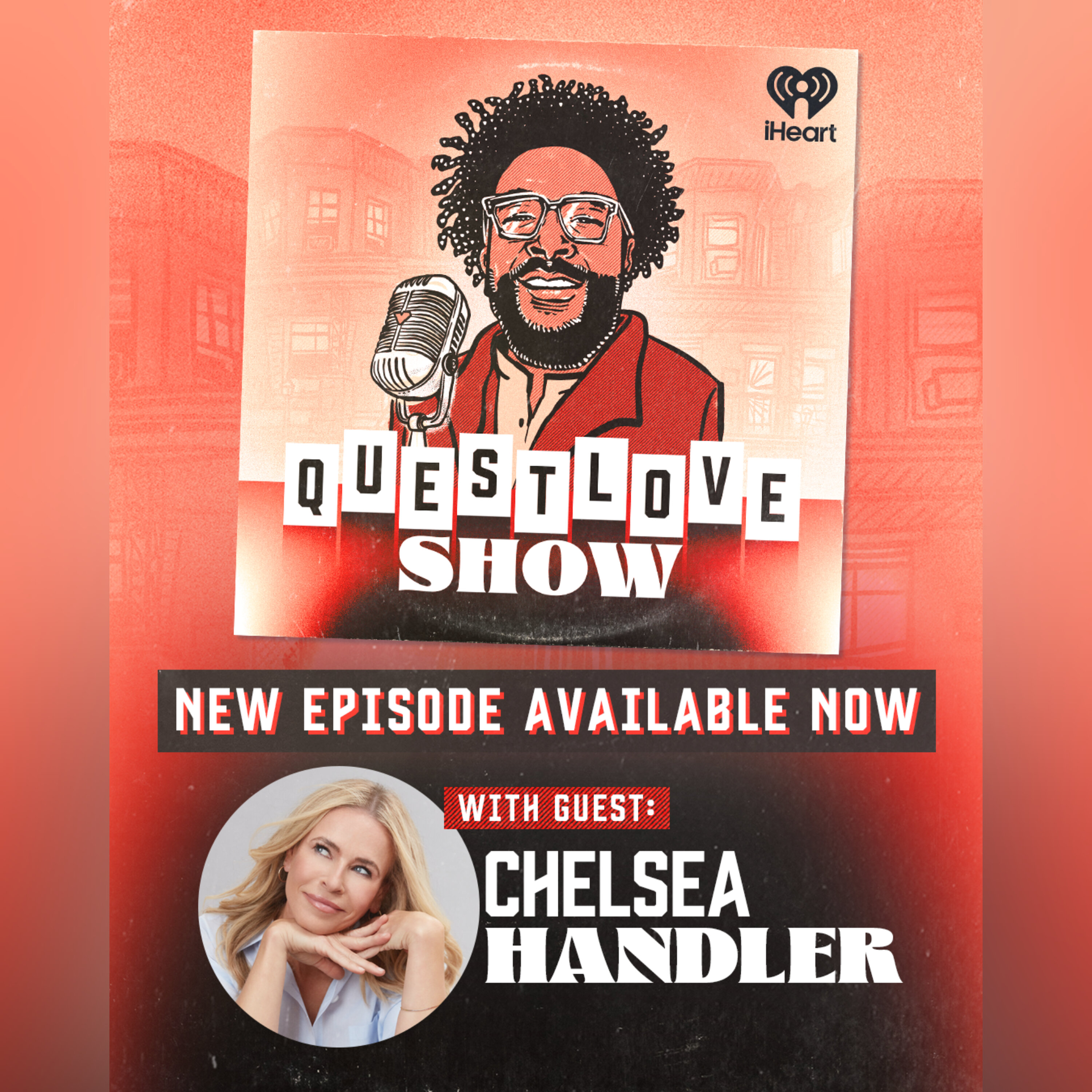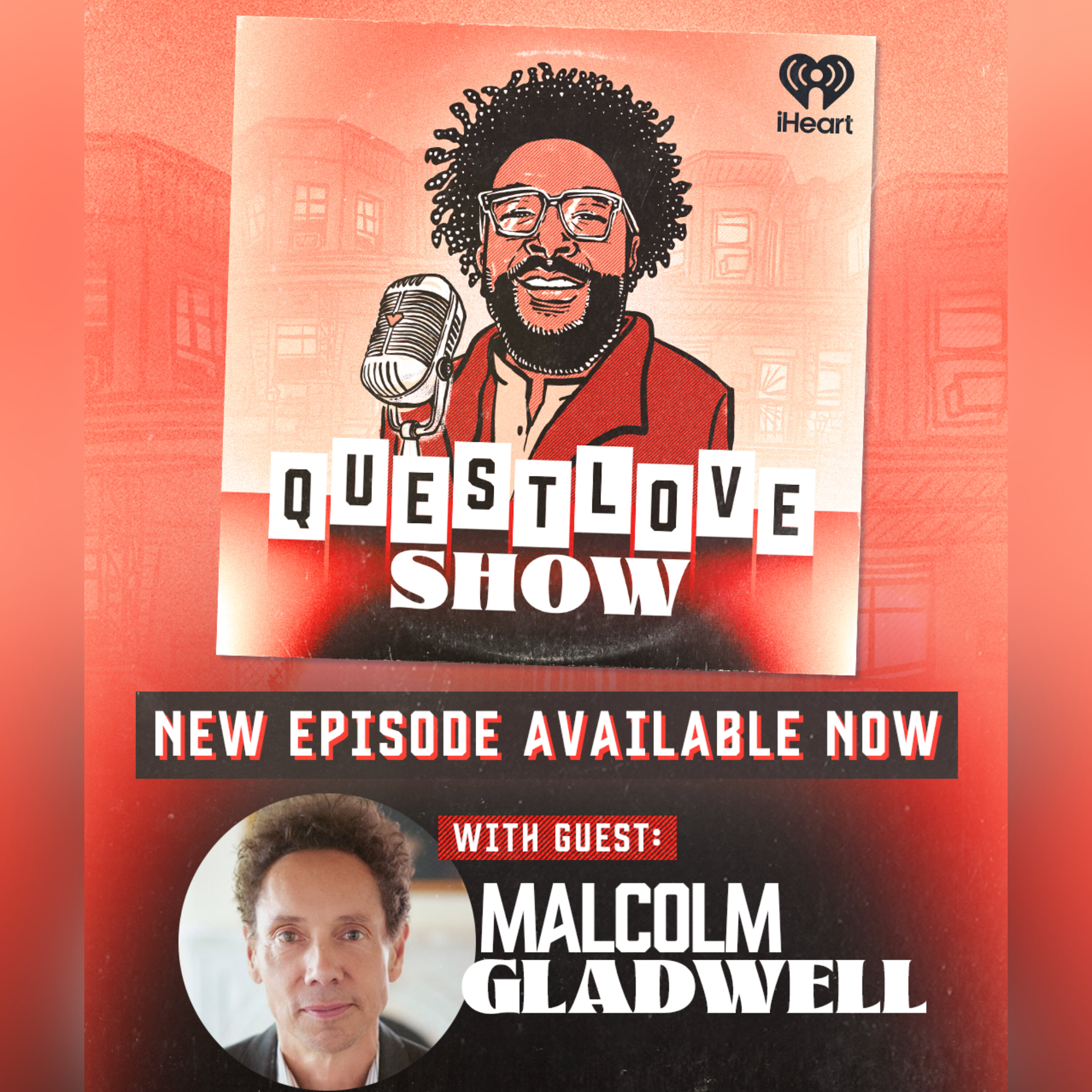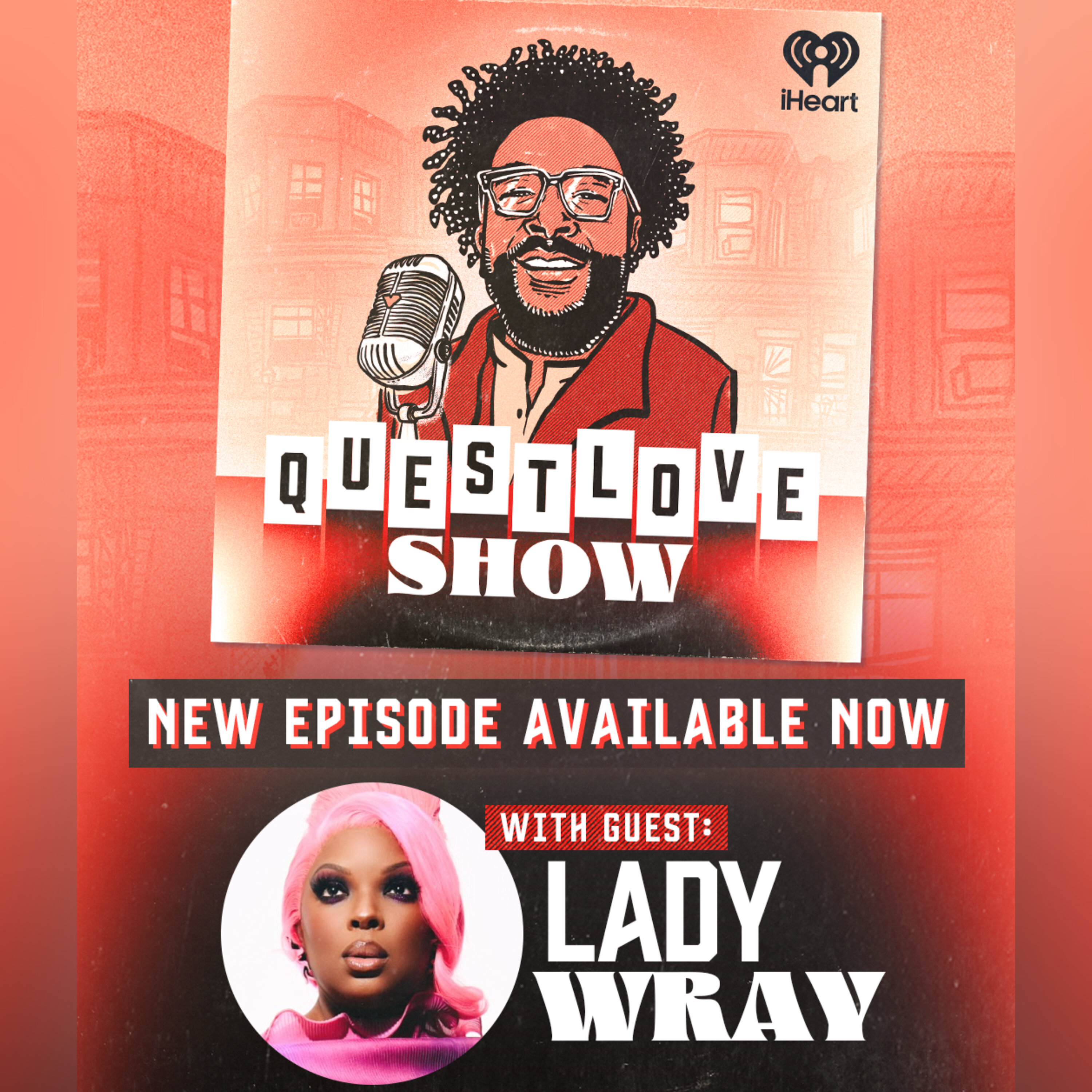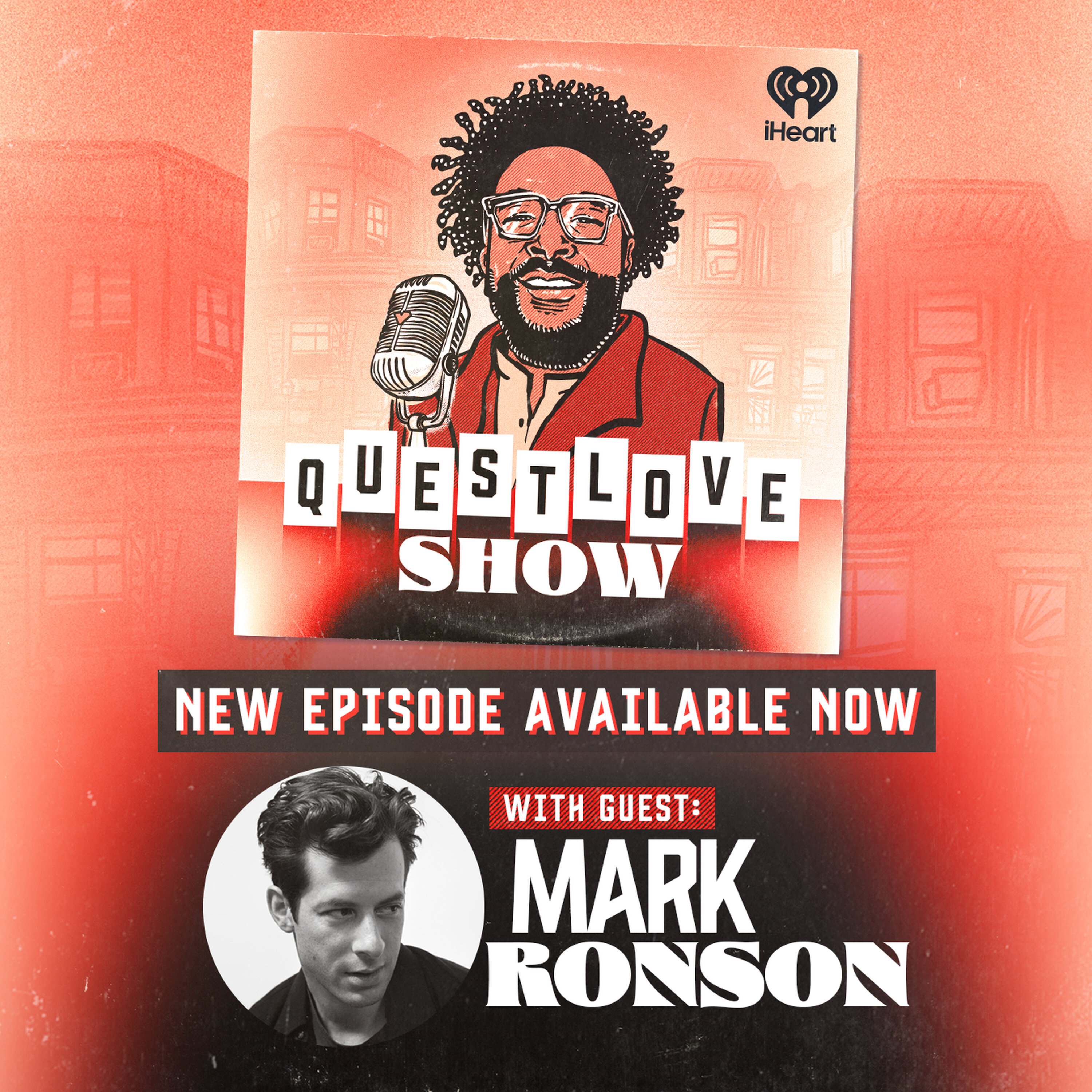The Foreign Exchange
Nicolay joins Phonte as The Foreign Exchange to speak with Team Supreme in-studio. This conversation celebrates the 20th anniversary of F.E.'s beloved debut album Connected and the 25th anniversary of OkayPlayer, where this duo first met and formed. The special discussion revisits the message board days and reveals why Nicolay and Phontigallo still honor their original formula. The episode also follows Nic's music-minded journey from the Netherlands to North Carolina, his distinct approach to production, and how The Foreign Exchange was unfazed by Grammy recognition.
00:00:00
Speaker 1: Quest Love Supreme is a production of iHeart Radio.
00:00:08
Speaker 2: Supremo, Rollbrivo Supremo, Roll Call, Suprema Supremo Roll Call.
00:00:21
Speaker 3: Suprivo roll Yo. Is the season?
00:00:24
Speaker 1: Yeah, like I sheared the light. Yeah, I have a good reason yeah to talk about that site.
00:00:33
Speaker 4: Supreval Suprema roll Call.
00:00:39
Speaker 5: My name is Sugar.
00:00:40
Speaker 6: Yeah.
00:00:41
Speaker 5: Is this thing on? Yeah, it just took so long to start. Yeah, my buzz is gone.
00:00:49
Speaker 2: Supprivo Rova Sprevo roll.
00:00:55
Speaker 7: I'm unpaid bill.
00:00:56
Speaker 8: Yeah, and lordy lord, let's talk about Yeah and okay, player boys Suprema.
00:01:05
Speaker 2: So Suprema Spriva spri.
00:01:11
Speaker 1: It's like, yeah, oh my god, yeah, yeah, okay.
00:01:17
Speaker 2: Made us Suppriva Suprema.
00:01:26
Speaker 4: My name is Nick. Yeah, and I'm a cancer. Yeah, I'm good at music, not much of a dancer.
00:01:35
Speaker 9: Supppreval roll Suprema Supremo Role called.
00:01:43
Speaker 6: My name is Fante, Yeah, and I won't be boring. Yeah and him had in exchange.
00:01:48
Speaker 2: Yeah.
00:01:48
Speaker 7: Now I'm whipping a form ship.
00:01:57
Speaker 2: Suppriva role suprem Subpremo, who call subprim.
00:02:08
Speaker 7: Wow, we did it?
00:02:09
Speaker 6: Like, no, it is a Japanese exactly, I mean it's technically a foreign but yeah, yeah it ain't Germany.
00:02:19
Speaker 7: I don't know.
00:02:20
Speaker 1: I don't wait what what what kind of car you got Alexis?
00:02:25
Speaker 6: Oh god, yeah yeah it isten't me great gas mileage?
00:02:31
Speaker 10: Toyotas are the best?
00:02:32
Speaker 7: Yeah, man, you right it think?
00:02:34
Speaker 1: Hey, I just got my sign I fixed. I'm still hanging on what it is the twentieth anniversary of me getting my drivers like this?
00:02:46
Speaker 3: What's funnier the Quest Love and the Scion?
00:02:49
Speaker 7: Not much? I don't know.
00:02:50
Speaker 1: I don't know the answer, Like, am I driving a classic car now that I've been driving.
00:02:54
Speaker 7: The sign for twenty years?
00:02:56
Speaker 2: Yeah?
00:02:56
Speaker 3: Don't even make that car?
00:02:58
Speaker 7: You don't? Yeah, I don't think. So how do you get it serviced?
00:03:01
Speaker 1: So the guy that drives me around now he has a hook up in the heights where they got thing. Yeah, there's a lot of garages up there in the heights.
00:03:14
Speaker 7: Yeah, and uh yeah, shop shops understood.
00:03:20
Speaker 1: Let's just say that I'm good for at least maybe nine rounds of kneeding batteries.
00:03:25
Speaker 3: And this is a hell of a way to start this episode.
00:03:29
Speaker 7: We are live in New York. Well, we're not live. We're in New York City. We're in person.
00:03:34
Speaker 1: Yeah, good to shout out to take a little for getting up early this morning.
00:03:40
Speaker 3: And I hear that you say that you did not get sleep.
00:03:43
Speaker 7: Not really, we didn't.
00:03:44
Speaker 6: We didn't really we had uh yeah, I got in this morning. Yeah. We had a movie that he scored. We had that yesterday. That was it Full Frame Documentary, Full Frame Festival. So that was like all day yesterday, and then we rolled out six this morning, got here like eight.
00:04:00
Speaker 7: Okay, it's been up ever since.
00:04:02
Speaker 1: Well since Fonte already assisted us on that, we might as well introduce our steam guest. And I guess you can say that this is a special episode because of course this being five years, yes, twenty twenty five five, right, so being as though this is like twenty five years of what okay Player is, I guess we're still trying to define what okay Player was.
00:04:29
Speaker 3: But if there was ever.
00:04:31
Speaker 1: A moment, I wouldn't mind flexing the very played out what a time to be alive hashtag man, I would say that probably Okay Player is one of those moments in which I think everything that I intended it for that site to be actually came to fruition, which is that people connected with each other way above than that just being a roots website, but people were able to do that and probably one of the most pioneering moments that will have defined how it is that we make music and how we stretch. You know, before Okay Player, like I lived at a time when you went to Europe that was Europe, when you did things in the States that was like now it's colonized and stretched out. And the fact that you know the storied journey of how Fontigolo and Nicola met and hooked up one Okay Player, you know even that this is a dream interview for us to finally get you guys, because you're such a YouTube to me, are are the actual physical result of what happens on the internet when it's a good thing.
00:05:41
Speaker 3: Yes, many different ways.
00:05:44
Speaker 5: I just want to point that I'm not saying.
00:05:52
Speaker 3: Nothing else, so that's a welcome.
00:05:57
Speaker 7: Appreciate it.
00:05:58
Speaker 1: It's weird, I know, the legend of foreign exchange. Hopefully this will be what I initially intended the Jesus a Mural episode to.
00:06:09
Speaker 6: Be before today, before it went totally left.
00:06:15
Speaker 1: Maybe if you guys aren't familiar with that legendary episode. There's a lot of inside baseball talk about what Okay Player meant as a community. This hopefully will be a more nuanced, better version.
00:06:27
Speaker 7: Of that episode.
00:06:28
Speaker 1: So Jesus a m though that was definitely that to me is one of like are the funniest moments, at least for me, even though it was a lot of inside.
00:06:36
Speaker 3: Baseball Nikolay, what is your first musical memory?
00:06:40
Speaker 4: My first musical memory is hearing Secret Life of Plans by Stevie Wonder. I credit a lot of my musical interest and taste to my mother's music collection, and I have a distinct memory of being I must have been five or six years old and feeling the braille on the cover of Secret Life and Plants while taking in the sounds, and I think, looking back, the synthesizer pioneering more so than anything else, ecclesiastic and some of those create like that had a massive influence on me.
00:07:15
Speaker 7: And that must.
00:07:16
Speaker 4: Be one of the first, if not the first, true musical memories.
00:07:23
Speaker 7: That happened sort of before I consciously.
00:07:26
Speaker 4: Got into music and was interested in music, and like, shout out to my mom for that.
00:07:30
Speaker 7: How old were you in nineteen seventy nine, I was five years old. That's so crazy.
00:07:35
Speaker 4: I'm a seventy four shout out to all the seventy four babies. Yeah, I distinctly remembered that record. Like now, I would argue with people a lot about songs of the Kiya Life versus Secret Life of Plants and how they were kind of back to back right and so different in so many ways. And for me, I never had that connection with songs that I did with Secret Life Plans for the very and that it hit me so profoundly as a kid, and I have a specific memory with each of the songs with Black or Kid We'd comeback as a flower with Tree Race Babblin, Like I think it really shaped me all right.
00:08:13
Speaker 1: So just to give our listeners just a little backstory, because I had the opposite experience that you had, even though you and I had the same shared experience, you know, like when the classic hip hop records came out and we discussed it on an OK player, and then it would be like nine hundred threads of just like that happened before the Internet and especially in my household in which there were so many musical experts, a Stevie Wonder record actually had the power to make someone have like almost a four hour summit meeting like the day as songs in the Key of Life came out September of seventy six. Both songs in the Key of Life and Spirit by Earth, Wind and Fire came out the same day.
00:08:57
Speaker 3: And that was also the first day of school for me.
00:08:59
Speaker 1: So, like you know, that day was like a major event, Like we got home early, we sat as a family, sat in front of the record player to see, like what the else because it's two years since Fulfilledness first finalite. So it was such an event in my household that come three years later in seventy nine, when we had that same anticipation opening the record and listening and man.
00:09:22
Speaker 3: To watch it with my set, to watch my father's face during the Earth's creation.
00:09:34
Speaker 1: Yo, I just I've never seen my dad cry until maybe like nineteen eighty four at a funeral. But the day I saw the day that music died for my dad, and it was such a heartbreaking, like he just looked at the floor like I've lost.
00:09:52
Speaker 7: Hopeing to humanity.
00:09:55
Speaker 1: But for me, any albums that were rejected by like my dad's band or then I would wind up inheriting. And so I inherited that record and so just like you, that was my dark side of the Moon, like, yeah, mainly because it's like, oh, it's on my own and I would listened to it in the headphones and yeah, imagine.
00:10:13
Speaker 4: And I loved everything about it. I loved the photo of Stevie in the booklet. I love the fact that there were Japanese lyrics. I didn't know what that meant at the time, And then I think I asked my mother, like what is this and the lime green cover or if I have to describe it, maybe almost pistel like it was. So it wasn't just the music, It was the totality of that record, and it wouldn't have happened on it was vinyl.
00:10:39
Speaker 7: It was just a big, beautiful.
00:10:41
Speaker 1: The one time I realized that there was such a major pushback on that record, like besides, I would dismiss my dad's thing, like him shit talking about Stevie lost it.
00:10:50
Speaker 7: I'm so disappointed. Was like when I started going back.
00:10:53
Speaker 1: To read reviews and it got a lead review and Rolling Stone and they just they just talent. It's almost in a way, like I don't know if I should be this honest about it.
00:11:07
Speaker 3: When Glover's Camp got a one point nine and.
00:11:10
Speaker 1: Pitchfork, oh okay, there was an energy shift between he and I and almost felt like that devastated him so much to know that I knew about because I instantly hit him like, yeah, man, don't.
00:11:21
Speaker 7: Like it, right, but I certainly have a view.
00:11:27
Speaker 1: But just until like maybe three years ago, I truly let the opinions of a critic go okay, you know, I didn't go back to look at the movie like none of that stuff, like I'm just I now make art because like I want to make beautiful art and not like, oh.
00:11:41
Speaker 7: This will keep our rating high or whatever.
00:11:43
Speaker 1: But I didn't realize how much of a beating he took for that record.
00:11:49
Speaker 4: Me neither, and in fact, like I weighed everything that I heard by Stevie after that. I compared it too secret life and it didn't always live up to me. But because of like and I think, like we could talk about this later, but like my love for synthesizer pioneering, what what Stevie was doing with the with the c S eighty on that record, Like I think it's looking back, it's clear why the larger public didn't really get it, but for the nerds, if you will, like it checked all the boxes because he was going further, and but I still think it had like come back as a flower is up there for me, Flowers for me, that black work.
00:12:32
Speaker 6: That's the only record I can think of that Stevie singing falsetto win. I can't think of no other song that's good. He's not right, Yeah, he's not right. Yeah, I've never heard him sing falsetto on nothing Nose.
00:12:43
Speaker 4: So when I when I heard songs after that, I was like, yeah, it's cool.
00:12:47
Speaker 3: You discovered songs proactively.
00:12:49
Speaker 7: Yeah, anything like.
00:12:50
Speaker 4: I think the second thing I heard by Stevie was the musical of the Concoration that had original and it had like living for the City. I think it was like, all right, this is I'm hearing more of what I like. But like everything that I've heard after, and it's largely probably because of the warmth of the memories involved with it, everything thereafter didn't quite have the same magic for me.
00:13:16
Speaker 1: So now that I hear this, it makes even more sense. At you guys that man, the day you guys covered he if she breaks your heart to me, like, I still have a dream that somehow if the masters of the Jungle Jingle soundtrack bro get free. I have such a dream of just hearing that same I've never heard an album which song structure. I like it a lot, but if he changed the instrumentation on it like that, he could have pulled the winehouse. But I don't know if like Okay, if he did a fulfillment first menalitey or whatever like sonically made it sound like that would have had the same impact. But hearing you guys like update his sound but still keep ah Man.
00:14:09
Speaker 7: This is a beautiful song.
00:14:10
Speaker 6: Man, I just thought it needed to be updated, like, but it's a great record.
00:14:13
Speaker 7: I love that song.
00:14:14
Speaker 1: So let me ask for you guys the point where I realized that Okay player was just bigger than a website for some acts to post announcements on.
00:14:25
Speaker 3: You also just have to sift through.
00:14:30
Speaker 1: The many personalities, because you guys are on a constant blind date. Like there are many people to whom I've had interactions with that you know you can't see what they look like or you don't you know, I don't know what trolling is or none of that stuff. But you guys have to find each other because even in my mind, even though you are definitely a charter member, I do have at least in my social circle. I have a like an inner circle like around one, around two, and you always around three person like even though we talked a lot, not to the level of no for sure.
00:15:04
Speaker 7: So how did you two meet?
00:15:06
Speaker 10: Yeah, it was I think this was back in like it was two thousand and what two.
00:15:09
Speaker 4: Yeah, I think a one one sort of found each other in the same in.
00:15:14
Speaker 6: The same type of jazz. So with him, like, and I didn't know anything about this guy.
00:15:19
Speaker 7: I didn't know. We would even joke with the.
00:15:22
Speaker 10: Crew like it was Nikola is the girl the girl.
00:15:25
Speaker 7: Like we you know, it was just a name on the screen.
00:15:27
Speaker 6: We had no idea and so but I think I feel like I remember it was a radiohead topic and and he jumped in the thread. But I just kept seeing him in threads, and I would notice that he had a lot of the same taste that I did, Like we liked a lot of the same shit.
00:15:41
Speaker 10: And so I was like, okay, I kind of fucked with him.
00:15:43
Speaker 6: And so then one day he just came and was like, Yo, this is a new track by me, and I'm like okay, And so I listened and I was like, holy shit, this is amazing. And I reached out and I was like, hey, man, would you mind if I did something of this? You know, we got mczo here like what you know? He was like, nah, man, go for it and so famous d M.
00:16:04
Speaker 7: Yeah, yeah, hit.
00:16:07
Speaker 6: And so the first time we did the first record was I think was it lighted up?
00:16:11
Speaker 3: Was that the first Yeah, that was the very first one lighted up?
00:16:13
Speaker 7: And Nick's groove was a two for that we did.
00:16:16
Speaker 4: And if I may rewind, like I think for me, I think I might have a unique perspective on Okay Player as a European.
00:16:24
Speaker 3: Yes, I want to know Cony like it.
00:16:27
Speaker 4: Was sort of finding connection with this completely different universe like I saw you.
00:16:36
Speaker 7: Okay.
00:16:36
Speaker 4: I bought Voodoo in two thousand and two. It must have been in April, right, something like that.
00:16:41
Speaker 7: It came out in January.
00:16:42
Speaker 4: Okay, Well I may have been late, but either way, like I was familiar with the Roots, but I hadn't really ever heard full albums. I was familiar with Common, but Voodoo was Voodoo brought me to Okay Player because I looked at the booklet and it said okay Player and I had no idea. So you brought me to Okay Player. That summer I saw you guys twice on the Voodoo tour, once in the Hague for the North Sea Jezz Festival's and once in Belgium, which was an open air daytime show. Didn't Third Base open up for us, I don't remember that. I know Slum Village open for y'all in Belgium.
00:17:16
Speaker 7: It wasn't with JD, but it was.
00:17:19
Speaker 4: But it was a religious experience in many ways in Belgium, specifically because it was during the daytime, so it was a very It hit very directly, and I remember you guys hitting send it on and I was crying, like I'm not saying that just to blow smoke.
00:17:32
Speaker 7: It was that.
00:17:34
Speaker 4: And so like two thousand is when I learned about Okay player. But then it took me a while to get to the boards because that was sort of the second layer, you know what I mean. And it took me a while to get to the boards, and then it took me a while to go from lurking to posting. I signed up, I got to use your name at that point, I was going under Nicolay, which is my first name. I have three I was baptized, I have three first names. And it seemed like the most international sounding one, So I registered that knew that Nicola Music user name.
00:18:07
Speaker 7: What if they call you back home?
00:18:09
Speaker 10: Yeah?
00:18:11
Speaker 4: Well yeah no, Matthias is like what I kind of would the person behind the you know screen, I guess the man behind the curtain. But so it took me, I think a year maybe to go from discovering the site to realizing that there was the lesson, particularly like I've never been on any of the other like I was specifically like I didn't really do General.
00:18:32
Speaker 7: I didn't really do so the lesson.
00:18:34
Speaker 1: So he's basically saying that to our listeners out there, we would have boards, and the boards was like a playground sub section or yeah, like a nightclub.
00:18:42
Speaker 6: And then the lesson for the snobs, the music snobs.
00:18:46
Speaker 1: I was on the lesson, Yeah, more than I was supposed to be on like the General General the okay artist.
00:18:53
Speaker 7: Like nobody went okayist.
00:18:57
Speaker 3: Newbies would go there like you know, is this really you?
00:18:59
Speaker 7: And that sort of thing.
00:19:00
Speaker 3: But yeah, people either went.
00:19:01
Speaker 1: To General when they were trying to get something yeah yeah, man right, And the lessons were for like the dweeps.
00:19:11
Speaker 4: And so for me, like just in Europe, I didn't have connection with a lot of people that liked the music that I liked for a variety of reasons. And I'm not really sure why. You earlier asked like, what was my first interaction with hip hop? And it was actually Three Feet High and Rising eighty nine. I guess yeah, and that like I was, I was kind of a metal head before that time, like ironically, but something about sampling really appealed to me. And so I heard three Feet Rising and then I started getting into you know, the first Tribe album and stuff like that. So by the time, like fast forward ten years, I'm full on and so I didn't have a lot of people around me.
00:19:52
Speaker 1: Can I ask something, yeah, yeah, yeah, and you can educate our viewers. Okay, So of course now because everything is colonized, you know, if Drake is to release a song, we're all going to stay at the same time. Can you explain what the process is like before the internet and how it trickled down and got to you.
00:20:10
Speaker 7: So in ninety the early.
00:20:14
Speaker 4: Nineties to maybe mid nineties, we started getting Yo MTV reps on the European MTV and that is when so it was I want to say a nightly and then on Saturday they had the Fab five Freddy Hours or whatever, right, and so I just started watching that and so anything like it wasn't like we had a lot of that on the radio. There was a hip hop show that every week would play like, you know, I remember hearing Come Clean for the first time, Jay Ruin, you know, like ice Cube and stuff like that, but it was jo MTV reps and then seeing everything like the leaders of the news school episodes, the all like I was taking all of that in.
00:20:57
Speaker 7: Yeah right, yeah right, what you say.
00:21:02
Speaker 4: Yeah, So it was like to TV, I guess and and just I don't know, I ate all that up. But at the same time, I was kind of like I had a best friend in high school was also very like his favorite stuff was duck Down, Like he was super into like UGK and all that stuff. And so together he and I went to hip hop shows in Amsterdam at the Paradiso, saw like stuff like Onyx and what. We went to all of the shit that we could find stuff my bad really so yeah, so okay, Player for me was literally a direct connection to the culture that I really really was interested in.
00:21:46
Speaker 1: This is the thing I've had conversations with people the nineteen eighties generation that got hip hop, like to hear Mooney Love describe that. She can hear her voice on those Public Enemy interludes on it Nation of millions, you know, like the the interstitials of which they're doing the top of the Fresh what are the who's the pump masterflex of the UK? West Woods Wes Yeah, Tim Westwood Show. Like if you listen to that funky drummer loop, somebody anybody scream here the girls scream.
00:22:17
Speaker 7: Himoney you love?
00:22:19
Speaker 1: That's her voice, like so to hear an eighties generation describe that. But we can all attest, especially Fonte and I, that there's a different type of hip hop fan like post ninety four but post ninety five that you fall under. And the thing is that I noticed and a lot of artists, especially now Jay, were the damage of had to move to Europe just to make a living.
00:22:46
Speaker 3: So yeah, lives there now?
00:22:48
Speaker 1: Oh really because that's like yeah, but it's it's a lot of acts that.
00:22:52
Speaker 7: Are doing that.
00:22:53
Speaker 1: At any point, did you realize, like really the essence of the hip hop that you that attracted you, the perceived on the ground thing. Did you have any clue whatsoever that that that's really a culture that is tailored for Europe, like there was no place in the United States in which like the Roots could sell out the Parisian version of Massive Square Garden La Zenith.
00:23:18
Speaker 7: Yeah you know what I'm saying. Yeah, yeah, where prints played like a bunch of times.
00:23:21
Speaker 3: Yeah, you know, not at home.
00:23:22
Speaker 7: We can't do that right.
00:23:25
Speaker 1: At any point, did you realize that that level of hip hop like that was the true home of it or did you still think of it as an American thing like I looked at it. What did you think we were doing in America at the time.
00:23:34
Speaker 7: I didn't pick up on that, Like I didn't.
00:23:36
Speaker 4: I wasn't raised on you know, the classic run DMC stuff or something like that. I had no clue like I, Like you said, I came on board in the early nineties, but my true fandom was like ninety five, ninety six all the way up to two thousand, when when I bought like stuff like like water for chocolate, which was a and I don't think I realized that if in fact, I felt kind of isolated over there, specifically musically, because what I liked was in my group of people perceived as American, Okay, not even my sound. When I first started making music. A lot of people over there felt it was kind of slick and a little American, and I didn't realize at all later like, now, what you're saying makes perfect sense, But for me at the time, it was an American thing, and it I think subconsciously realized that if I wanted to make music like that, I needed to connect with Americans.
00:24:38
Speaker 7: That's weird.
00:24:39
Speaker 1: So the slur word over there is it sounds America, whereas that same type of music here, I think they would just say, like, oh, that's soft, you know.
00:24:46
Speaker 3: Yes, smooth, emotional. Yeah yeah.
00:24:49
Speaker 7: Over there, like.
00:24:50
Speaker 4: The type of hip hop that exists there natively is more abstract, you know, it's not necessarily purely musical per se, but it's very aggressive and lot of it is local language based.
00:25:02
Speaker 1: At this point, who was the biggest local artist that had the biggest poll over.
00:25:06
Speaker 7: There, That's a great question.
00:25:08
Speaker 4: I didn't really listen to any other because, like I, you know, a lot of them were Dutch language artists, and I never thought that sounded very good and that was probably a little snobbish of me, but I really liked.
00:25:21
Speaker 3: Was everyone trying to be like DJ Premiere or.
00:25:23
Speaker 4: Like even even more abstract, just not really any people, maybe like Company Flow or.
00:25:31
Speaker 3: Some stuff like real Deaf Jus.
00:25:34
Speaker 4: Not definitely not what I did. Definitely not with like chord progressions or like baselines that fit the key or.
00:25:43
Speaker 7: Let me let me, let me just let me clean it up.
00:25:46
Speaker 1: I'm a massive fan like cannibal Ox, like the first generation.
00:25:49
Speaker 7: I didn't mean that as I meant that more style. There's always one troll that's going to be like no, no, no. I definitely didn't mean that.
00:25:57
Speaker 1: I don't want to Detroit singer effect.
00:26:04
Speaker 7: To myself.
00:26:06
Speaker 4: Now, I guess I mean it more as a style that is more marked by a certain level of expression versus like again, like when I heard like Water for Chocolate like production Wise, or when I first heard Fantastic Volume two, or even when I later heard Things Fall Apart, which was a little bit later.
00:26:25
Speaker 7: For me, or Voodoo.
00:26:27
Speaker 4: Those were the albums that made me realize like, Okay, so you can make hip hop and make it beautiful versus you have to make hip hop that is aggressive. Not that there wasn't you know what I'm saying, but like it was for me a realization because when I first came into contact with hip hop I had a very naive understanding of like, there's a guy with turntables who is making the beats, for instance, Tribe Cold Quest. That's how I sort of saw it. You know, you have it's making the beats with the vinyl. And it wasn't until later that I not, like, Okay, there's actually people doing this that are more musical inclined. And so that was for me sort of like really kind of the eye opener of like, Okay, I understand now that there's something that I could contribute to this music.
00:27:22
Speaker 1: This is real important for me to hear that, because there's part of me that has this negative slash glass half empty view of how the community sees the music. And for the most part, I always felt like whatever nariety that we got, we were only chosen because we weren't gangster rap. Like the amount of times that someone will performably come up to me backstage to differentiate themselves like yo, man, like I like y'all because you know, y'all don't be killing bitches, y'all don't be so with drugs like and y'all don't care about success, you don't care about getting paid.
00:28:07
Speaker 7: Definitely wrong. So again the idea. And that's the thing.
00:28:10
Speaker 1: I know in their mind they're thinking like, wow, they're trying to give me a quotable that I remember, like yeah, that one fan and Boise Idaho that just like me and looks right, And really I only walk away thinking like, man, they just they hate Snoop Doggie Dogs, so they only like us because we're the opposite of that, which is really not saying you like, So this is like one of the rare times in which like I felt chosen. Yeah, yes, I know that for everyone to be on OK player.
00:28:43
Speaker 7: But then.
00:28:45
Speaker 3: Because of just you know, an artist being.
00:28:48
Speaker 7: Over analytical and.
00:28:51
Speaker 1: Self deprecating for me, like the fact that I allow people just slander us and talk shit over there more or less about me just feeling to justify like my non deservedness. But I will say that this is a really good time for me to hear that, oh, someone actually just liked the music and gravitated towards.
00:29:12
Speaker 4: Not only that, but it it made me feel like I had something to contribute, Like I wasn't a DJ. I've never really truly done vinyl. I'm an instrument guy. I started out playing guitar, bass, drums, some keyboards, and so I had always played in bands. I didn't have a beat making background in that sense. But what I heard in those records, y'all's records, the common was musical layers on top of drums. If I had to just put it very basic, that told me that there was a place for a musical approach to production. To me, like it wasn't just about two turntables, but like added keyboards, added guitars, added like basically whatever y'all I would like, you know, road like obviously the roads ear candy. That made me think like okay, wow, like I can actually probably contribute something to this.
00:30:10
Speaker 3: But did you realize that?
00:30:12
Speaker 1: Because the thing is is that at least back then if I'm going to Europe the same way that you got to fill up your gas tank like I know in Prime Roots time in ninety five, ninety six, in two thousand and one, two thousand and two, that I'm going to go bend shopping with Dyles Peterson or do.
00:30:33
Speaker 3: A lot of I'm almost certain I still.
00:30:35
Speaker 7: Believe to this day I had.
00:30:37
Speaker 1: I did like two thousand dollars worth of record shopping in Amsterdam, and I think the records are still in their basement because.
00:30:44
Speaker 7: I forgot to nail at home.
00:30:47
Speaker 1: But like I would have to go to Europe and to these these whatever, the cosmopolitan European, westernized European cities to get the music that's going to help me make the music that's crazy that you think is coming from America, but really like it's coming from you. It is those obscure bands from Holland or the frog rock groupers. So at any point is it registering to you that you're actually kind of at an advantage where you live in the place where a lot of taste makers, the Giles Peterson's of the world, are exposing you all to music that otherwise only very few people are doing it in the United States right now.
00:31:27
Speaker 7: I think it's a great question.
00:31:30
Speaker 4: Actually I don't think to that extent, But like there were a lot of Europeans trends of music at that time happening that I think I was influenced by that gave me a leg up over here, like for Hero in UK, like jazz and Nova in Germany, like some of the more down tempo stuff in France. So when when I put my music out to the world in the States, people said it had a European feel, and you know, again ironically, back home, people were saying that stuff sounds American.
00:32:04
Speaker 7: I had no idea.
00:32:05
Speaker 4: I think I perceived all of this music as as purely American, and I don't think I had this sophistication of knowledge at the time to realize that it was kind of a full circle that's really places where.
00:32:19
Speaker 7: Yeah, no, not at all, not at all.
00:32:21
Speaker 1: So did you think like we were like on America, having like, you know, poetry slammed me like everything that you.
00:32:28
Speaker 7: Talk about.
00:32:31
Speaker 1: Journals on the capreia, Like did you think like we were just like, you know, cutting up coconuts?
00:32:36
Speaker 4: And I don't think it was erratic, Sam, but I definitely heard I think maybe it was because of the perception of the Roots as a band. I heard something that was not a guy on a beat machine. I heard a more richer kind of sound that made me think like a lot of it was played by instruments. And again the instruments is what appealed to me because I didn't know how to make a beat, but I knew how to play a bass guitar, you know what I mean?
00:33:09
Speaker 7: Like, how far were you from Amsterdam? So I grew up in Utrecht, which is.
00:33:13
Speaker 4: Half an hour where the you would call it a suburb of which is Atrat used to be. It's a thousands years old city that used to be a Roman outpost.
00:33:24
Speaker 1: But it and that's where the North Sea Jazz festivals hill, right or No, that was in the Hague and now I think nowadays it's in Rotterdam.
00:33:31
Speaker 4: They moved it from the Hague to Rotterdam. But I went to school in Amsterdam because that was the thing that you did. Like when I finished high school, I went to school in Amsterdam, largely because I didn't know what to do. So I started musicology at the University of Amsterdam and I started going to the Paradiso, which is a venue you would be familiar with. Yeah, that was you know, we got a lot of great Like I remember seeing Wu Tang for the first time they were in Holland and.
00:33:58
Speaker 1: Asked a question, Yeah, okay, as a Holland resident, how frustrating was it for you?
00:34:06
Speaker 7: Because here's the thing.
00:34:08
Speaker 1: Now it's twenty twenty four, so kind of perception and the relationship with cannabis and weed. Oh man, now it's like it's it's it's getting nationalized and slowly but surely I think right now Germany's voting to see they'll legalize it totally.
00:34:26
Speaker 3: So you know, the world's open up the rains.
00:34:28
Speaker 1: But like of course in the late nineteen nineties, early two thousand and people's minds like the whole pulp fiction thing that the glorious story of, like you gotta go to only in Amsterdam and Holland, Yeah, can you get fucked up and not get fucked rusted?
00:34:46
Speaker 7: Right? It was great?
00:34:47
Speaker 1: And so as a result, like the amount of shows that I saw, just the amount of artists, because a lot of artists when they start there, you were being toured, they would make Amsterdam the hub. First, go there a few days earlier and go to all these coffee shops and the right and so you know, I do know in my mind a lot of the most adventurous roots shows were in Amsterdam.
00:35:18
Speaker 11: And what's an adventurous root shows ount like it's where they might hit four or five coffee shops before we get on stage.
00:35:29
Speaker 1: So even though the muscle memory is strong, like we've the most closest to freestyle shows where it's just like it's a fish show that I wasn't taking so at least like I could. It was just harder to control the guys as a traffic cop. Oh I was a designated driver, right because you know, Tarik might forget the third verse to mel my Man and then we gotta you know. But I also feel as though those those shows excited me because I didn't know what to expect. So basically, I think I just revealed to the world that what you already knew is like I'm tightly wound, and I rehearse no no, no no, no no no, I'm tightly wound, just in terms of like my spontanees rehearsed as a band, as a band leader. And so I always wonder if people in the audience get frustrated looking at us, like dumb Americans they always get fucked up before they come on stage and now they're falling all over and forget their lyrics. Like I can confirm that, Like, have you seen a good hip hop show in Holland where nobody was so fucked up they couldn't perform?
00:36:38
Speaker 7: Yes, I've seen both.
00:36:39
Speaker 4: So I've seen like Lords of the Underground CIRCA Funky Child, amazing, amazing show. They were focused, they were focused, sounded incredible, like parodies, as you know, is an old church. Yeah, sound can be very finicky there, but it was amazing. But I'm not afraid to relate this anecdote. The first time came to them, Joe apparently like, you know how Paradiso has the dressing rooms in the basement, Yes, you go up the.
00:37:10
Speaker 3: Stairs to the stay the balcony.
00:37:12
Speaker 4: Yes, And and so Jizza apparently was so high that he wouldn't come out of the dressing room, and they brought the microphone down using the stairs.
00:37:24
Speaker 7: So there were a lot of shows where you could tell like it was impacted.
00:37:28
Speaker 3: So you just expected.
00:37:31
Speaker 4: And the thing for people in Amsterdam is like it is legal, so a lot of people don't really bother to partake because you know how that kind of becomes a thing of like, ah whatever. So we were not we you know, I've seen both. I've seen incredible hip hop shows where it seemed like and and maybe they were still but like but but largely we loved the record so much that you wanted to get some of that. You wanted to get what you loved about the record. And I remember really really great show like Onyx was incredible. Onyx opened up for run DMC because they were being managey at the time and it was down with the and that was an incredible show. Yeah, obviously Cyprus Hill worked out really well.
00:38:17
Speaker 7: In answer them, because.
00:38:20
Speaker 3: You're saying that we, like.
00:38:22
Speaker 1: I enjoyed many of our shows over there, but I will also acknowledge in the same with LA, like all of our LA shows are so high pressurized because you knows in the crowd while I'm black, it's watching you over there, so you're like going on out or showing off, and it's not like the shows that I wish you guys could see, like one of them nondescript shows that we did in Italy or in France that we didn't care about and we just retired and went on state, Like those shows are the best route shows that we'll never get seen. But I always wondered if you guys you're getting think about it going another question I have because the thing is, and this is for the both of you to me, I'm thinking, like I had such a flag planning moment with like, yeah, this this thing called the super Information Highway and the Internet, like I'm bringing a real life magazine or the way that Rozelle described it He's like, yo, man, you just open up your own mall and you're selling stories to everybody to come and do their thing. And that's what okay player is. So I thought that's as far as I could take it. So the day that's someone and they explained to me like I was a sixty five year older, He's like, no, you don't understand. Like they made their music on computer. I was like, wait, you can make a studio like it sounds like I came from battery studios, like a real song like that. So the way that people were explaining to me that you can now make an entire album on your computer and check this out of here. You can email it somebody and they could add vocals, And I was trying to like the way that somebody was explaining to me what it was like, why it was such a big deal that this pairing was happening. It was one of them things where I didn't know what fruity loop even though like I heard you guys mentioned we lose fruity loops. I've never to this day seen fruity loops or like I'm also the guy's just a shame to admit I make records in the old way.
00:40:25
Speaker 3: Hey man, Steve is very cl Steven is smiling right now.
00:40:27
Speaker 5: I've never saw fruity loops either. I really haven't.
00:40:31
Speaker 7: Well, I know that.
00:40:31
Speaker 1: I'm just like you're very glad that I'm very with my pretty much like I don't know that.
00:40:37
Speaker 3: I think my whole record was the same age.
00:40:40
Speaker 1: Yet, So at what point did you guys decide to like, Okay, this worked out? Like why don't we make something of this? Because I would have never even if you did that, Like, can I rhyme over this?
00:40:52
Speaker 3: You never met each other? So how did you know this would work?
00:40:55
Speaker 7: Man?
00:40:56
Speaker 6: It could be music. It was just the music. It was just a belief in the music. I didn't Again, I didn't know him. I didn't know nothing about him, you know. And so finally, you know, we you know, we would just use instant messenger. And at the time we made Connected, I didn't even have a computer of my own. So all that whole how you making your vocals? So how I was doing my vocals? Back back then? We had a studio, I mean, we had our studio. We were recording chop shop, we were making all the LB records. But I didn't have a personal computer.
00:41:27
Speaker 10: In my crib. So I would go to the chop shop do my vocals.
00:41:31
Speaker 6: And then I would either I would mix down the MP three and I would go to my homeboys crib, my man MC. I would use his computer, my man Meetian. He had a pass to the computer lab at NC State, and so he would let us all kind of we would be on some bootleg shit like using his credentials to get into the computer lab at NC State, and I would like log on and be like, yo, bro, I just did this, and I would like, you know, get on im.
00:42:02
Speaker 7: AIM.
00:42:02
Speaker 3: I oul send it to him. How long would it take to email files back?
00:42:06
Speaker 6: It wasn't bad, So it wasn't email because this again, this is prior to like Gmail or any of that shit.
00:42:11
Speaker 7: Sens face, none of that. This is AIM.
00:42:13
Speaker 6: This is AIM instant messenger and you just mail file.
00:42:20
Speaker 4: Yeah, and I think we never shared wave files because that wasn't possible.
00:42:26
Speaker 7: You would.
00:42:27
Speaker 4: He would send me an MP three and then when we were like, okay, this is really it, like he actually snail mailed me some cd some CDRs so that.
00:42:36
Speaker 7: I waved on it.
00:42:37
Speaker 1: Yeah, and you're doing this straight to MP three. Yeah, I'm doing this. I mean's not sending like the drum track and keyboard tracking. Oh no, no, this is just straight two track. So how do you line up?
00:42:47
Speaker 7: Like? Are you lining stuff Jimmy Jam style?
00:42:49
Speaker 1: Like Jimmy Jam revealed that for at least eighty to ninety percent, they never used sympty at all, right, and he would just blend.
00:42:58
Speaker 3: The vocals like when they would do a remix or something. Are you essentially just so.
00:43:02
Speaker 7: Basically I had to beat.
00:43:04
Speaker 4: I had the track, and then Fante would send me a ref like he would do the vocals and he would mail me a ref and then I would essentially line them up using the ref. So I'd be like, okay, this is my session.
00:43:17
Speaker 7: This is what I would literally.
00:43:23
Speaker 4: And then normally it would be like no, I push it back for like a little you know, give it like it was sort of like a trial and error and when it sounded right, you kind of knew like, okay, it sits right, but it was there was no process.
00:43:35
Speaker 1: You would tell them sometimes like nudge the drums back with vocals.
00:43:39
Speaker 6: I would the track out, you know, I would let him do that, but my vocals. You dialitize your vocals to absolutely every time this day, like to this day.
00:43:50
Speaker 7: Nudge to the right. Everything's for for him to the right in the whole world, all the time. Everything.
00:43:55
Speaker 3: Yeah, man, that's.
00:44:00
Speaker 7: Know is four frames the right.
00:44:01
Speaker 3: Everybody is four frames the RCT.
00:44:02
Speaker 7: Yeah, I gotta admit though, no.
00:44:05
Speaker 1: But but the thing is is that I thought you were on some steph Curry shooting from half court like some of these vocals, you know, the with thieve behind this, And I was.
00:44:19
Speaker 3: Like, yo, yeah, so magular that.
00:44:24
Speaker 4: In many ways he is, but like it was still we would exaggerate it.
00:44:28
Speaker 6: I mean, I you know, naturally I would kind of be you know on it, but but I would always like, kind of nudget it look to the right. But that was how we did the first album. So he was he was in the Netherlands and I was in Durham and so little Brother had a show at Parody. So this was what they didn't get high. Yeah, we didn't get high, save that we came at Queens Day. I was very high, but we did.
00:44:54
Speaker 2: Uh.
00:44:55
Speaker 7: It was like three That was four four April four.
00:45:00
Speaker 6: That was our first time ever meeting each other face to face. We came over and by that time we had connected damn near done.
00:45:06
Speaker 7: You know, good yeah, we had it pretty much.
00:45:09
Speaker 1: So what was the first meeting like, because I also feel like the reflection of the music, there has to be some sort of social camaraderie.
00:45:19
Speaker 7: Absolutely.
00:45:19
Speaker 6: Yeah, no, man, listen, bro, if you can you know, if you have the level of trust to send your raw vocals to somebody, I mean, that's you know, that's a bond that you know, you know, just regardless of them person not being in your physical space. That's just a level of intimacy and trust that it supersedes, you know, any kind of physical or any kind of whatever, you know, because you're just you're essentially like putting yourself out there and you send it to this guy that you don't know, and it's like, hey, man, I trust you with this.
00:45:52
Speaker 3: Make it happen, you know what I mean.
00:45:54
Speaker 6: And so when we met each other face to face that first time, it was just like, oh right, what up this Nick?
00:45:58
Speaker 7: Okay? Cool? It was like almost like yeah, I saw you yesterday, but I.
00:46:02
Speaker 6: Hadn't, yeah, because because we had literally been working on this album like for months and months, and at that time, you know, that was when LB we were touring heavy, so it was really oh, we just lost the contact.
00:46:14
Speaker 3: Oh, yeah, I was what.
00:46:19
Speaker 7: I got.
00:46:19
Speaker 3: I got it. I got it right, you know, like Kevin Nel.
00:46:26
Speaker 7: Look look at man.
00:46:30
Speaker 6: So we so I was at the mercy of LB's touring schedule. So that first album Connected it took a long time to get done, well longer in a long time back then, but because it was just kind of all right, I get a couple of songs done, then we go on tour for six weeks whatever.
00:46:43
Speaker 7: Come back. How long did it take to make Connect? We started in two.
00:46:47
Speaker 4: We started at the beginning too, and we were done at the end of yeah, yeah, because right then we had that whole.
00:46:58
Speaker 6: Connected leak okay, player off places of course, which wait, the lesson the less.
00:47:06
Speaker 1: But the thing is, how like I'm assuming the entire creations under your yeah, like possessions.
00:47:13
Speaker 6: Yeah, but I mean it was at that time, I mean it was just so loose. I mean, so like we would record, but then at the end of the session, whoever was engineering the session, if it was Name or if it.
00:47:22
Speaker 10: Was Crisis or whoever, like all right, who want to copy?
00:47:25
Speaker 6: And we didn't think anything. It's like, yeah, it's just getting around. Yeah, it was just getting around. So I'm on to a high road and I see like, oh, oh ship is out this even before Lime Wire, I don't even know.
00:47:38
Speaker 7: I don't even know how will people get it?
00:47:42
Speaker 6: It was so see so I'm like, damn, the album leaked, and you know, in my mind, I'm thinking like that Dead in the Water thought it was we always it was like damn. But we saw the response and it was like, well, damn, people really fuck with this. So it really was kind of a it was validation a lot of ways after, you know, it affirmed what we kind of believed that we had. And so when I came back from tour, we did a couple extra bonus tracks. It was like, all right, it leaked, but let's do a couple extra joints. And bb came and we did the deal with them that was like yeah, we four.
00:48:18
Speaker 4: I mean, yeah, well I think if I remember we had to deal when it leaked, I remember thinking like, is this going to be the end of our journey? Like, like do they will the label still mess with us? And it was one of those leaks where the response was greater than the loss of not being new, and so it worked out. But at the time we were kind of devastated by it because like, but leaks at the time were very normal, like jay Z would leak and like you know, like there it was that time of like when people started carrying.
00:48:51
Speaker 7: CDs out of the plan under their belts and shit.
00:48:54
Speaker 3: So it also means that there is like excitement because there's.
00:48:58
Speaker 6: Some people that just it's a million and I'll never hear, I'll never download.
00:49:03
Speaker 7: I think at the end of the day we.
00:49:04
Speaker 8: Took it this track, I was gonna ask just with the track making, like you were, you know, talking about roads and guitars and stuff like what comes first for you. I'm always interested in when people are making beats, is it is it rhythm heavy or is it.
00:49:18
Speaker 4: I think I think the musical idea comes first, and that might be a chord progression, that might be a sample, that might be a bassline, But that's what I built around and drums under, if that makes sense. At the time, it was a combination. I really was interned as Samply, but I didn't have I didn't have an NPC, I didn't have I had a computer and had a keyboard and a bass guitar, and I used a tracker, which is there was a tracking scene at the time.
00:49:49
Speaker 7: Yo, my plug. Yeah, he showed me that ship.
00:49:54
Speaker 6: Dude, it looked like he was about to launch a fucking missile. I'm like, dog, what is this? Like that was when I really saw like the way his brain works is just different, because it's not my plug is a program and I'm not like the super techy guy. But like, we recorded that first album in cool Letted Pro, which is now Adobe Audition, but it was cool Letted.
00:50:14
Speaker 3: That was what we did all the vocals in.
00:50:15
Speaker 6: And it's just a basic just a basic daw So it's you know, it's side to side.
00:50:20
Speaker 3: My plug is vertical.
00:50:22
Speaker 7: So he matrix.
00:50:26
Speaker 6: On the beat and he just starts see all this ship flying. I was like, bro, what the fuck is that? And but that's what he made beats on and I was like, yeah he.
00:50:34
Speaker 3: Did, So is this okay?
00:50:36
Speaker 1: True to the legend of other beat bankers that I know, what was the standard at the time and what Like when I found out that Joe Ron Bombay was making these beats on Sony Acid, like he's really cheap, like my first Sony kind of yeah, what were you using?
00:50:54
Speaker 4: I didn't know what the standard was and my brother, my younger brother, had introduced me to trackers, which is essentially a machine code kind of thing where you can load little wave files in and trigger them by using certain codes. And so it started with you have four tracks, and then they like, all of a sudden, it was a tracks. I think by the time I started working with them, it was like a tracks and at some point you had sixteen tracks of having sounds together.
00:51:26
Speaker 3: See doing a song like Daykeeper with this sort of a keeper.
00:51:30
Speaker 4: At that point I had at least sixty. But yeah, I did Daykeeper like that, I did take.
00:51:35
Speaker 6: Off like all of the first album, all the new kind of record, they.
00:51:39
Speaker 4: Leave it all behind the album. I started getting into pro tools because somebody told me, like, look, dog, like if you need just another way you need to really professionalize or need to was a big word, but like they were like, yo, most of the pros use pro tools, and so I started.
00:51:55
Speaker 1: But like, I don't feel bad now because one of the things that I feel horrible about. You see the smug look on Steve's face, the way that I've been, like I've been, I'm in such a zone with his in game record right now with the roots. But when I tell you the embarrassingly kind of primitive way that I'm building this record. Like, yes, I read how half of Nason and Millions was built by them as an actual jam session, each guy at a twelve hundred manually pressing the samples by themselves, not programming.
00:52:34
Speaker 7: Even the mixes too. They would mix and.
00:52:37
Speaker 1: The Beastie Boys admitted that every sample on Paul's boutique was basically just lined up one by one and then they would just do that. But there's no like programming and stuff, and so like I'm also inspired by, like again, like the whole Sony Acid story and that sort of thing.
00:52:54
Speaker 3: So like I've been like, you're.
00:52:58
Speaker 5: Thinking of the lost Bomb Squad member.
00:53:02
Speaker 3: I just you know, I do.
00:53:03
Speaker 1: But it's just the fact that like James teases me about it, and like sometimes I let it get to me that, see, you're not a real beat maker, like you're actually looping the stuff from your soerrado DJ thing like.
00:53:19
Speaker 7: Exactly. And I think I think I had a little bit of that.
00:53:21
Speaker 4: I guess what you called imposters where you're like, okay, I'm not using the Like I remember the first time I after we met for the first time and connected had been pressed up.
00:53:32
Speaker 7: We met in New York in July of four, and we did.
00:53:36
Speaker 4: Something called Beat Society, which is where producers come out and essentially play their beats. And so I came out with my little leaptop. You did Beat Society, I did. I did Beat Society and Knitting Factory, and that's when of the first time we literally performed together. But I came out with my laptop and I realized like, okay, like like everybody else is using MPCs and I'm just here like as though I'm checking my email, you know, look, you know, right.
00:54:06
Speaker 7: Like craft for it.
00:54:07
Speaker 4: But it was one of the first times where I realized, like, yeah, I had no idea, I had no real knowledge of how the music was made, and I saw I just used what I know. Again, my brother had introduced me to I knew Q base existed and stuff like that, but I didn't know I didn't have that. So it became a weapon of choice. It became my secret weapon because I learned to use it in such a way that I could really make it do whatever I wanted.
00:54:36
Speaker 7: And that was that story.
00:54:37
Speaker 6: I think, like a big part it was really just about using the tools you have, just making do with what you have.
00:54:43
Speaker 7: You know. It was when people would ask like, oh.
00:54:45
Speaker 6: Man, so making the Internet, Like, oh man, making an am that's so crazy, Like it was just this crazy idea.
00:54:51
Speaker 7: And I'm one of those people.
00:54:52
Speaker 10: Yeah, yeah, like dude, he was in the Netherlands, I was in Durham.
00:54:56
Speaker 4: For us, it was kind of we never even thought about it, like we were just like yo, like you, I like what you're doing.
00:55:03
Speaker 7: He likes what I'm doing. Let's do it.
00:55:06
Speaker 1: When you're part of the analog generation though, and I was very much stuck in my ways person I just couldn't fathom, like, wait, I don't see how they're doing that, like emailing stuff at the same time, and like it was just such a storied, uncharted thing, and like when did garage band come out?
00:55:24
Speaker 6: Garage band was yeah, that was later garage band for me personally. I started in garage band two thousand and nine.
00:55:35
Speaker 3: Yeah, two thousand and nine.
00:55:36
Speaker 6: That was when I built my studio at home and so I had we had worked everything, all the old LB stuff, like the first two Foreigners Change albums. That was at the chop shop in Durham and we tracked all those vocals and cool let it and then oh nine, I built my studio up the crib and I used garage band. So like Authenticity My first solo album, Charity Starts at Home. Yeah all that, all those records like those are all garage man, garage man.
00:56:09
Speaker 7: It was, Yeah, it was free. What is it the game changer that people claim that it was or it? Well, I don't know.
00:56:17
Speaker 6: Well, I don't know if I say for me, it wasn't so much a game changer. I think it was just by that time I had learned that, like listen, it doesn't matter what you're recording into. It's all about the signal that you're sending. You gotta in the in the recording process. Really, the recording engineer is god, you know what I mean, because it's not.
00:56:37
Speaker 7: Gonna your your.
00:56:41
Speaker 6: The record the recording engineer, because your song is not gonna rise above whatever the signal is. So, you know, if you got a choice between buying you know, a crazy Mike, a three thousand dollar mic or whatever, but you haven't treated your room first, that Mike is just gonna pick up your room, you know what I mean. So you probably would be better off spending some money treating your room. And you get a little, you know, a little two hundred dollars something and you know, you can make that work. And so that was kind of my approach. And so I started doing those records in Garage Man. And what I liked about it it was very it was simple. And then also when I upgrade it to logic in like twenty twelve, logic is basical garage band on steroids. So how I learned logic was I would take my old Garage Man sessions and open them up in logic and just kind of work backwards and you're like, oh, okay, so this is what reverb is, this is where the delays is, and I would learn it like that. So garage band for me, I mean, you know, people clowned on it, but I made crazy records in Garage Man.
00:57:46
Speaker 8: But logic was around for a long time before it turned into the logic we know today. There was a yeah logic logic that looked that looked what I think is like you're like matrix. It was it was really hard to understand, and that's think there was like a pro tool sequencer, and then finally logic became the visual thing that it is today. And I think that's that's what people liked about Garage Man was we looked at it and it was pleasing to look at and easy easy to you.
00:58:12
Speaker 6: Nah, because you I mean, because you got to think about it, like if you mixing something, I mean, you're looking at that screen for fucking hours. So it was really from my experience, it was really intuitive. It was just very easy to use. And I was not the super techy like engineer guy. I just kind of knew what I liked and just kind of how to get that. And that was it, you know what I mean.
00:58:32
Speaker 5: When do you think you'll ever have enough money to buy pro tools?
00:58:35
Speaker 7: Nah, I'm logic.
00:58:37
Speaker 3: I'm logic to the What was the session?
00:58:44
Speaker 1: Like when you guys are in the same time zone together and in the studio together?
00:58:51
Speaker 7: Wait?
00:58:52
Speaker 3: What no chemistry to this day?
00:58:55
Speaker 7: Now we this is kind like I like, this is the rule of the group. You must emails.
00:59:00
Speaker 4: Yeah, I liken it to prints, not wanting to meet, Like we had such a chemistry going in this way, like I've always explained it to people, like we each take care of our part of the music in such an inhibited personal way that we can fully realize what we have in mind and then we send it to the other person versus like being in the.
00:59:29
Speaker 6: Same room here, right right?
00:59:32
Speaker 7: Or are you sure about that word? Or you know what I mean?
00:59:35
Speaker 4: Like, we always sort of kept it our fifty to fifty percent of the total separate and would send each other, I guess fully realized versions of stuff that we thought could work. And by the time that I came to the States and started my career here, it almost felt like it would really break the magic.
00:59:58
Speaker 7: So we never have like to this day.
01:00:00
Speaker 1: So can you just briefly tell our listeners viewers how you guys built the FI community of like the Cat because it takes a village and obviously, yeah, we're invested in you guys, but also like Zara and Carlita and just how and Zoe, Like how how did the community of musicians come together for these projects?
01:00:24
Speaker 7: Man?
01:00:24
Speaker 10: So, Zoe was someone I actually met.
01:00:28
Speaker 7: Zoe.
01:00:28
Speaker 6: This was in two thousand and five, maybe six h This is right after Mintell Show it came out, and Zoe had been remixing here, did remixes for a couple LB records. And the thing I always listened for for producers when they would remix our stuff. Our stuff had hooks and singing hooks in it, so every producer could always lock in on the rhymes. It's like you can hear it. It's like, okay, y'all got it, y'all match the beat? Okay, cool?
01:00:54
Speaker 10: What this goddamn hook boy to signd? Like, is this ship in the same key?
01:00:57
Speaker 7: Right?
01:00:58
Speaker 6: And the hook would come in and it would just be a fun and you know what I mean. And so Zoel was one of the guys like he had put up a remix that he had did the way you do it, and I was like, that's the way you do it, man, Come on, I hope he fucked this up. I did not know who he was at all, and I just heard it. I was like, oh, he smoked this shit. So we did a show LB show and I think Ann Arbor or something, but he pulled up gave me a copy of his record. He was like, I'm Zoe. I was like, oh man, yo, yeah, yeah, check it. So he gives me a copy of his record. It was the I think it was the Passion and Definition album, and so it's just an instrumental record he did. And again I'm still kind of cynical because we had just been getting trashed that whole fucking tour, and so I finally got it home.
01:01:38
Speaker 10: I'm like, all right, let me I'm gonna give him a shot.
01:01:40
Speaker 3: Let me put it on. Track one was dope.
01:01:42
Speaker 6: I'm like, all right, I bet track two won't be dope. Track two is dope. I'm like, okay, is he gonna go three in a row? He went like twelve in a row or whatever, how many songs on that. He was just smoking that shit. So I reached out to him. I was like, hey, man, like your shit is hard, bro, like you know, you want to do something whatever, And we just started collap Braiden And so that was how he came into the fold. And then when we did If She Breaks Your Heart, Nick and I had the idea of like, okay, zoel like he does like the first half.
01:02:11
Speaker 3: And then Nick did like the second.
01:02:13
Speaker 6: Second, you know, four hero Yeah, Boston. Yeah, we got shot to Mark Mack, who did the string range.
01:02:20
Speaker 7: Yeah, Mark Man. But yeah, So that was kind of how he came.
01:02:23
Speaker 6: And everybody else, man, they were just all they were just all people that, like, you know, Carlita was a student at Central at the time, and we needed a hook for a song, and yazirob she and I went to school together. We went to Central together. Darien Brockington, he and I we went to Central together. Carlita, she was a Central student. Yaz was supposed to sing on the song one night and I called her to do the hook. She was out of town. Called my man. He was like, yo, dog, I know this singing chick from Central.
01:02:52
Speaker 7: I'm like okay.
01:02:53
Speaker 6: And he shows up and it was Carlita and she did the hook for Life of the Party for the LB song and from that he just started working together. Man, I mean shit, Mosina was somebody. My man shots my man. Cousin B, who's uh he run? You know, he's the NPR Tiny desk guy. Now, Mosina had a MySpace page and we had just started I think we had kind of started leaving all. We might have had maybe one two tracks, but he had. She had a MySpace page and she had a song on it called Millions and me and Darien brox and we want to it what They'll be and we were roommates. Cousin B sends me the link. He's like, yo, man, check this chick. She sounded like Georgia and I was like, oh shit, you talk about Georgia and Modreaux and I listened to millions and if that song had a thousand plays on her MySpace, nine hundred and ninety of them was me.
01:03:44
Speaker 7: And we played that shit. I was like, holy shit.
01:03:47
Speaker 6: And I just reached out to her and I was like, Yo, man, I'm working on a new FE album. I don't know if you know who I am whatever, but I think you dope. A couple months later, she came down to the crib, you know what I'm saying. We locked in and we did Daykeeper, her House of Cards and Something to behold for Leave it all behind everybody else.
01:04:04
Speaker 7: Yeah.
01:04:04
Speaker 6: I just I always looked at because you know, our division of labor, Nick is very much the music, and I'm more like personnel, you know what I'm saying production in that side. So I always looked at Fie albums. Whenever people would ask me like, yo, what do you listen to? I put the people that I was listening to on the albums. I'm like, Yo, Mussina, this is who I'm wucking with, you know. Gwen Bunn shouts to her. She was just another artist out of Atlanta and she did a record for my man Daryl Reeve. She did a cover of every Time I see You by Roy Ayers and smoked that ship. I was like, dude, who the fuck is this? He was like, it's my girl, Gwen. She came to the show that night, you know what I mean. We hooked up and did Kate turn around and we did like a couple of after the show, or this was maybe a couple of months afterward. Be my fiasco. Who's like the latest signing on our label. She was somebody who was based out of Dallas and she would just always.
01:05:06
Speaker 7: Twitter.
01:05:06
Speaker 6: There's another kind of like the Okay player next the kind of way. She was someone who big fie fan would come to our shows.
01:05:15
Speaker 7: And one day, much like Nikolay.
01:05:18
Speaker 3: She came on Twitter and was like, Yo, this is a new record by me.
01:05:21
Speaker 7: Check this out.
01:05:22
Speaker 6: It's very foreign exchange influence, and I thought it was dope. So she and I hit her one time and I was like, hey, man, do you have the ability to record at your home?
01:05:29
Speaker 3: You got your own setup?
01:05:30
Speaker 7: She was like yeah.
01:05:31
Speaker 6: So I put her on the record deal with Glass Violets, the Miles Davis that's her singing on that. And I would just put her on records, you know what I mean, I'm like, yo, sing this She she sings something and like, you know, we was just.
01:05:45
Speaker 3: Rock like that.
01:05:46
Speaker 1: So guys are meeting or like, nah, this is all online. So smith called blind date.
01:05:53
Speaker 6: Yeah, man, try I mean, listen, it's just you known to me, it's just jailuso. The final result jels are good that I imagine that you guys were in the room together.
01:06:04
Speaker 7: We were in all those records.
01:06:05
Speaker 6: All that stuff was done pretty much remotely, I think, uh no, listen. So when COVID hit, that's crazy. So when COVID hit, because a lot of times for the vocals, like that was my side. So my house used to be the spot where everyone recorded because I had to set up and everything. So that's why we would track the vocals. But COVID hit and it was just like, well, we can't do that. So we just pretty much invested and set all our team up.
01:06:35
Speaker 3: It's like, all right, look, y'all need this.
01:06:37
Speaker 6: We're gonna get y'all this the mic, you need this, compressor, you need this, you need that, and we just set our team up remotely. So all through COVID, we were still cooking. We ain't miss a beat, you know, I mean, so that always the right equipment for each other. Yeah, yeah, man, just like, okay, you need this compressor. I'm a big fan of the I'm a big fan of La two A. I do't'ta go too nerdy with it, but I'm a big fan of La two A compressor.
01:06:59
Speaker 3: That's just my favorite. It's just two knobs.
01:07:02
Speaker 7: It's like, you know what I.
01:07:03
Speaker 6: Mean, It's it's it's simple, like you know, it's like it's like the big Green Egg of compressors.
01:07:08
Speaker 3: Know you have that Steve Green that's a barbecue and microphone.
01:07:14
Speaker 7: I'm trying to think.
01:07:15
Speaker 6: Yeah, Sismith her, we did her album, she came and God, when did I come on?
01:07:22
Speaker 4: I met Cy and O four, I did a record with sign Yeah, and then we had a show in twenty ten where we needed a new female vocalist and I was like, well, I could call Sy, but she's gonna have to have a chemistry with Fante.
01:07:39
Speaker 7: We're gonna have to see and that worked out.
01:07:41
Speaker 4: Nah, they well, So so went to Europe with us, you know, and I think with all of the people that we've ever had on our roster, it was partly musical talent, partly like.
01:07:53
Speaker 7: The hangability factor, that's the big part.
01:07:56
Speaker 1: Like I just never thought that, like, because I've seen situations where new members will get inducted into shows and the chemistry might not be right and that affects the show that you see. You guys are like torn together doing shows and always wondered how and actually doing like nice little presentational things like I'm wondering, like how you guys even rehearsing, well, rehearsing.
01:08:20
Speaker 6: That's what we got to do that in person, you can't. You can't rehearse online. But right we were rehearsing, not a whole lot, not a whole lot.
01:08:28
Speaker 4: Yeah, because it's still the first show of the tour was.
01:08:33
Speaker 7: But yeah, I mean we would just like start with that and Zoe.
01:08:36
Speaker 6: Actually, when we did Leave It All Behind, that was really a thing where Nick and I we kind of saw ourselves more as like a steely Dan kind of studio band. We had no intentions of touring whatsoever, like none, and so Leave It All Behind came out and our management director of opsite the time, Amy she was, she called me one day and was like, Yo, this is right after the album came out, and she was like, Yo, no kid, theater they want to book y'all for a show, and we was like a show. What are you talking about? She was like, they want a Foreign and Shane show. Nick and I had no idea how we were going to present this material.
01:09:11
Speaker 7: Playing m P three listen.
01:09:13
Speaker 10: I mean, you could have did that, but it was when I called.
01:09:17
Speaker 7: I was like, yeah, we gotta build this up.
01:09:19
Speaker 6: So that was when I hit zol and I was like, yo, bro, like you know you want to help with this, and he became our m D you know what I'm saying.
01:09:26
Speaker 7: So yeah, so that was kind of how it came.
01:09:29
Speaker 6: But yeah, man, we were just making records purely just to make the records. We had no idea, no clue of wanting to present it live like that just was not on our RADI.
01:09:39
Speaker 1: So what response was it when you guys got nominated for a Grammy?
01:09:44
Speaker 3: Like what at that point was it? Like, were you guys actively campaigning for it?
01:09:49
Speaker 10: I had, and they were like congratuation.
01:09:52
Speaker 3: No, that's leg legit.
01:09:53
Speaker 10: I was knocked out.
01:09:55
Speaker 7: And what had happened was.
01:09:59
Speaker 4: We we never really submitted it, you know how normal like nowadays, somebody has to submit.
01:10:08
Speaker 7: At the time, there were these committees.
01:10:11
Speaker 4: I think they at this point have done away with them because there were some concerns about democracy and they don't.
01:10:16
Speaker 7: Even have I think the category we nominate for is not the category doesn't even exist. But essentially, yeah.
01:10:23
Speaker 4: What happened was somebody on the committee at the time and I know who it is, but that's not really super relevant, entered that record.
01:10:34
Speaker 7: As a.
01:10:36
Speaker 4: Record with merit that hadn't been selected by the members, just as another suggestion, and it made it through the nominations list, which is kind of miraculous because we never campaigned. And so Yazra called me and she was like, are you sitting down? And I was like, I don't know, like should I be? And she was like, she's like, tomorrow the nominations are gonna come out and we're in it.
01:11:04
Speaker 7: And I just didn't really.
01:11:08
Speaker 4: It took a while to register because like, as much as I was very sure of our merit, like that was beyond my wildest dreams, as I'm sure you would have been the first time, Like as much as you strive for that sort of professional acknowledgement, we were so niche in a lot of ways. And at the same time, I guess we had touched enough people that it that it went all the way up there. So I called Fantee was asleep. I don't know if I left you a voiceman.
01:11:37
Speaker 7: We talked. I remember that I was not there. You were. You woke up. You were like, oh, bro, we want grant. Well we up for a Grammy.
01:11:44
Speaker 6: I was like, oh, Ship, word up, all right, and I went back to until I woke up. And then I saw because this is back on the BlackBerry days. Bro my, Yeah, man, my ship was going crazy. This is like birthday Twitter.
01:11:59
Speaker 7: Yeah.
01:11:59
Speaker 6: It was just I was like, oh shit, we got nominated for a Grammy, and so yeah, it was it was just yeah crazy. I think for us, it really was just a validation of our art. And it just was like, you know, we did that record ourselves, Like we had no machine behind us. It was no major label, like, it was none of that. It was just me, Nick and Amy just thugging that shit out and so, you know, it was it was a real It was a moment for me because that was I mean, we I talked about it in the Doctor.
01:12:30
Speaker 3: Just on the business side.
01:12:32
Speaker 6: Foreign Exchange was the first time that I in my time in the music business, that was the first time I was ever really paid for my work, like ever, you know, that was the first time I really to enjoy some oh yeah, yeah, like we we did when we did Leave It All Behind, and you know, we just put it out and we had talked about because at that time, I think BBE they was knocking.
01:12:56
Speaker 10: They wanted to real, they wanted to do they were interested.
01:13:00
Speaker 6: And we looked at the deal and the deal was cool and BBE shouts to b B shouts to pe p Eddie b eddib No, they did it right by it so on on connected. So we were open. Was like all, yeah, let's see. But by that time, you know, Nick and I was like, yo, man, like, bro, let's what if we try to do this ourselves.
01:13:15
Speaker 10: Man, I think we can be pretty much. I think we can do this.
01:13:18
Speaker 6: And so uh, you know Neo over here he ran the numbers through his matrix. He was like, yeah, man, so I think yeah, d I'm like, all right, fucking let's go.
01:13:28
Speaker 7: And so we did it.
01:13:29
Speaker 6: And so yeah, my first check, like our first statement off the first month of sales to Leave It All Behind, was like twenty five grand. That was more than I had seen off the last four or five Little brother albums four three albums at that time.
01:13:43
Speaker 7: Wow. And so and it wasn't so much.
01:13:45
Speaker 6: It was again just having what I saw was just the transparency of like, listen, dude, if I owe you, if if I owe you a dollar, just show me a piece of paper showing that saying that how I owe you this dollar?
01:13:59
Speaker 7: You know what I mean.
01:14:00
Speaker 3: But I had never had that at no point in my career. I know that moment was right fam. It was like four since hanging up in the studio.
01:14:08
Speaker 6: So so finally when we put out that record, man, that was really the start of our label. And we started it in eight so this is like right around the time. This is like when the economy is like going crazy, right around the crash and everything. And I think my mentality was, I if we can launch a label during a fucking recession and survive, then we can make this ship.
01:14:29
Speaker 3: And it's been sixteen years, I.
01:14:31
Speaker 1: Got admit, man, I say this with a little bit of shame. The two thousand and eight for that year, that was the first year that I actively voted in the Grammys, even the three that I won before, I didn't vote in that. Like, we just happened to win. But you know, it was on the road and I missed the ballot.
01:14:52
Speaker 7: Yeah.
01:14:53
Speaker 6: I tried to be a part, like because after we got the nomination, they hit us.
01:14:57
Speaker 7: It was like, hey, you know, do you want to be in whatever?
01:15:00
Speaker 6: And I'm like, all right, cool, But then I saw like you had to go to meetings and ship.
01:15:04
Speaker 8: I was like, I want to do this process itself is so like there's so much yeah stuff, Yeah, it's politics, it's it was just a lot of things that I saw.
01:15:13
Speaker 6: It didn't really I just wanted to make music this period and that was just side of the game. I understood it, and I understood the importance of it. But yeah, I remember my my Grammy lesson. We were at like the Grammy post Grammy brunch or whatever for Grammy dinner or whatever, and I was in line like greating to get some food and stuff, and it was this older lady that was in front of me and we just started talking and she.
01:15:40
Speaker 7: Was like, so, you know what what brings? What you doing here?
01:15:42
Speaker 3: And I was like, yeah, my group for in Exchange.
01:15:44
Speaker 6: We were nominated for a Grammy and I said, you know we lost this year. I said we lost to Indie. I re because that year we lost to uh Indi Ira. She did a cover of Pearls by Shade, and so she was just like, I'll never get it. I said, yeah, you know, we lost lost to India, you know what I mean. And she said, yeah, it's hard to vote against her. And I was just like, vote for Tracy Flick. I understand, you know what I.
01:16:10
Speaker 7: Mean, you know what I mean. You know what I mean, you know what I mean.
01:16:16
Speaker 6: It's an election, you know what I mean. It's I'm like, I got it. It's this is a campaign. You know, It's not a meritocracy. And once I understood that, I was just like, okay, cool. It wasn't no bitterness or nothing. I'm like, okay, that's what the game is, you know what I mean. But but now, man, the Grammy nod was no, it was. It was incredible. Just have that experience. And I think me and I we went, we had our suits and all that ship.
01:16:41
Speaker 4: I remember, oh yeah, yeah, yeah. There were two related memories, like you invited us to the Roots Jam Grammy Jam, which was a big we did day Keeper that night, but you also said it with us like I remember, like, so it was me and Tay and Yazra on stage and I was just doing the keyboards and I remember hearing.
01:17:09
Speaker 7: Some drums at some point.
01:17:11
Speaker 4: This was not pre planned, and you just sat in with us and it was like one of those things that I'll never forget because it was really kind of a It was a moment for us that felt like we were accepted by a larger Like obviously you had been a champion of us in general through Okay Player, but like it was kind of that moment where you realize, like, Okay, we might have a future in this, Like this might be you know, there were a lot of people that we met, Nah.
01:17:39
Speaker 6: Seeing the getting props from the ogs. I'm like, we did like we did Kissing Grind. We performed at Victor's thing, and we performed with a pickup band for the first and last time ever.
01:17:50
Speaker 7: We never doing that shit no more.
01:17:54
Speaker 6: But like, but during sound check, you know, weird singing is me yahs. Yeah, it was me and Yards at that time. We I don't think Darien wasn't it was. It was just it was just me and y'alls are singing. And so afterwards, you know, I walk off stage and it's this lady.
01:18:10
Speaker 3: There and I'm looking at trying to figure out who she is, and she's.
01:18:13
Speaker 6: Like that was some real singing right there, and I love that was some good singing. I like that it's fucking Anne Nesby from Sounds of Black, and I'm just like, holy shit, you know what I mean.
01:18:23
Speaker 7: So that's that was the year we met every like Quincy Jones, Charlie Charlie will Wilson.
01:18:32
Speaker 4: Like it was really kind of we were rubbing shoulders with everybody that we admired, and we went to all of the events that you know, like the irony is like as a Grammy nominee, you don't get to go for free. It's still a pricey endeavor. And we didn't really have the money to campaign, so we just like, look, we're gonna go. We're gonna go to all of these events, like there's a producer thing at the Village Studio, like you know what I mean, like all the things that you were very familiar with. We did hire a publicist to help us through the red carpet thing, like because that was like I recommended that we would to make the most of it. But it was kind of like one of those things where we realized, like as much fun as it is, like I don't know if we truly belong here and at the same time, the acceptance of it felt really good. I remember personally feeling very proud because this was something I could tell my parents and my family, and it made what I did very real versus like, oh I just.
01:19:34
Speaker 7: Make me you know what I mean. It was kind of thing in the United States.
01:19:38
Speaker 4: Yeah, right, it was a moment of like, Okay, this is like kind of a real thing, and so you know, but I haven't really ever pursued another number and that like like in the same way, because like, ultimately, I think we both realized that for us, it was much more important to make the music versus being the campaigners.
01:19:58
Speaker 6: Like literally, as soon as it was over with, as soon as like, you know, Jam announced, you know, the India Wan for the joint, I think me and Nick just kind of look at Jones like, all right, bro, you're ready to get back.
01:20:09
Speaker 7: In the studio, looking like a lount of time. Yeah.
01:20:12
Speaker 6: Well yeah, we were like all right with you the time. I'm like, yeah, we can you go back to the studio. He was just cool year with us.
01:20:18
Speaker 4: That was the actual twenty ten.
01:20:23
Speaker 10: Yeah, yeah, I'm dropping wah.
01:20:25
Speaker 7: Nine So yeah, twenty.
01:20:26
Speaker 4: Nine is one of the nominations twenty ten.
01:20:30
Speaker 1: How hard was it for you to sort of uproot yourself from living over there in the Netherlands and coming to the United States to be yeah, to.
01:20:42
Speaker 7: Be dead ass to the middle of it. Weird? Did you move? I moved in six.
01:20:48
Speaker 4: Basically what happened was connected did really good. And bb our man Eddie b was our a n R guy at like he was he and the American part of bbe.
01:21:03
Speaker 7: Which we were. We never dealt with the UK guy so much.
01:21:05
Speaker 4: And Eddie had a vision of like a roster of releases that were all foreign exchange related, like a Nicola album, maybe a Darian album, maybe a Yazra album. And so he first brought up to me, he was like, look like, if you want, we could sponsor you for a visa because that's what would be required.
01:21:29
Speaker 7: And so they ended up they ended up doing it.
01:21:31
Speaker 4: I realized that at the time, kind of going back to our conversation of how my sound was perceived, that I knew that back in Europe I didn't have a chance to really pursue a music career, certainly not in a touring capacity or otherwise. And my dream was again like as this music that I saw as inherently American. It felt like it made sense to come to the States and pursue a music career, and so I was awarded with a one visa, which was a big deal. But yeah, it involved leaving, like and that's what leave it All Behind.
01:22:07
Speaker 7: Partly alludes to.
01:22:09
Speaker 4: It did involve leaving my family, like my parents are still there, my brother and sister. So it's been it's been bittersweet in the sense that it was the right decision to make, but it wasn't an easy decision to make, and it will always be something where I realized that I did have to leave something behind that.
01:22:31
Speaker 7: That is not necessarily easy to replace. Which city did you? So?
01:22:36
Speaker 4: I moved to Wilmington, North Carolina. Because so this is kind of a.
01:22:41
Speaker 7: Yeah, yeah, it's a it's a beach beach sign right on.
01:22:44
Speaker 4: This has got like a cool, sort of quick anecdote that made me realize that North Carolina was kind of always in my crosshairs. As a kid, I had a puzzle, a jigsaw puzzle, and it was a mansion, just like a Southern man who would all to Magnolia's. And I really like jigsaw puzzles as a kid, and I would make this jigsaw puzzle. And basically what I found out once I moved to the Wilmington area was that that mansion on that puzzle is actually a mansion that is there in that local area, which I would have never known. So that made it almost like a serendipity kind of thing. I remember, like North Carolina had this sort of magic to it by way of Fante and everybody that was there, like it seemed like foreign exchange already before I moved, was a North Carolinian group, and so he would talk about Raleigh, he would talk about Durham, and it always like I always thought, like what if one day I actually get to be there and sort of like know what that is like. And even yesterday we took a little trip to sort of see a lot of those early locations where Fonte is like first apartment after college, and I.
01:24:03
Speaker 3: Wrote all those songs.
01:24:04
Speaker 7: Yeah, yeah, this near.
01:24:06
Speaker 1: So when I think of North Carolina and beach life, I think of Cape Fear.
01:24:10
Speaker 7: Yeah yeah, literally Cape here River.
01:24:13
Speaker 3: I'm on the k yeah for Taraka and I.
01:24:17
Speaker 1: The soundtrack to Organics is we get home from recording at like two three in the morning, we watched.
01:24:24
Speaker 3: Do the Right thing and Cape fear. Yeah, like just night after night.
01:24:28
Speaker 7: It's weird selection.
01:24:29
Speaker 3: Yeah, yeah, that's the most opposite. Okay, sorry yo, No, it's just like but it was a tradition.
01:24:36
Speaker 1: We would get famous same as cookies, a half gallon of Barns juice and then you just get in the crib and put because the news will be on it. It's like ninety two, like you know, I mean, cable culture was sort of the thing, but you know, we didn't have like the Internet, so it's just like, all right, get your VHS tape that has to do the right thing and kp here like six in the morning, watch it every night.
01:24:59
Speaker 9: So was that the remake or the original with gregor not like both versions, but Scorsese versions my favorite.
01:25:10
Speaker 4: Yeah yeah, yeah yeah, So back to your question, Like, it's been, like I think, in a lot of ways, like I've I've learned a lot about America in those years, a lot through the people that I've surrounded myself with. I came here sort of when it was Obama era.
01:25:28
Speaker 7: Yeah, it felt.
01:25:29
Speaker 4: Very Yeah, I've been now through that going now right, So it's been really interesting. Obviously, it's politically a completely different world from what I'm used to, but that's a whole other story.
01:25:45
Speaker 7: But it's been, it's been interesting. It's been. Really.
01:25:50
Speaker 4: I often tell people that in order to appreciate where you're from, it is sometimes helpful to not be there for a while. And so, like, the interesting thing is, once I moved, I gained a much greater appreciation for where I'm from, going back, going back home, and it just all of a sudden started looking a little bit like different. And that's been. That's been very interesting.
01:26:15
Speaker 7: All right.
01:26:16
Speaker 1: So to wrap it up, this is a for me in an important moment in development history, and hopefully you know, history is kind to you guys in terms of really acknowledging how early guys were in the game of how we now make music, Like you know, you guys were so early, and this this level of the first digital generation, pre SoundCloud, pre you know, like pre Gmail, yes.
01:26:46
Speaker 7: Right, social media Google? Like what was Google back then?
01:26:50
Speaker 10: So no, man, it was really not it was okay, player really was.
01:26:54
Speaker 6: I mean it was just you know, I don't think y'all understood what y'all built, but you know it really was, uh, you know, just you were able to really find your tribe there and you know, I don't think Nick and I would have found each other on any other site. We wasn't wouldn't found each other on you know, anywhere else. It was just that fucking online asylum that is, okay, player, we found each other and uh you know, our movement with Fie, it really was a lot of it was inspired you know by so Quariums of course, by you know, Dungeon family, just understanding the power of having a crew and that y'all each work to make each other better and like collaborate with each other, and you know, you're able to keep records out without burning yourself out.
01:27:40
Speaker 7: You know what I'm saying.
01:27:41
Speaker 6: If like, if you got to do a fantee solo album every year for five years, you done, like it's over, you.
01:27:47
Speaker 7: Know what I mean.
01:27:48
Speaker 3: But if it's okay, I got.
01:27:50
Speaker 1: Feel Yeah, we can produce for other people.
01:27:53
Speaker 10: We can write, we can do things, you know, we can do.
01:27:55
Speaker 6: Sesame street songs like you know what I mean. All kind of so so now I'm man. It was that that level of community was certainly influenced by uh so aquarians again, you know, organized noise, just all of just those big collectors just you know, just seeing seeing y'all in that that vibe, the infamous vibe picture.
01:28:18
Speaker 7: Yes, I mean it got us.
01:28:21
Speaker 6: Real though, but yeah, but seeing that and being like, okay, like we can do that, and y'all's a right. At the time, she was singing for Erica team background for Erica, So she was one of the first people that I saw as a professional musician and like saw what that grind was, like you know what I mean, and so yeah, man, yeah, I'm just thankful.
01:28:39
Speaker 7: But you know, it was all came full circle.
01:28:40
Speaker 1: Well, we're gonna have to also do like a part two stories because we didn't even get to my favorite like getting you talked about flying colors or or like authenticity or like any of my my favorite moments off the records.
01:28:53
Speaker 7: But could you a part you on online or whatever? Yes?
01:28:56
Speaker 10: Absolutely, yeah, yeah they do it online.
01:28:59
Speaker 7: Do it for the shame?
01:29:00
Speaker 5: That would makes sense actually right right right.
01:29:02
Speaker 7: At one time.
01:29:04
Speaker 1: We said, definitely did it that way? All right, go back home, both, y'all. No, I want be having a Okay player, yes, thank you, Yes, I won't be having a k player and then won't be haalf of q LS.
01:29:18
Speaker 3: Uh Bill, Steve, Wait.
01:29:21
Speaker 7: Where did like to go?
01:29:23
Speaker 1: She was just here, uh myself and of course like the.
01:29:27
Speaker 7: Famo of the q LS.
01:29:28
Speaker 1: Thanks Foreign Exchange for joining us for this episode. That person episode of Quest Love Supreme. We'll see on the next go around. Y'all peace, Thank you for listening to Quest Love Supreme.
01:29:40
Speaker 6: This podcast is hosted by a Mere Quest Love Thompson, Big Boss Man, Light Here, Saint Clair, So Black and the Black Myself Fan, tigelow Fante Goldman Sugar, Steve.
01:29:52
Speaker 7: Mandell, and Unpaid Bill Sherman.
01:29:55
Speaker 6: The executive producers are a Mere Quest Love Thompson, Sean g and Be Unbothered Brian Calhoun. Produced by Britney Benjamin my dog cousin, Jake Payne, my motherfucking man and like is Saint Clair my work wife.
01:30:10
Speaker 7: Edited by Alex Conroy. Produced for iHeart by Noel Brown.
01:30:21
Speaker 1: West Love Supreme is a production of iHeart Radio. For more podcasts from iHeart Radio, visit the iHeart Radio app, Apple Podcasts, or wherever you listen to your favorite shows.
















